#this also fits in thematically later when he goes back to hell and has to go back to his old clothes and shoes
Explore tagged Tumblr posts
Text
so I checked over my notes and I was wrong, Eugene was actually sealed away in 1922, not 1932, and somehow this has made me desperate to draw him and Ophelia in clothing from that period as a fun little thing
uh but I'm not great at researching clothing and I'm even worse at drawing it so....ahaha guess they get to stay in their modern clothes for now
#listen to me#Eugene's outfit isn't that different#but I'm a trash doctor who fan at heart#and eventually he does swap his fancy shoes out for sneakers#bcs style#and also this is set in arizona and you try walking around in arizona summers wearing loafers it's not pleasant#this also fits in thematically later when he goes back to hell and has to go back to his old clothes and shoes#it's gonna be SAD baybee#Ophelia full on wears modern clothes of she's got the ripped skinny jeans and the fuckin' boots and hoodies and t-shirts#dressed like she's going to a concert#which she technically is#bcs she works at a music venue so#eugene and ophelia#ocs#original characters#thab#eugene dresses like a librarian tbh#but like an old-timey college librarian#who's really into sweaters#and sneakers
7 notes
·
View notes
Note
The Maribat deconstruction got me thinking: am I the only one who thinks Adribat is a more....plausible (??is that the word) concept than Maribat? Like, not even in a romantic sense but a familial platonic sense.
Think about it, he's :
got the tragic backstory & suffered from neglect
canonically been abused waaaaay beyond school bullies
taken for granted by adults (primarily his dad & Master Fu) and by his peers (LB)
dealing with the existential crisis of not being human if we go the sentimonster route.
Look, I get that trauma & suffering should NEVER be a competition but when you think abt it, Adrien's suffered just as much, if not more so than Mari ever did even with Chloe & Lila in the picture. You could argue that some of what she suffers in salt fics (isolation, no support system, emotional suppression, harassment) are ALSO things Adrien goes through bcz while he's a superhero like her, UNlike her, his home life sucks.
So if there's either hero the Bat Fam would empathize with more, it's him. Yes, they can hold him accountable for screw ups but if we go the Good Parent!Bruce route, he can give Adrien the physical & nuanced emotional training he needs to spot red flags & deal with them beyond passivity. The training is harsh but at least he doesn't play favourites, giving Adrien no excuse to slack off & proper motivation to mature. Plus, in the Bat Fam, everyone has clear roles & secrets aside, nobody strings anyone along, offering him a reliable structure to fall back on.
He doesn't come into the Bat Fam expecting to be in charge. Instead, the nitty-grittiness would push him to be more independent & decisive instead of impulsive.
If LB tries to call him out, he could point out how for all she claims to be the 'responsible professional hero', she REacted instead of acted & if real IDs are thrown in the mix, he can call out how she just went with the 'woe is me' route, resenting that everyone didn't jump on her call for a witch hunt when she could've communicated to them privately.
Sorry, this turned out longer & less explicitly mari salt-centric than I thought but I tried to stay objective. I hope you don't mind.
Technically everyone would have their own opinion about whether a Miraculous/Batman crossover could actually work. In my opinion however, I believe that the best bet for a good crossover would be through Adrien more than Marinette, in part because of the reasoning you gave, but also because Adrien would fit the idea of a Batfamily member more thematically than Ladybug ever could. If anything, he's like Catwoman but without the whole stealing bit.
Keep in mind that the whole Maribat AU was created with the goal of creating a salt fic (albiet with a crossover), and the OG creator even took a character that was no way romantical and turned him OOC to make their convoluted idea work, ironically in a method reminding me of the "My Immortal" Harry Potter fanfic. Regardless how it later developed, the original idea was pure salt, albiet one that took off because of everyone's hate boner for any character that wasn't Marinette, with people later trying to justify it for one reason or another. It's an idea that should have never worked in the first place outside of this context. In contrast though, Adribat would actually work because of a genuine commonality connection.
Also I don't mind talking about Adrien on this blog. In my mind, Marinette salt and Adrien sugar are the one and the same on this blog, because the salt of one character is usally sugar of the other due to how these prompts go.
Hell, my entire blog was made in opposition to the more well know Adrien Salt Blog made by another individual, which has both plenty of Adrien salt and LOTS of Marinette sugar, though I would call the latter justification for Marinette's own bad behavior as it never discusses her own issues, it just let's her go off scott free by pinning the blame all on Adrien.
In any case, I like your idea! If you or anyone else want's to share any Adribat prompts that you got, feel free to send them here!
#miraculous ladybug#marinette salt#adrien sugar#adribat#anti maribat#marinette salt prompts#miraculous ladybug salt#miraculous ladybug salt prompts
68 notes
·
View notes
Text
Some RadioCotton Trivia 📻🐰❤️
Now that my first fic "If You Can't Say Somethin' Nice, Don't Say Nothin' At All" is finished, I thought I would share some behind-the-scenes trivia!
Some of this will contain minor spoilers for the plot, so read with caution if you've not finished the story - there will be no spoilers for part two (All That Grace). Okay let's go! This list is LONG so hold on y'all
The Bambi Thing
The name is a direct quote from Bambi; there's actually a LOT of Bambi references in the whole fic. The quote was actually the entire inspiration for the whole premise. Bambi is one of my favourite Disney movies and I couldn't help but notice a lot of shared themes between it and Alastor - and then I thought, what if a cute, wholesome rabbit demon came to Hell and taught him to be sweeter?
There's another direct script lift from Bambi later in the fic - when Alastor has the dream about his mother. 'Mother? MOTHER? Mother where are you?' Oh the pain.
Adam also calls Alastor "Bambi" and Verity "Thumper" at points, AND one of the chapters is called "Drip Drip Drop Little April Showers". The themes of them being a deer and a rabbit also crop up a lot, obviously.
The Music Thing
There are a LOT of references to songs, both when I put lyrics at the start of chapters and within the story itself. I am aggressively inspired by music and song lyrics, and have immensely eclectic taste, and can't help myself. Some songs would be the thematic influence for a chapter and I would literally listen to the song on repeat as I either planned or wrote the chapter. Something I'm still doing now while I write Bluest Monday!
At one point I spent about an hour trying to find the name of a music scale just so I could accurately describe it when Alastor and Verity play the piano. I am very meticulous with my research, I was determined to find it 😂
The Alastor Thing
The way I chose to write Alastor was influenced by a number of things. One, that "What just happened? Ffffffuck" line from the finale of Season 1 did a LOT of heavy lifting for me. It showed that he has a version of himself that's less guarded and raw - and I don't care what anyone says, it's NOT because his staff broke. He goes right back to the filter and accent immediately afterwards and the staff is still broken, so.
Two, I just really wanted to write him as someone that uses violence and a covered-up personalty as a coping mechanism for grief, which I don't think is too far from the canon. His eventual softening and ability to love was influenced by things like Mr Darcy, Kylo Ren (LOL), Astarion from BG3, etc etc. Traumatised bad boy is healed by the sunshine girl - we love to see it.
I also did a LOT of research on the canonical information thus far known about Alastor, including things Viv has said in streams. The only thing I got dead wrong was a chapter where he drinks tea - apparently he hates it. Everything else is either based on canon or a speculation based on lore that's been teased.
Other Random Facts
I chose to include Adam as a fleshed out character for a few reasons. One, he's hella fun to write. Two, I had the Vox-jealous-kidnap-and-rescue planned since the start, and I knew I needed a character who could help them. Adam is unknown to the Vees as a hotel resident at that point, and so he became a great choice. I needed to lay the ground work so it would be convincing that he'd help them, so he's there from the start. I ended up loving him so much that he's now one of the main characters in the sequel and is getting his own development arc. Go Adam!
Adam also breaks the fourth wall in the show (Ugly people? *looks at camera*) and so I felt inspired to make him quippy with pop culture references a la Deadpool. It was great fun and very helpful when I wanted to squeeze in a fitting reference.
There is a LOT of foreshadowing and wordplay in the fic. A LOT, so much I don't have time to list it all. For example, Verity drunkenly talks (in Chap 4) about how deer are territorial momma's boys - if that ain't Alastor idk what is. That info becomes very important in Chap 21.
There are references to stuff from Helluva Boss; Fizzerolli Cola, a Verosika music video plays, etc. A sign of more to come in P2 👀
Dramatic irony (where the audience knows something the character doesn't and it's either funny or tragic) is my absolute FAVOURITE Shakespearian trope, and I use it all the time.
I made myself laugh a lot coming up with the names for fake booze LOL
Husk was one of my favourite characters to write, as well as Alastor (ofc), Rosie and Adam.
My personal favourite chapters are 13 (Al drunk with Rosie) 19 (dream scene, fluff & first smut) and 23 (final chapter). I loved the image of Alastor laughing into his drink like a normal young man being silly and chapter 19 has a bit of everything - angst, fluff, smut, comedy. I loved writing that one so much.
The scene where Verity uses Alastor's power to manifest them away from the group cheekily and then Alastor likes it a lot and goes crazy kissing her is very inspired by this scene in Titanic (one of my all time fave movies) - especially where Rose swears and laughs as the lift is going up.
I myself have lost a parent, so I understand that loss very well. I poured a lot of that feeling into this fic, it was something I could actually inject into the story from my own experience.
I'm pretty sure we got the comments turned off on a video on youtube LOL. I linked this song at the end of Chap 19 (I listened to it on repeat while writing the love scene) and the next day the comments were disabled LMAO. That track will ALWAYS remind me of this fic now, arugh my heart
Verity
As much as Verity started as just a way for me to avoid using (Y/N) in a reader-insert fic (something I personally don't like) and a way for me to do the rabbit and deer theme, she became her own character over the course of the story. I made it reader-insert cause I figured no one would read it otherwise, but now the sequel is third person bc she's her own person.
Her name was also a deliberate choice - a V name meaning truth. She makes Alastor face his truth, yadda yadda blah blah blah you get it you get it 😂 Plus it just sounds like a rabbit name doesn't it?
Verity has a lot of traits from myself, but she is NOT self-insert for me, I'd hasten to add. I'm not completely delulu guys okay? ....Not entirely But she does have a lot of overlap with myself. You gotta write what you know, after all. I won't go into detail about the similarities between us - some of them are obvious, I think. But I'll leave that all ambiguous, more fun that way :)
Final Thoughts
There are honestly so many more things I could say but this is already veering into narcissistic self-indulgence land LOL so I feel compelled to stop here, but if anyone has any questions or things they'd like to know, pop them in my inbox!
That's all, folks!
#bapple chats#bapple writes#radiocotton#trivia#q&a#verity#If you can't say somethin' nice don't say nothin' at all#hazbin hotel fanfiction#hazbin hotel#hazbin fanfic#alastor#hazbin alastor#writer stuff#behind the scenes
12 notes
·
View notes
Text
IOTA Reviews: Sole Crusher
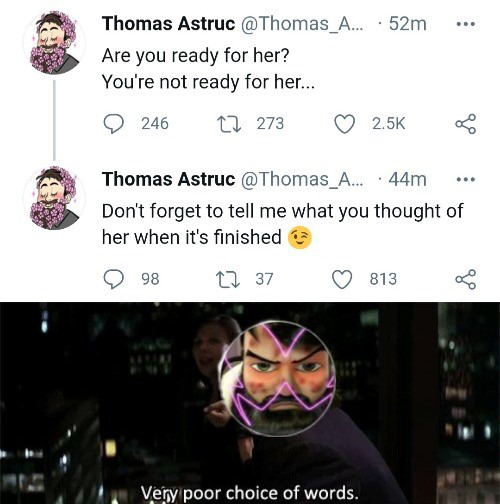
Well... It's finally here... the episode introducing the new bee hero. And what do you know? It looks like I was right about how the new character would be portrayed.
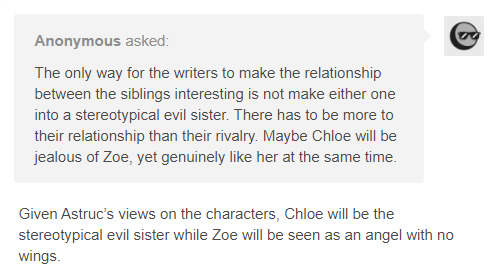
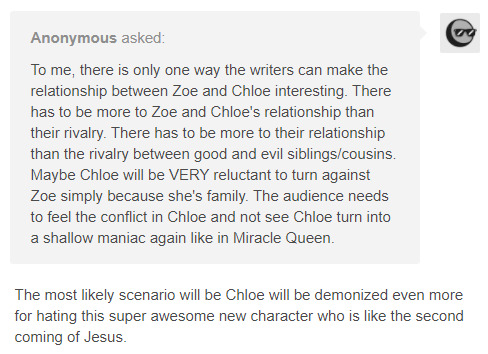
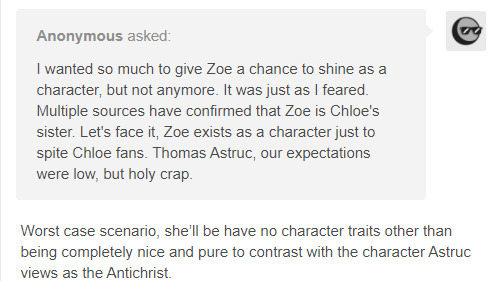
It's kind of funny how I made predictions exaggerating what could happen, and they were surprisingly accurate. Isn't that funny?
youtube
Let's just get into the seventh (chronologically the seventh and the seventh episode in the season to air after “Mr. Pigeon 72”) episode of Miraculous Ladybug's fourth season: Sole Crusher. Damn, I hate that a pun this clever was used for the title.
We get to the point pretty quickly with the first scene being Zoe arriving in Paris and getting a tour of the city. She asks to stop at the Dupain-Cheng bakery, where she meets Marinette through some brief Unfunny Marinette Slapstick. The two quickly strike up a conversation.
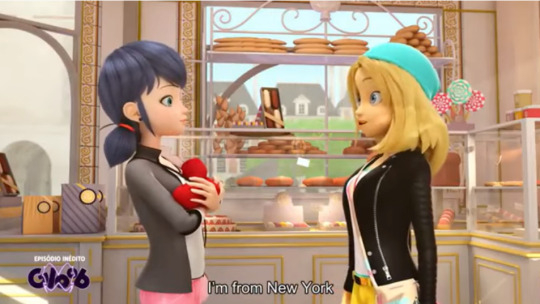
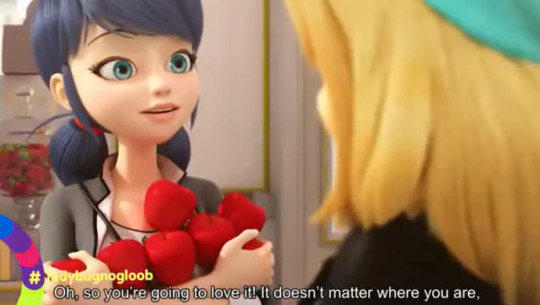
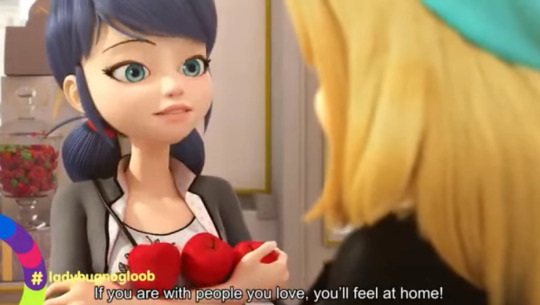
I mean, it's not like Zoe is the sister of the absolute worst human being in existence, right?
Marinette compliments Zoe's shoes, and she points out that she designed them herself, and wrote every good thing anyone has ever said to her on them. But because she only has one friend, there's only a standard “I <3 U” on the left shoe.
So Zoe leaves the bakery and heads to Le Grand Paris where she meets her mother, Audrey. Unlike how she talked with Marinette, Zoe pretends to be just as snobby as Audrey in order to fit in. She then meets up with Chloe, who criticizes her for having poor person things like a phone without any diamonds embedded in it. And then she sees Zoe's shoes.
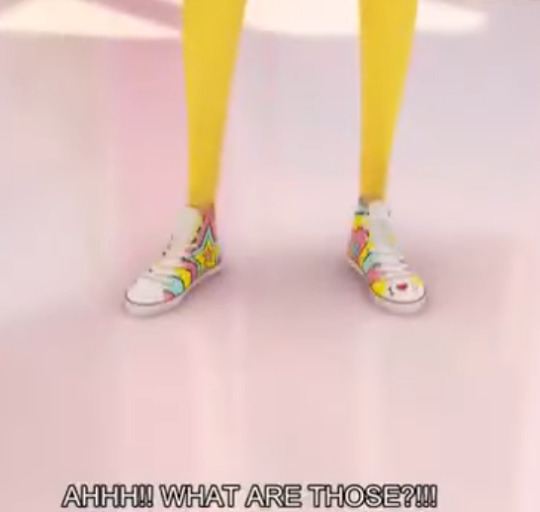
Look, that meme was already dated when it was referenced in Black Panther three years ago. Please don't try to reference memes in 2021, Miraculous Ladybug.
Chloe offers some golden heels while saying that those kind of shoes are for winners to wear and crush the losers underneath. This is the only episode to mention this kind of ideology, and believe me, it gets worse when Chloe decides to teach Zoe how to be like her.
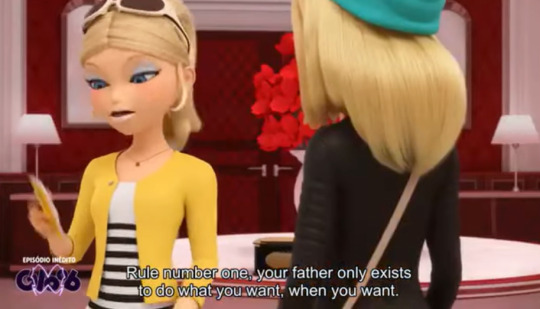
youtube
Get used to this. This episode is all about demolishing any semblance of likability in Chloe's character. Now that Astruc doesn't have to bother with writing Chloe with decency since she's not Queen Bee, watch as he turns her into an absolute caricature of her former self.
Yes, Chloe has ordered her father to give her a lot of frivolous things in the past, but she has been shown to care about him, like immediately rushing to hug him after she was safe in “Origins” and showing concern for when he was akumatized into Malediktator while apologizing for causing it. For the love of God, one of the first things she did when she allied with Hawkmoth at the end of Season 3 was to have him unto her parents' akumatization. I guess she only cared about her rich parents for their status and not because she actually loved them right?
Next up on the list of Chloe's positive qualities to ruin is her friendship with Sabrina.
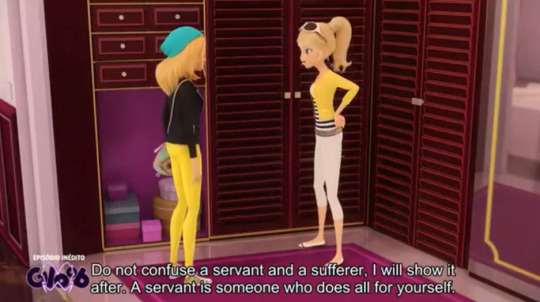
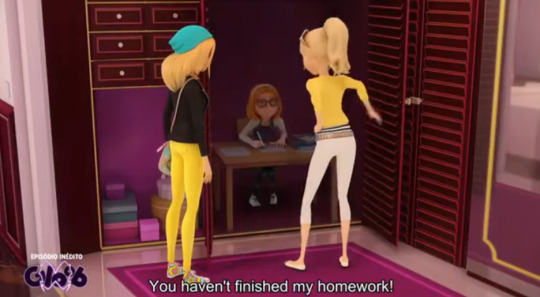
🎶It's seven o'clock in the morning🎶 🎶I can't believe they made this scene🎶 🎶With the writing Astruc's enforcing🎶 🎶It's like he's trying to piss off me🎶
Yep, Chloe doesn't view Sabrina in a twisted view of friendship anymore. Now she's a slave. I'm not exaggerating by the way, he actually said that in a tweet.
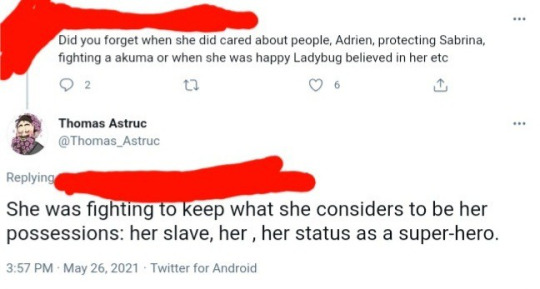
THIS IS WHAT THOMAS ASTRUC ACTUALLY BELIEVES
Okay, so I guess all those times we saw Chloe playing superheroes with Sabrina in “Antibug” and “Miraculer” were just a slave driver playing with their property. Actually apologizing to Sabrina for getting her akumatized in those episodes? Protecting her from the Scarlet Akumas in “Ladybug”? She was just interested in keeping her slave around. I think Astruc may have slept through the slavery unit in his history class. Yes, Sabrina was mostly used as a joke to show how controlling Chloe could be, but there were still semblances of an actual friendship between the two.
Chloe arrives at school and introduces Zoe as her half-sister, despite being the same age and having the same mother. Because I guess we can add basic biology to the list of things the writers don't understand. Now that we're at school, Chloe's friendship with Adrien is next up on the chopping block.
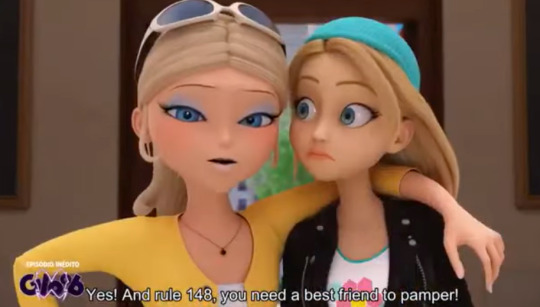
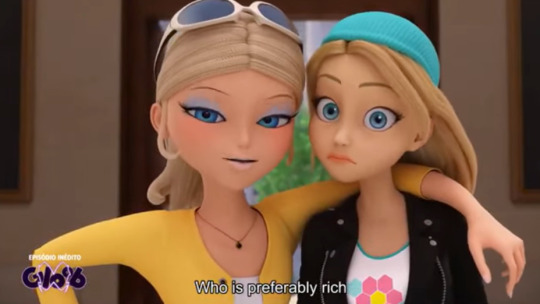
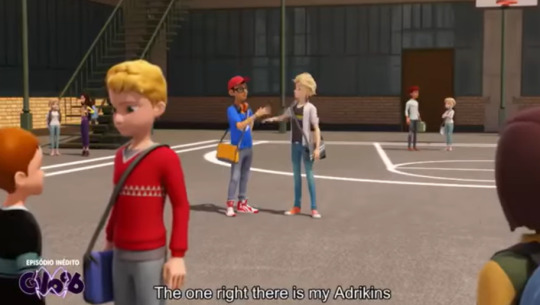
Yep, despite being Adrien's only friend and making a big deal about valuing his friendship to the point where she threw a big party just to make sure he wouldn't leave her and risked cooperating with an Akuma to save him, now Chloe just sees Adrien as a rich meal ticket. Two of the earliest episodes to show Chloe had a more compassionate side to her, and they just undid them. Even as much as I hated the episode, “Felix” showed Chloe was willing to cooperate with Marinette and her friends just to find a way to cheer Adrien up on the anniversary of his mother's not-death.
For the love of God, Astruc, 1984 was supposed to warn people about what could happen if they rewrote the past, not encourage people to rewrite the past. He probably finished Animal Farm thinking Snowball really did work alongside the humans, didn't he?
Marinette comes up and Zoe pretends to hate her, leading Marinette to wonder why she did that. She texts Zoe (she gave her number to her earlier) and invites her to a concert on the Liberty, but Chloe finds out. Zoe thinks fast and pretends it's just so she can torment her more. Chloe then takes out a book listing all the ways she can torture Marinette. I wonder if this is a metaphor for the writing process behind most of the episodes last season.
Zoe decides to go outside for some fresh air, and Andre comforts her. Funny how Andre bends over backwards to give Chloe whatever she wants, yet he's willing to actually talk to Zoe like an actual parent. Andre tries to cheer Zoe up, but she talks about her past where she had to put on an act so she would be liked, but (bet you've never heard this before) she just wants to be accepted for who she truly is. The surge of emotions is enough for Shadowmoth to akumatize her into Sole Crusher.
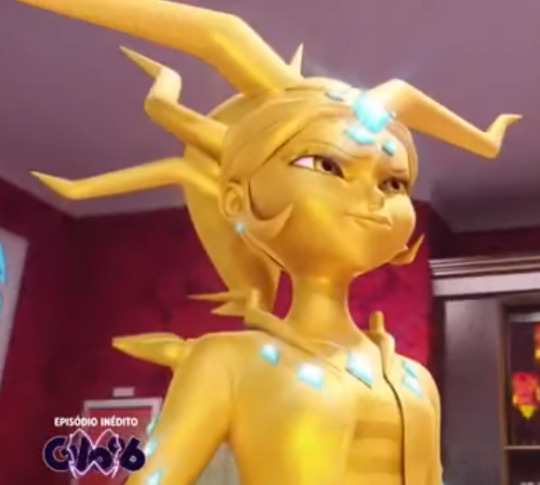
In addition to having one of the most clever puns for an Akuma name, I actually like Sole Crusher's design. Not only is it a good excuse to reuse Chloe's character design, it makes sense thematically, as Chloe was trying to mold Zoe into a copy of herself. The gold and diamonds also make sense given Chloe's love for shiny things. Her powers tie into the bizarre belief Chloe has about stepping on the winners. Whenever Sole Crusher kicks or steps on someone, she absorbs them and gets progressively bigger, making it easier to do so. While it's not cracking my top ten anytime soon, it's still an interesting character design.
Sole Crusher heads to the hotel to get Chloe, and she manages to get away pretty quickly. Maybe in an alternate universe, she's a track star? For some reason, she runs to the Dupain-Cheng bakery and then... Oh my God... pushes Marinette's parents so they get absorbed by Sole Crusher, before trying to do the same with Marinette.
youtube
When has Chloe ever done something like that? Whenever she endangered someone during an Akuma attack, it was unintentional or a result of her naivety. She was only trapped in Pixelator's dimension because Adrien tried diving to save her, she only alerted Rogercop to Ladybug's presence because she eagerly called out for her, and during “Zombizou” she only tried to throw Sabrina towards the horde of kissing zombies once, and that was meant to highlight her growth. The only person to actually do stuff like this consistently is Lila, but I guess she got vaporized by Big Brother offscreen.
This episode is determined to make the audience hate Chloe by retconning everything about her character while portraying her as a complete monster. As bad as Chloe could get, she was never selfish enough to use anyone as a human shield. This kind of behavior honestly could be explained by saying Chloe was lashing out as a result of losing the Bee Miraculous permanently, but the events of the Season 3 finale aren't mentioned ONCE, not even in the next episode that introduces Queen Bee's replacement! How the hell can you set up the next Bee hero without explaining why the original needs to be replaced in the first place?! And trust me, I'm going to talk about Zoe replacing Chloe later.
Sole Crusher grabs Marinette in her hand, so the Horse Kwami, Kaalki, uses her power to teleport over to Adrien's house and inform him Ladybug needs help, meaning once again Adrien did nothing in this episode before becoming Cat Noir.
At the Liberty, Chloe offers more victims to Sole Crusher in the form of the band Kitty Section (consisting of Luka, Juleka, Rose, Ivan, and Mylene) and theatens the giant golden supervillain she can send her back to Paris, even though she's really not in a position to bargain right now. And she STILL continues to insult her. Do you hate Chloe yet? Come on, do you? The writers won't stop until you do.
After we see Sole Crusher's conflicted emotions, Marinette is set free by Cat Noir and transforms into Ladybug, immediately summoning her Lucky Charm, a shoehorn. They only learn Zoe's sneakers were where she were akumatized thanks to Chloe's ranting, so the episode unintentionally made Chloe save the day. Ladybug breaks into Le Grand Paris and breaks the sneakers where Zoe hid them, using the shoehorn to open a door. So Sole Crusher is de-evilized, Ladybug fixes the damage, and gives yet another charm to Zoe.
Afterwards, Zoe goes to the Liberty, apologizes for the act she put on, all while divulging to the audience her “tragic backstory”.
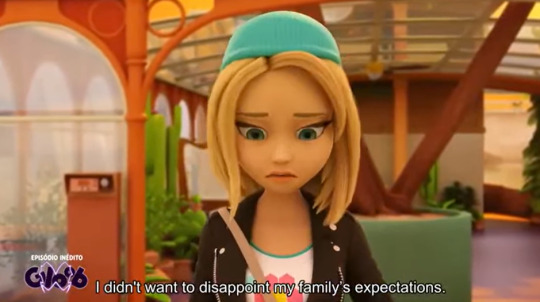
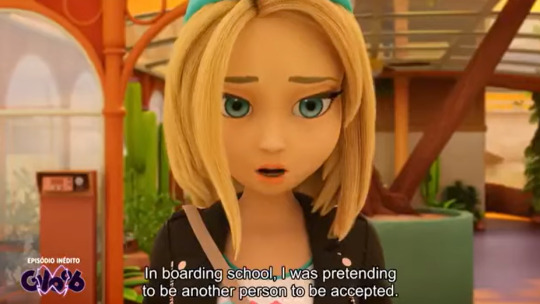
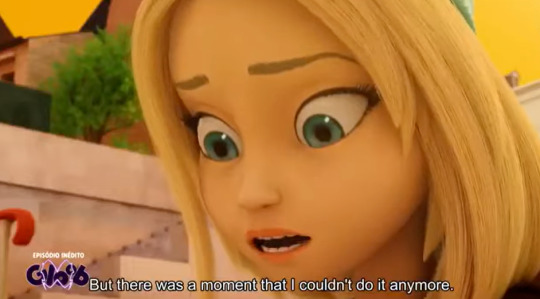
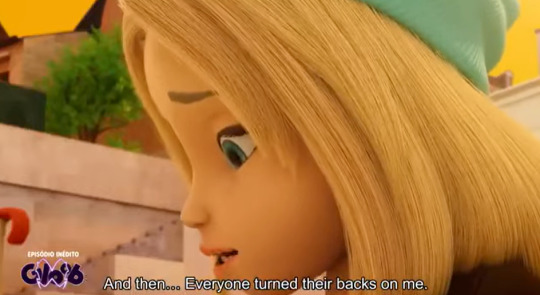
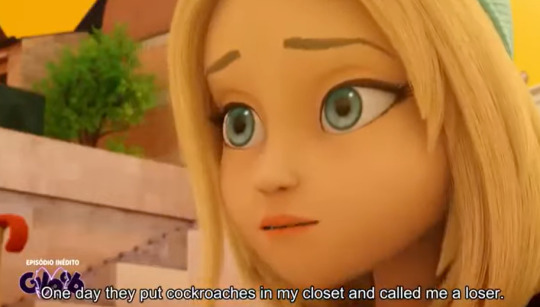
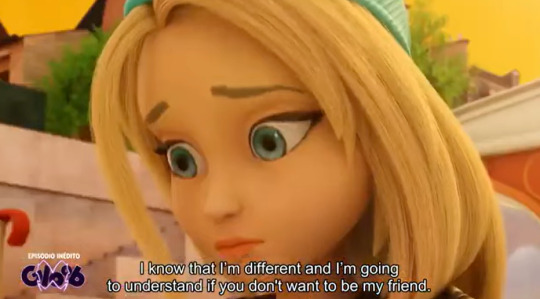
Of course, everyone welcomes her with open arms.
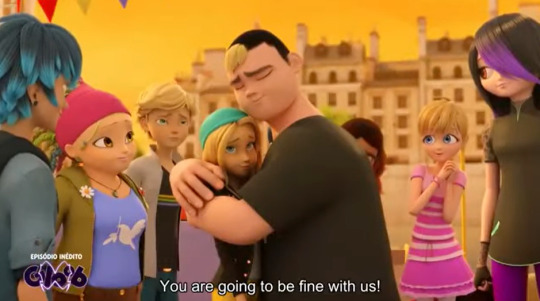
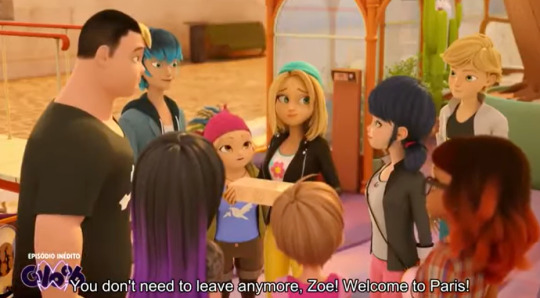
And right here is where the biggest problem I have with Zoe as a character. I normally hesitate to use this term given how often it gets thrown around when criticizing characters these days, but I really can't say anything else.
Zoe... is a Mary Sue.
For those who don't know, the term Mary Sue originated in a Star Trek fanfiction from 1973 satirizing several self-insert stories at the time. Most of these stories showed a beautiful young woman joining the crew of the Enterprise and immediately gaining the attention of the crew. Mary Sue parodied this character archetype by showing how much she was appreciated by Captain Kirk and Mr. Spock, the latter being driven to tears at her funeral despite his species being emotionless normally.
What does this have to do with Zoe? She has the exact same storyline as Mary Sue in the parody fanfiction. Her mere presence is enough to make Chloe act extremely out of character in an attempt to make her look better, and as soon as she apologizes while giving a frankly vague backstory, everyone just accepts her as their friend, and I mean everyone in the entire class. I'm sorry, but it just doesn't feel earned. Why was she bullied at her old school? What did her bullies have against her? What caused her to stop going along with her peers, and why did everyone turn against her? How the hell did the bullies who put cockroaches in another student's locker get no punishment while the victim was forced to transfer schools? It's an intentionally unclear backstory designed to make the audience feel sympathetic towards Zoe without actually doing anything else.
I want to ask anyone reading this who watched the episode a question: Outside of her backstory, what do we actually know about Zoe?
What is her personality like? She's nice? Socially awkward? We've never had a character like that in Miraculous Ladybug before! Sorry Marinette, Adrien, Juleka, Nathaniel, Mylene, and Marc, there's a new character with more personality than all of you combined!
What are her goals? She wants to be an actress? Great, but why? Even though there's no clear answer for why Marinette loves fashion, or why Alya loves journalism, or why Nino loves DJing, you can still see the passion in their lives when they do something related to their goals. Zoe only says she wants to be an actress, connecting it to her people pleaser backstory (and given how it ended, she must be a terrible actress), and in the next episode, she immediately gets the lead role in a student film.
When Mylene got the starring role in the movie in “Horrificator”, we at least got snippets of her acting skills in the same episode that established her desire to be an actress, which is also implied to be because she was inspired by her father in “The Mime”. She didn't just say she wanted to be an actress and got the leading role. She still had problems to overcome like her cowardice, which threw her own self-confidence into doubt. Here, Zoe just says she wants to be an actress, and is rewarded for no reason the very next episode.
Zoe basically exists only to be a foil to Chloe, and the writers had no idea what to do in terms of a personality, so they just dumped a bunch of extremely likable character traits onto her without thinking of how her character could come off. And like I said, she's a Mary Sue.
I'm not the only one who thinks this. I've seen a handful of posts on this very site calling Zoe a Mary Sue. In fact, I even asked another Tumblr user @anxresi to quote their take on Zoe being a Mary Sue, which I couldn't even top in terms of accuracy. They basically listed off five things that made Zoe a Mary Sue.
She has to have a ‘tragic backstory’ so all the other characters will fall in love with her. Usually within minutes, in the very first episode they’re introduced.
She has to have a supercute design so that the audience at home will fall in love with her. And if they don’t, they’re automatically dismissed as ‘haterz’ even if their objections are purely from a writing POV.
Her only flaw will be thinking too little of herself. “What, lil ol’ me as the Bee Miraculous holder? With my shyness, colorful shoes, chic beret and personalized pink strip in my hair? Gosh, who’d have thought it?”
The contrast to her half-sister will be a constant plot point, with Chloe always getting dumped on. “You see, kids? Bad things happen to bad people. But you see this super-sweet girl over here? She gets a free DAD. Instant FRIENDS. To star in her own MOVIE. The chance to be a SUPERHERO, even though she only arrived last week. Who cares if she has no depth, no personality and barely any reason for being in the show, apart from being a massive ‘Up Yours’ to all the Chloe fans out there?”
What about character development, Mr Generic Zag Guy? “Development? What’s that?! Zoe is already perfect as she is. The only ‘development’ she’ll receive is having her hair done in the first episode she’s introduced. Besides, That‘d’ word is banned here at Zag studios. Why do you think we abandoned Chloe’s stillborn arc so quickly? This is a KIDS show, why bother trying to create a complex character with more than one dimension?”
This is essentially who Zoe is. She's perfect, has no character flaws, has a cute design so the audience will love her already, and was designed only to replace Chloe as Queen Bee. That's all she is.
So the episode ends with Zoe feeling happy at all the new friends she made while we get one of the most blatant attempts of symbolism in the ending card I've ever seen.
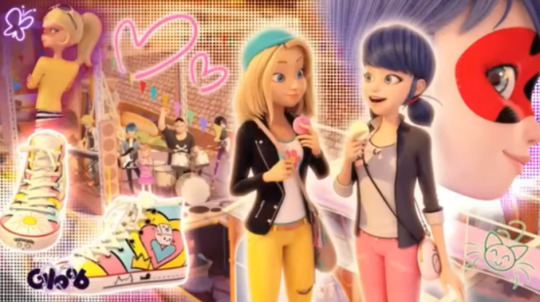
See, look. While Marinette is happily talking with Zoe with the image of Ladybug next to them, Chloe is to the far left with an EVIL purple aura, showing how bad she is compared to how great Zoe is. Only a braindead moron would actually like Chloe over the super awesome and pretty Zoe!
I'll give my final thoughts on the episode in the next part where I analyze this plotline as a whole.
LINK TO “QUEEN BANANA” REVIEW
#immaturity of thomas astruc#iota#thomas astruc#thomas astruc salt#miraculous ladybug#miraculous ladybug salt#marinette dupain cheng#ladybug#adrien agreste#cat noir#chat noir#chloe bourgeois#queen bee#queen b#zoe lee#vesperia#sabrina raincomprix#andre bourgeois
289 notes
·
View notes
Text
spike, angel, buffy & romanticism: part 3
part 1: “When you kiss me I want to die”: Angel and the high school seasons
part 2: “Love isn’t brains, children”: Enter Spike as the id
*
“Something effulgent”: Season five and the construction of Spike the romantic
Prior to becoming a romantic interest, Spike is everything I discussed in the last section. He is an id and a mirror for Buffy, he’s prone to both romantic exaggeration and cutting realism, and his liminality suggests ambiguity. But outside of “Lovers Walk”, the writing doesn’t actually delve too deeply into Spike’s nature as a romantic. If you stopped the canon at “Restless”, you’d probably think that Spike’s love for Drusilla was intriguing, but that the show hadn’t really gone anywhere with the implications of it, and for all you knew, that might not be an important part of his character anymore. So one of the most interesting things about season five to me, is that in this season in which the writers first consciously, deliberately decide to explore the sexual and romantic tension between Spike and Buffy, they also emphasize Spike’s romanticism more than ever. The choice to define Spike by his romanticism is a choice that follows naturally from everything established about his character, but it was also not an inevitable choice. Therefore, it’s a choice worth looking at in some detail.
Consider everything that “Fool For Love” establishes about Spike, especially the things that contradict what was supposedly canon at the time. It makes Drusilla his sire instead of Angel, meaning that he is sired by a romantic connection, and as a direct result of heartbreak. It makes him a poet living in the middle of the Victorian era, an age at odds with his previous ages of “barely 200” and “126”. Meaning that the writing specifically decides to ignore its canon in order to associate him with an era in which passions would have been repressed (rather than the Romantic era of the early 1800’s or the modern energy of the early 1900’s). Moreover, the episode reveals his entire aesthetic and personality to essentially be a construct. But most tellingly of all, it reveals him to be an idealist. Spike is not just a performance artist; he yearns for the “effulgent”, for something “glowing and glistening” that the “vulgarians” of the world don’t understand. In other words, he yearns for something bigger and more beautiful than life: something romantic. Later, he chases after “death, glory, and sod all else.” Spike may be a “fool for love”, who has a romantic view of romantic love specifically, but the episode is very clear about the fact that he is also a romantic more generally. When Drusilla turns him, she doesn’t tempt him by telling him she’ll love him forever. She tempts him by offering him “something…effulgent”. (Which, in typical Spike form, the episode immediately undercuts by having him say “ow” instead of swooning romantically). The fact that “Fool For Love”, Spike’s major backstory episode, is so determined to paint him as a romantic--and in particular, a disappointed, frustrated romantic--that it is willing to contradict canon to do so, tells you that this choice was important for framing Spike and his new, ongoing thematic role.
I’ve talked in the past about how season five is all about the tension between the mythical and the mortal--between big, grand, sweeping narratives, and the reality of being human. Buffy is the Slayer, but she’s also just a girl who loses her mother. Dawn is the key, but she’s also just a confused and hormonal fourteen-year-old. Willow is a powerful witch, but she also just wants her girlfriend to be okay. Glory is a god, but she’s also a human man named Ben, and finds herself increasingly weakened by his emotions. And Spike embodies this tension perfectly. He’s a soulless vampire with a lifetime of bloodshed behind him, but he’s also this silly, human man who wants to love and be loved. He wants big, grand things, but every time they are frustrated by a Victorian society, a rejection, a chip, a pratfall, or dying with an “ow”. Furthermore, his season five storyline is all about the tension between loving in an exalted, yet often selfish way, versus loving in a “real” or selfless way.
There was a fascinating piece a ways back that discussed how Spike’s attempts to woo Buffy in season five almost perfectly match the romantic narratives of Courtly Love. In the words of the author:
The term "Courtly Love" is used to describe a certain kind of relationship common in romantic medieval literature. The Knight/Lover finds himself desperately and piteously enamored of a divinely beautiful but unobtainable woman. After a period of distressed introspection, he offers himself as her faithful servant and goes forth to perform brave deeds in her honor. His desire to impress her and to be found worthy of her gradually transforms and ennobles him; his sufferings -- inner turmoil, doubts as to the lady's care of him, as well as physical travails -- ultimately lends him wisdom, patience, and virtue and his acts themselves worldly renown.
You can see for yourself how well that description fits Spike’s arc. He fixates on the torturous, abject nature of his love, and has it in his head that he can perform deeds and demonstrate virtue, and this will prove to Buffy that he is worthy of her. But despite Spike’s gradual ennobling over the course of the season, I think it would be a mistake to see the season as using the Courtly Love narrative uncritically, or even just ironically. The same way it would be a mistake to see season two as using the Gothic uncritically. Spike is as much Don Quixote as he is Lancelot. He is a character that deliberately tries to act out romantic tropes, giving the writing an opportunity to satirize those tropes, including the tropes of chivalric romance. In particular, the writing criticizes Spike’s (very chivalric) fixation on love as a personal agony, something that is more about pain--and specifically, his pain--than building a real relationship. Over and over in season five, he is forced to abandon these sorts of flattering romantic mindsets in favor of a more complicated reality.
So at first, Spike’s “deeds” tend to be shallow and vaguely transactional. He tries to help Buffy in “Checkpoint” even though she doesn’t want it (and insults her when she doesn’t appreciate it), he asks “what the hell does it take?” when Buffy is unimpressed by him not feeding on “bleeding disaster victims” in “Triangle”, he rants bitterly at a mannequin when Buffy fails to be grateful to him for taking her to Riley in “Into the Woods”, and he is angry and confused when Buffy is unmoved by his offer to stake Drusilla in “Crush”. While these attempts to symbolically reject his evilness are startling for a soulless vampire, and although Spike certainly feels like he is fundamentally altering himself for Buffy’s sake, none of it is based on understanding or supporting Buffy in a way that she would actually find substantial. Moreover, he lashes out when his gestures fail to win her attention or affection. He has an idea in his head of how their romantic scenes should play out, and reacts petulantly when reality fails to live up to it.
But these incidents of self-interested narrativizing are also continuously contrasted with scenes in which Spike reacts with real generosity, or is surprised when he realizes he’s touched something emotionally genuine. When Buffy seeks him out in “Checkpoint”, his mannerisms instantly change when he realizes she actually needs real help (“You’re the only one strong enough to protect them”), rather than the performed help he offered at the beginning of the episode. At the end of “Fool For Love” he’s struck dumb by Buffy’s grief, and his antagonistic posturing all evening melts away. He abandons his romantic vision of their erotic, life-and-death rivalry in favor of real, awkward emotional intimacy. In “Forever” he tries to anonymously leave flowers for Joyce, and reacts angrily when he’s denied—but this time not because he wanted something from Buffy. Simply because he wanted to do something meaningful.
This contradictory behavior comes to a head in “Intervention”, the episode in which Spike finally begins to understand the difference between real and transactional generosity. Up until that point, Spike has been reacting both selfishly and unselfishly, but he hasn’t been able to truly distinguish between them, which is why he keeps repeating the same mistakes. Although he touches something real at the end of “Fool For Love”, for instance, he goes on to rifle through Buffy’s intimates in the very next episode. And so “Intervention” has Spike go to extremes of fakeness and reality. He gives up on having the real Buffy, and seeks out an artificial substitute that lets him live out his cheesiest romance novel scripts. It’s important that the Buffybot isn’t just a sexbot, even if he does have sex with her. She’s a bot he plays out romantic scenarios with the way he played them with Harmony in “Crush”, allowing him to almost literally live within a fiction. But then he “gives up” on having Buffy in a way that’s actually real, by offering up his life. He lets himself be tortured, and potentially killed, for no other reason than that to do otherwise would cause Buffy pain. The focus is on her pain, not his. For the first time, he acts like the Knight he’s been trying to be all along. He performs a grand, heroic deed that causes the object of his affection to see him in a different light, and even grant him a kiss. Yet ironically, as part of learning the difference between real and fake, he ceases to press for Buffy’s reciprocation. Through the end of season five, Spike continues to act the selfless Knight, assisting Buffy in her heroism without asking for anything in return. Which culminates in his declaration that he knows Buffy “will never love him”, even after he’s promised her the deed of protecting Dawn, and even though she allows a kind of intimacy by letting him back in her house. He proves that he sees those gestures for what they are, rather than in a transactional light. The irony of the way Spike fulfills the narrative of chivalric romance, is that his ennobling involves letting aspects of that narrative go.
In a Courtly Love narrative, the object of the Knight’s affection is fundamentally pedestalized. The Knight himself might be flawed, but the woman he pines after is not. She is “divinely beautiful” and “unobtainable”, something above him and almost more than human. This is why it’s so comic that in Don Quixote, which was a direct satire of chivalric romance, Alonso Quixano’s “lady love” is a vulgar peasant farmgirl who has no idea who he is. (Think of the way Spike asks if Buffy is tough in “School Hard” or threatens to “take her apart” despite “how brilliant she is” in “The Initiative”, followed by scenes where Buffy is acting like the teenage girl she is. Or how Giles in “Checkpoint” says that Buffy has “acquired a remarkable focus” before cutting to Buffy yawning.). Although it’s true that Buffy is beautiful, and supernatural, and profoundly moral, she is also very human, and the writing is very concerned with that humanity. Season five in particular, as I’ve mentioned, is preoccupied with the duality of Buffy’s mythic and mortal nature. Thus it becomes significant that Buffy is assigned such a heightened role in Spike’s chivalric narrative. Just Spike is at once Lancelot and Don Quixote, Buffy is at once Achilles, Dulcinea, and a coming-of-age protagonist.
And part of the “lesson” of Spike’s arc is for him to see both sides of the roles they embody. One of my favorite things about the scene in Buffy’s house in “The Gift” is how adroitly it conveys the dualities of both Buffy and Spike with simple, but poetic imagery and language. Buffy stands above Spike on her steps, conveying her elevated role, and Spike honors the way her heroic status has inspired him by physically looking up to her as he explains that he expects nothing from her. But by expecting nothing from her, and promising to protect her sister, he also honors the fact that she is a real person with no obligation to him, and a younger sister she cares about more than anything. He also honors his own duality by at once making Knightly promises, and acknowledging that he sees through his former delusions: “I know that I’m a monster, but you treat me like a man.” In “Fool For Love” he tried to acknowledge the same duality of realism and romance, by declaring to Cecily that “I know I’m a bad poet, but I’m a good man.” But at the time, he was an innocent, whose desire to be seen, and whose romantic avoidance of “dark, ugly things”, left him unprepared to understand how Cecily really saw him (similar to Spike’s insistence in “Crush” that what he and Buffy have “isn’t pretty, but it’s real” just before Buffy locks him out). Spike is a character defined simultaneously by continuous disillusionment and dogged aspiration, which is why he makes perfect sense as a character to embody a season torn between the pain of being human, and the wonder of the gift of love.
Fittingly, the season ends with Spike’s most devastating loss of innocence of all. He fails to be the hero for Buffy or Dawn (note that Knightly language he uses on the tower: “I made a promise to a lady”), and he loses the woman he loves. He may have become more virtuous, but unlike in a chivalric romance, that virtue wins him neither Buffy, nor something flattering like “world reknown.” The climax of the “The Gift” is full of romance—a god, a troll hammer, a damsel on a tower, a heroic self-sacrifice, a vampire transformed into a Knight—but the end result is that Buffy is dead, in part because he wasn’t good enough, and all that he and the Scoobies can do is grieve. Stories got Spike nothing, even when reality finally lived up to them. It is a swan song to the myths of childhood, and on the other side of Glory’s portal, Spike and the other characters will have to confront a world where those myths have been left behind.
part 4: “But I can’t fool myself. Or Spike, for some reason.”: Buffy and Spike as a blended self
#romanticism series#s5#gen#buffy#spike#this section is deliberately focused on spike's arc#but not to worry#the next one focuses on buffy's side of things and the role of spike's arc in supporting buffy's in the last three seasons#they just needed their own sections to breathe#btvs
197 notes
·
View notes
Text
Keiji and Sara’s relationship throughout yttd
In which I analyze the found family dynamic between Sara and Keiji then nobody reads it. But jokes aside, I realized back when that anon asked me for my thoughts on Sara that I had enough thoughts on the relationship between these two alone for its own meta so here goes. What Sara and Keiji’s relationship means in the grand scheme of yttd.
ALSO THIS IS NOT SHIPPING SHIPPERS GET THE FUCK AWAY
Sara when she meets Keiji is distrustful of him. And how can she not be? The guy has some creepy bags under his eyes, doesn’t seem to care about the situation, and for no reason is gravitating towards her. And his response when she asks why the hell he keeps putting a random stranger in charge? “Because you’re cute.” Yeah. I’d stay within 50 feet of this guy too Sara. Especially when he’s not spilling a word about himself.
Alright we might as well get the gross part out of the way. To clear things up. In the Japanese version, the word he uses “Kawai” can be seen as a more fatherly word to use with a kid. But the comments about going on dates from himself and from Shin? Those are still there. And I still think they’re really uncomfortable and wish they weren’t in the game period but we can get thematic significance out of them.
We still don’t know Keijis reasons in game for being attached to Sara. My theory? She’s his handicap. He was told to get close to the higher scorer who could easily backstab him, and he’d be stuck with her. It just kinda makes sense to me. But since that’s just a theory I won’t lean to heavily on it for support. But let’s talk about his comments.
Keiji… well, it’s shown at many points in the game that Keiji just thinks of himself as doomed to be a bad person. It can be seen during his day two negotiations when he calls himself a killer and explains he can’t even trust himself so Sara shouldn’t really bother and more explicitly so is the classroom scene between him and Ranmaru where he says he isn’t fit to protect Sara because of his sins. The flirting is both a way to distract people, and to put distance between himself and Sara. He’s not really “protecting” her.
Okay gross bit nobody wants to talk about is over I promise we won’t talk about it again. Let’s talk about Russian Roulette. In this scene, Keiji once again tries to make Sara the leader with no explanation, but then, Sara yells at him, something he didn’t expect. And through this he actually reveals something huge. The source of his trauma. His shooting. For Keiji to have actually revealed something that big, I think that this is the first moment he began to see Sara past whatever reason he first started making her a leader. This is the beginning of their bond.
This bond gets solidified over chapter 1-2s investigation. Keiji is still putting her in charge because his handicap said to build her up for whatever reason, but they’re able to have chats, and she keeps picking at his armor. He reveals his dark sense of humor to her, and she, suspicious just sort of keeps him at arms length. Also she rides his shoulders to screw in a light and he complains which is funny. The scene post Nao also helps the two of them sharpen investigative skills together, as they discuss the mystery of Miley, and Mishimas head.
Then another significant scene. The white room. I call this scene significant because, instead of letting Sara investigate the gruesome scene of the first trial, Keiji for the first time, allows Sara to walk out. Something that will become relevant later but until then, Keiji has begun to put Sara’s well-being above serving whatever purpose he had by building her up. So keep that in your pocket while we go over the main game.
There’s only two points for the main game I want to cover. While Keiji and Sara do put their heads together a few times, Sara still doesn’t fully trust him, so I will only go over 1. When Shin brings up Kai’s emails. Keiji has been fully logical this whole time, questioning everyone’s alibis including Nao’s who he saw the emotional plea from, but when Sou brings up potentially damning evidence of Sara, he just asks if he read the emails wrong. 2. When Sara is panicking over being chosen for the final round, Keiji loudly shouts “GET A GRIP SARA!” With a serious expression. Before quickly backtracking and going back to a devil may care expression. This shows he is both already emotionally attached to Sara, but unwilling to stake himself towards giving himself to a new cause.
Anyways, he stops her from pressing the button blah blah blah, onto chapter 2! I’ve made a post about this before but it seems as early as here, Keiji is trying to talk Sara down from pushing herself further. But at this point, Sara has already dedicated herself to the role because her best friend died due to her priority to protect everyone. Keiji sees the problem and he tries to get her to rest up, but he still doesn’t spend the time to have a serious talk about it because as he says in the classroom. He isn’t fit to protect her. He doesn’t think of himself as a good person who can help her. He thinks of himself as a murderer and he doesn’t allow himself to recover from the trauma.
Sara however is starting to rely more on Keiji. He’s been willing to comfort her in her times of grief and furthermore, she has something to relate to him on. They both have deaths of important people in their lives they feel responsibility for.
There’s also the fact that Keiji sees a lot of his old self in Sara. An idealistic person, being beaten down, and worrying over the idea they might be becoming a bad person. He feels the same as her.
Not to mention… Keiji follows through on his promises. He actually tells Sara about the person he respected like he said he would which establishes a further sense of trust.
However, something that tears that sense of trust apart is the tokens scene. When Keiji doesn’t even let Sara hold 50 tokens, it raises suspicion. Sara already knows he shot a person- what more could he have to hide? That scares her away. The negotiation event is an attempt for Keiji to win back her trust. But it slowly turns into Keiji’s self-loathing session. And his declaration maybe Sara shouldn’t trust him.
However, time passes enough (and Keiji supports Sara enough in the final attraction) for them to get together and investigate in 2-2. And there’s a lot of moments I can talk about there so I’ll be just doing a few rapidfire things. So first, Sara is in peak weird girl mode and Keiji can hardly control her chaos. Second, Keiji makes a full on decision at one point to go against Sara when she’s putting herself in danger of getting caught for their search so they can hide. Third, his response to “I don’t intend to die” when he asks “will you die with me” is that’s a good answer.
And fourth… a moment I really wanna touch on… Keiji watches something that could easily incriminate Sara. It’s not just some word of mouth thing like with Shin who lied about things several times before this point. But in that moment, he still relies on Sara and says he wouldn’t feel bad betting his life on her. The message is clear. Keiji supports Sara unconditionally.
Now let’s talk about Keiji totally dropping Sara’s ass with the card trades.
The way Keiji makes his trades is very telling. He first, steals a keymaster card from either Sou or Kanna to give to Sara. This is supporting Sara, but it’s doing it in a way that supports his view of himself. That he’s a scumbag who would steal someone’s immunity just to give it to someone he likes more. And would a shithead like that be “worthy” of sacrificing themselves and taking the card for Sara? (And he knew she had it. Qtaro had to tell him for their plan to happen) no. Instead he essentially opts for a revenge plot. A plan to ensnare Shin and kill him for pawning off the sacrifice to Sara. Basically, he wanted to fuck up Shin like how he fucked up Megumi. Nice going Keiji. This is… kind of his low point in the story.
But 3-1….. man this chapter hits in all the right ways. I don’t remember 3A that much, (although I do know that Keiji shows a lot of concern over Sara potentially being triggered by Joe memorabilia) and also if you fail the Keiji Midori fight you can have Sara attempt to tag Keiji and he rejects. And how can we forget… the mr policeman flashback. As Sara says, this is Keiji’s first time opening up on his own.
And then… coffin saga. Sara through everything is not willing to let Keiji die. Although she’s had her ups and downs with him, leaving him to die is inconceivable to her with everything they’ve been through together. So she opts to sign the contract both times she is offered it.
Keiji clearly is somebody important to Sara. Important enough that Ranmaru bringing him up is enough to snap her out of her murderous trance. Enough that she throws logic out the window when she has a sign he’s okay.
Likewise, the scene in the classroom for Keiji is… a huge step. When he’s alone with Ranmaru, who is unstable, in that classroom, his priority is Sara. He turns his back to the threat to hold Sara and try and make sure she’s okay- dumb move, but it shows how far he’s come.
And again, I want to reiterate- Keiji is Sara’s anchor. At the banquet when Sara is about to give up, she imagines Keiji talking to her which brings her back in the game. Much like Joe did back in chapter 2. The message is palpable. Keiji is Sara’s new Joe. And when Keiji comes back to comfort her? He’s now fully willing to sacrifice himself. It winds up not being needed seeing as Qtaro is the one that died. But in that moment, we see Keiji has made a huge leap from chapter 2. He almost sacrificed himself for Gin. And he would’ve used his final moments to comfort Sara. He’s embraced that he’s a father figure. He allows himself to be a good person.
Anyways I don’t know how to conclude this and I’ve been writing for hours. Bababooey.
96 notes
·
View notes
Text
Ranking MCU Captain America figures
Before I begin, I want to clarify this is about my enjoyment of these characters and NOT who i think are the best morality or power wise. I specify because I think my first two entries will upset some people and I want to say, this list is NOT in order of how much I agree with these characters' values. I have a heavy favoritism towards theme and character interaction and that is where a lot of my enjoyment from media comes from. So, let's begin.
6. Captain America: CW, IW, and Endgame
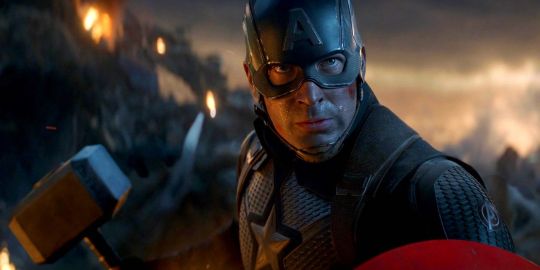
I'm separating Steve into two because around CW he starts making decisions that really frustrate me.
Now I do think there is a lot to like still! His conviction to his morals during the Accords and continuing arc about government distrust is great, his stand against Thanos in IW is amazing, he is a lot of fun to watch during the New York part of the time heist, and lifting Mjolnir was legit my best theater moment ever and i will NEVER forget it.
However, in CW he starts making some awful decisions. In CW, he kisses Sharon like, days after Peggy's funeral. While on it's own it's already kinda creepy, Endgame retroactively makes this even worse. It goes on to also have grave consequence because he and Sam asked Sharon to break the law for them and never followed through to help her, which was pretty awful of them. At least Sam tries to make it right in TFATWS, but since Steve left that wrong on Sharon never gets reconciled from him.
I also think that his decision to keep Bucky and Howard's history a secret from Tony was really, really stupid. While I side with him during the fight, the fact that Steve "doesn't like when his teammates withhold information" Rogers didn't tell Tony this then walked into a Winter Soldier facility with Bucky and Tony during the most strained time of their relationship was just begging for that conflict.
He is barely in IW and while his stand against Thanos is a great moment, his decision to not let Vision kill himself is very frustrating. "We don't trade lives" then he goes to Wakanda to let thousands of soldiers die while they try and get the stone out, really dude?
I don't think going back in time in Endgame was inherently a bad ending but things he does to make it happen really frustrates me. He shows no signs of mourning Bucky or Sam at all. And then for the sake of surprise for the audience, he never tells Sam what he's doing and that is so awful. Sam dedicates 4 years of his life helping Steve with a good portion of it being on the run. Sam was with Steve more during the present than ANYONE else. Then Steve just leaves without telling him and shows back up to drop a ton of responsibility on Sam that he didn't ask for. Now Sam is an amazing Cap but it's frustrating to see that a lot of TFATWS is fallout of Steve's bad decisions in these three movies.
5. Captain America: John Walker
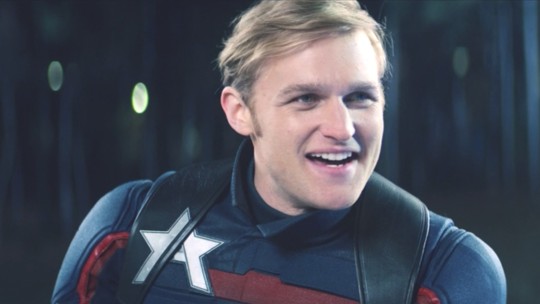
Now hold on, I hate this man. I think he does some awful things, so why is he above anyone else? Just because he isn't frustrating to me, he fits thematically and has good interactions with others in TFATWS.
His character really adds to the themes and discussions of white privilege, Supremacy, as well as how the US military treats their soldiers like shit, and I think he is an interesting character to watch as he starts out edging the line of evil and by the end of episode 4 crosses it. While I think Bucky was overall a bit too chummy with him in 6, I think it was all mostly in character for them. Sam and Bucky were up against 6 super soldiers and Batroc in a highly crowded city with lots of important people, it makes sense to me that they take his help in this scenario. They also never leave him alone which indicates distrust.
I also really like the moment where he drops the shield to help the truck. He is a shitty person but he is shown as a person who at least wants to do good, even though any challenge to that he goes off the rails. It is such a black and white scenario, help the truck of innocents, and I like that he does it. It also adds to the hatred of him as a person because it shows he clearly knows better but chooses to ignore it, which makes him even more despicable.
I think it is very important that a man like him bore the title of Captain America because it reminds us all that yes, it is very easy that a man like him represents America as it is and that we need to do better than him.
I like watching him and that's why he's above CW on Steve because he isn't making aggravatingly out of character decisions all of the time and he works very well within the themes of the show.
With me loving him in the context of TFATWS, in later appearances he does have a lot of potential to drop to last pretty easily, but as of now when he just is in that show, I appreciate his character a lot.
4. Red Guardian
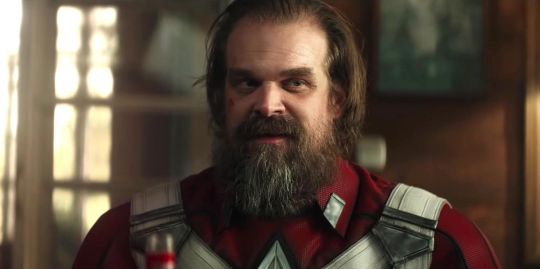
I kinda like this character and idk how to feel about it
He doesn't fit Black Widow very much so he is kinda low but I mean, he's just kinda fun. His story about Captain America and the USSR is pretty non-related to the others and rather undeveloped which is frustrating, and he does very little plot significant things. He leads Nat and Yelena to Melina and that's about it. He distracts Taskmaster for a while but he kinda is just getting tossed around until Melina shows up. He isn't very important.
But I do like what I see and do hope we see more of him. They never pretend he's a great person and I do appreciate that he gets called on it constantly. His knuckles having Karl Marx on them kills me and overall he's pretty humorous and fun to watch. He also has a few great moments thematically that I love. When he comforts Yelena after the dinner scene and sings her favorite song as a kid? So heartwarming. When he took Taskmaster's shield when fleeing the Red Room I laughed at his ridiculousness but it lead to a pretty great moment, when he throws the shield through the windshield without hesitation to save Melina. It's a great moment to show how he's letting go of his past and obsessions to be there for his family.
I hope we see more of him, his overall lack of importance and stereotypical behavior kinda holds him back but I see so much potential in him.
3. Agent Carter
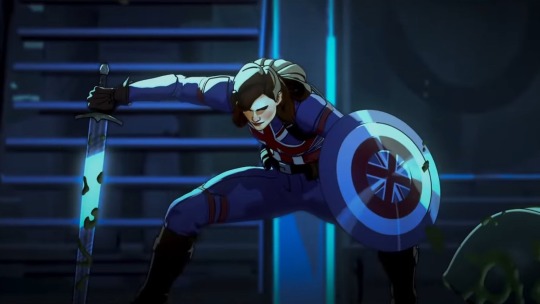
As of today she has been in exactly one 30 minute episode, but what I see I really like. Her laughter of surprise when she takes the tesseract is really endearing, her sword and muscles and height make my wlw heart patter, and I do like the difference in her relationship with Steve in this universe, where they both are of incredible capabilities but neither are given any respect for how they were born. We get that in TFA too but I really like that it is a constant theme in this iteration while in TFA it gets dropped a bit after Steve receives the serum.
There is very little of her so I can't really put her higher yet, but given more time she very well may rise up on this list but she had an excellent first showing.
2. Pre-CW Captain America: Steve Rogers
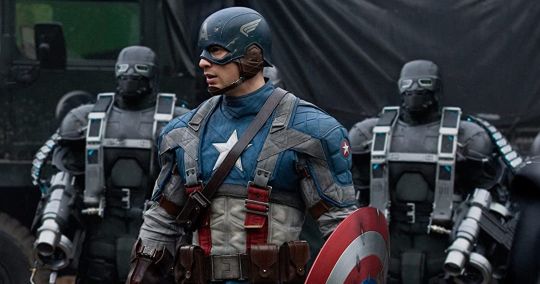
This man is a joy.
He is such an endearing scrappy little guy in the beginning of TFA and I love his commitment to doing the right thing. He still very much acts like a guy who just gained 120 pounds of muscle during that movie and it's endearing. The way he grows into his own skin in TWS is amazing as we see him really step in to what he can accomplish physically as well as his authority and leadership.
His Whedonisms in the first two Avengers films kinda bug me, they treat him like an old man when he isn't. Biologically he's like, early 30's at most here. He grew up as a fighter in Brooklyn then served in the military, he wouldn't care if his teammates swear, but overall it's tolerable.
I LOVE this man's commitment to transparency. He struggles when allies are not transparent and he shows nothing but transparency and I love that that is a constant for him (which is why I separate him from CW on)
Everyone loves this guy and over 90% of criticisms I see for him come after AoU, and that's for good reason, this guy is so loveable.
1. Captain America: Sam Wilson
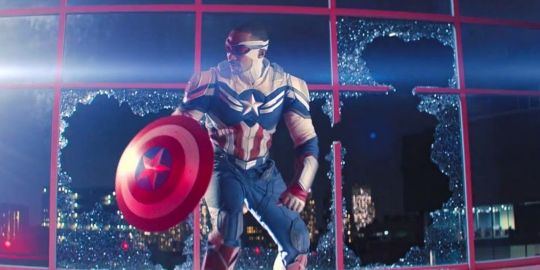
He's so good, guys
I want to talk about Sam before the suit because he is amazing before it. He runs counseling for veterans, a profession very becoming of a superhero and it speaks to his incredible empathy and compassion that is on full display. I also think the fact that he dedicated 2 years to finding Bucky is not appreciated enough. Sure he was following Steve but he still spent 2 years trying to find Bucky, a person who tried to murder him. Yet he understands it isn't Bucky's fault and tries to help him anyway. I also really like that he is the first to speak out against the Accords. He doesn't wait for Steve or anyone else, he sees red flags and he is out and I really, really love that about him.
Then I love how long it takes for him to choose to become Cap and how much he contemplates it. He has to contemplate the legacy of Steve, if he wants to wear the symbol of this country, the pressures of being a black man as Cap, the legacy that John added to it, the pressures from Bucky and the pressures from Isaiah, and also his own legacy he carved for himself as the Falcon. It's a huge decision with a lot of weight and so many people pressuring him but he takes his time and chooses what is right for him, and I really love that about him. These other characters are all Caps from near the start but he transitions into one after years of knowing him as the Falcon and I love that he doesn't take this decision lightly.
Also as Cap he's just really cool. His decisions to not take the serum as well as try like hell to get Karli to step down speak to his humility and compassion. And while many describe his speech as bland it's still uniquely him. Yes the speech doesn't solve any problems but that isn't what he's doing, he's asking America and the world to get to actually solving them and that is an aspect of him we don't see much since Steve's propaganda days, his direct relation to the public.
Also his suit and wings are just awesome, I argue his action is the most fun to watch out of any of these characters.
Anyway yeah that's the list, I know people won't agree with me so let's try and keep discussion civil, alright?
#mcu#captain america the first avenger#the avengers#captain america the winter soldier#tfa#tws#avengers age of ultron#aou#captain america civil war#cw#avengers infinity war#iw#avengers endgame#the falcon and the winter soldier#captain america and the winter soldier#tfatws#caatws#what if...?#captain america#red guardian#falcon#captain carter#steve rogers#alexei shostakov#john walker#us agent#sam wilson#peggy carter
14 notes
·
View notes
Text
have a semi-rushed riconti one shot because i couldn’t not write them for valentine’s day 💕
ship: ace x felix warnings: none word count: 4180
The problem with secret admirers
Holidays usually weren't something the survivors had the luxury of celebrating.
The occasional seasonal decorations in trials along with some ridiculous, thematical outfits seemed more like a sign of their Eldritch captor's morbid sense of humor than evidence of the passing of time. But sadly, lacking calendars and all, it was the most accurate estimate they had.
So when the Entity plopped down some fireworks and talismans on the generators to proclaim the Chinese new year, it barely affected any of them.
Yui and Feng seemed more on edge than usual, the decorations crude imitations of the festivities they were used to back home. Adam had told the group about the year of the ox and the Chinese zodiac, the teacher donning a new hoodie he’d received for the occasion.
For Ace, the holiday meant nothing more than looting as many firecrackers as he could manage, along with making questionable “horny” jokes to the few killers that had received ox-themed outfits.
But in the midst of the survivors' celebration or lack thereof, they'd completely forgotten about another well-known February celebration.

When Ace returns from a successful trial and goes to stash yet another firecracker into his generous collection of items, he immediately notices something that doesn't belong.
Inside the trunk, on top of the organized chaos that is his pile of items and add-ons, lies a note.
Curiously unfolding the piece of paper, Ace makes out somewhat messy handwriting on a worn piece of paper.
'Your smile lights up the room'.
“Oh, ha ha, very funny,” Ace says, turning to face the small group of survivors by the campfire.
“Huh? What's up?” Steve perks up, others following suit and turning to watch the spectacle.
“Someone left me a little prank note,” Ace says, rolling his eyes and flicking the slip of paper over his shoulder.
“What?” Claudette says with a frown, immediately reaching for the discarded note.
“What does it say?” Cheryl asks curiously, coming up beside the botanist.
“'Your smile lights up the room,'” Claudette reads.
“Aww, that's adorable!” Kate exclaims. “A Valentine's day card!”
“The joke being that we're continually outdoors,” Ace explains. “Meaning my smile does jack shit.”
“Are you sure? Maybe they meant figuratively,” Claudette gently prods.
“Yes Claudy, I'm sure I'm not getting mystery love notes,” Ace snorts at the incredulous suggestion, before turning back to the others. “Come on, whose idea was it? Fess up!” he demands, looking over the group
When nobody makes a move to come clean, others also looking around in confusion, Ace eventually focuses his stare on Nea, Meg and Feng, the trio of troublemakers sitting together by the fire.
“The hell you looking at me for?” Nea cusses.
“That’s lame as fuck,” Meg agrees.
“I'm tempted to make one now just so you’ll see—” Feng starts.
“That's a great idea! We should all make Valentine's day cards for each other!” Kate suggest, missing the gamer's point entirely.
“Look, there's a drawing too!” Cheryl suddenly exclaims, pointing at the back of the mystery note still in Claudette’s hands.
Ace sighs and leans over to look, fully expecting a doodled caricature of himself or even a crude phallic sketch.
Instead, he finds a pretty good drawing of some sort of flower. It’s not perfect, but it looks like someone clearly put a lot of work into it.
“It's a clover,” Claudette informs, glancing up at Ace with a smile. “No doubt for luck, even if it doesn't have the iconic four leaves.”
“Uh. Maybe,” Ace says, a little taken aback at the information. Someone really went through a lot of effort just for a small prank.
“So? Who's it from?” Steve asks impatiently.
“It still doesn’t say, Steve,” Cheryl sighs in irritation.
“I mean, Jeff and Jane are the artists,” Quentin points out.
“Uh-huh, sure, Jeff would draw a flower card for Ace and not his botanist girlfriend,” Meg snorts, making Claudette duck her head bashfully.
“And Jane—" Steve starts, excitedly turning to the former talk show host.
“No,” Jane interrupts the teen. “I mean this in the nicest way possible, but hell no.”
“No offense taken, sweetheart,” Ace grins good-naturedly, the cheesy flirt making the woman grimace.
“What about Bill?” Nea suggests out of the blue.
“What the hell are you on, kid?” Bill snorts, and even Ace has to bite back a laugh over the thought of the gruff veteran writing love letters.
“Just trying to think of someone in his age range!” Nea protests.
“Well, did anyone see anything?” Quentin asks. “We can’t all have been in a trial when the note was placed.”
“I’ve been in like three trials today,” Feng complains.
“I don’t think any of us really keep track of people at the fire,” Kate says. “Anyone could have walked by and put it there.”
“Aww, so we’re not gonna know who it was?” Steve frowns.
“Maybe that’s for the best,” Jane says.
As the commotion seems to die down, Claudette hands back the note back to Ace.
“You should keep it. It seems you have a secret admirer, after all,” Claudette says, smiling.
“Guess it can’t hurt,” Ace says, reluctantly pocketing the card. He’s still not sure it's genuine, but is intrigued by the sudden turn of events nonetheless.

Surprisingly, it seems the kids aren’t quite ready to give up on finding out the culprit. Some time later, Ace sees Cheryl, Steve and Quentin huddle together by one of the tree stumps, Cheryl looking to be taking notes on a map.
“Did you ask the ones who just got back?” Cheryl asks.
“Yup! Steve says. “Jeff was mostly confused, and David laughed his ass off. Laurie said she hadn't seen anything weird before she got taken to the trial. And Tapp just looked like he'd lost all hope for humanity,” Steve summarizes.
“Sounds about right,” Quentin huffs.
“Okay, so we've ruled out us three, Laurie, Jeff, Claudette, Jane, Bill, Tapp and David,” Cheryl recaps.
“And Nance has Jonathan, and Felix has his girlfriend,” Steve reminds.
“We should definitely rule out Nea too, since she’s way younger than him,” Quentin says. “Meg and Feng too, I guess."
“You're right, they always bully Ace too,” Steve casually remarks.
Ace rolls his eyes behind his shades and keeps shuffling his cards, not understanding why the group is so hell bent on talking about him like he’s not even there.
“Oh, and Yui,” Cheryl says.
“Good point,” Quentin says.
“Huh? Why?” Steve asks, confused.
“She, uh…” Cheryl falters. “Girl talk. I know it's not her.”
“Okay!” Steve beams.
And that pretty much sums up Ace's expectations for their little operation to succeed. If Steve somehow still hasn't figured out that the Japanese woman is solely interested in other women, Ace doesn’t have much trust in his detective work.
“Kate?” Cheryl suggests.
“She’s making Valentine’s cards for all of us as we speak,” Quentin snorts. “I don’t think she’d play favorites.”
“What about Dwight?” Steve suggests.
“Well… it’s definitely awkward and weird enough to fit his MO,” Cheryl considers.
“I thought he was into Jake?” Quentin says.
And that’s about the time Ace tunes out and goes to bug Tapp to play cards with him, hoping the detective will be happy to pretend like this entire thing never happened.

Ace doesn’t know how long it is before he’s finally taken to a trial, but it feels like an eternity. The atmosphere around camp is awkward as people trickle in and out from trials and someone always feels the need to point out he was on the receiving end of an anonymous person’s affection. The reactions, unsurprisingly, range from awkward confusion to straight up laughter.
So when the fog finally surrounds Ace, he actually welcomes it. The familiar sight of the Autohaven gas station is enough to take his mind off the teasing back at camp, at least momentarily.
But another problem presents itself right as he rounds a corner of scrap and finds Élodie on a generator—
“Hey, come here often?” Ace jokes, crouching down next to the machine to get to work.
—And the woman immediately gets up to leave.
“It wasn’t me, so don’t get any ideas,” Élodie scowls in his direction.
“Huh? I didn’t—” Ace tries to explain, but she’s already taking off in a sprint, and Ace thinks he hears her mutter “creep”.
Ace sighs and barely resists the urge to bash his face against the generator in frustration. This day just keeps getting better.

To Ace’s utter delight—that is to say, absolute annoyance—his mystery admirer becomes the biggest source of entertainment for the survivors. He doesn’t mind playing along for the first few jabs at his expense, thinking the others will surely get bored after just a few hours.
They don’t.
Most of the group still seem determined to figure out the person behind the note, others are content to gossip and joke about the possibilities, and some go as far as to blame Ace for intentionally stirring up drama. His not-so-subtle suggestions to let it go are shrugged off, and after a few days, Ace resigns himself to his fate and figures the sooner he lets the whole thing sort itself out, the better.
It doesn’t mean he’s happy about it.
To add insult to injury, even the killers seem to have a sudden hard-on for him, focusing Ace with single-minded determination every chance they get.
It's only a few days later, when the Pig kneels down Ace's prone form to place a trap on his head, that he realizes why.
“There you go, lover boy,” the woman's voice sounds mocking despite being muffled by her mask.
“Wah?” Ace asks, the device attached to his jaw making it hard to speak.
“I heard someone has a little admirer,” the Pig says. “I figured it warrants some special treatment.”
The word is accentuated by throwing Ace up on a hook, and the gambler's following scream is as much from pain as it is from frustration.

When Ace gets back to the campfire after having his head popped by the killer’s trap, he sits down on a log furthest from the group, hoping to get a breather—
“Hey, look who it is!” Ash immediately interrupts his moment of solitude, sitting down uninvited next to Ace. “How you doing, champ?” Ash grins, elbowing him in the side.
“What do you want?” Ace asks, feeling much more irritable than usual because of the constant teasing.
“I mean…” Ash says, before looking around and lowering his voice. “Have you figured out who it is?”
Ace rolls his eyes and resists the urge to slap the man with his own prosthetic hand.
“Come on, you can tell me!” Ash grins in a very suspicious way.
“If I find out, you’ll be the first to know. Trust me,” Ace whispers, lying out of his ass.
“That’s what I’m talking about!” Ash laughs, way louder than necessary. “I’m happy for you; at least someone around here will be getting laid!”
Half of the camp erupts into snickers and the other half turns to glare at Ace, notifying him that their conversation was definitely loud enough to overhear.
“Not in front of the children!” Jane sneers, like Ace enjoys having his sex life publicly broadcasted.
“Oh, would you look at that!” Ace quips with fake cheer as fog starts creeping up his legs, thankful for the Entity’s timing even though he barely got back to the campfire. “Time for another trial!”

When the fog clears from around him, Ace is in the killer shack in Red Forest with Cheryl and Felix right beside him.
“I'm gonna go find Zarina,” Cheryl whispers to Ace, informing him of who their last teammate is.
“Sure,” Ace says, knowing it’s good to split up, as Felix has already started repairs on the generator in the shack—
“I need to privately ask her about the note!” Cheryl beams and is sprinting away before Ace can reply.
Which is just as well, because he might have said a few choice words to the kid through his annoyance. Thankfully, he's left with Felix, one of the few people who have treated Ace normally throughout this entire thing.
“Fuck this,” Ace curses, joining the handsome German on the generator. Felix glances up but doesn't ask, and Ace appreciates being given the space to rant. “This is the worst thing that's ever happened!”
“The note?" Felix asks.
“What else? It seems it's all anyone ever talks about!” Ace rages, throwing one of his hands up in frustration and nearly causing the machine to explode. “I swear, this is worse than middle school,” Ace huffs. “I have girls gossiping, kids pestering and killers bullying me. And for what? A shitty piece of paper!”
Damn, it feels good to get this out. Ace doubts Felix cares, but it's nice to get to vent to someone he knows won't make the situation worse.
“Whoever left the note must be an idiot,” Felix comments bluntly, and it gives Ace pause.
Sure, Ace is frustrated, but he's still a little sentimental over the note and cute gesture behind it. Regardless, he shouldn’t be surprised that the no-nonsense architect would find the notion ridiculous.
“I'm just so done with it,” Ace sighs. “At this point, I'd take any explanation. Even an 'oops, wrong trunk, it was never meant for you'. Sure, I like being in the spotlight, but this is getting unbearable.”
Felix doesn't say anything, only keeps working away; probably embarrassed being forced to discuss Ace's (lack of) love life.
“I—” Felix starts after an awkward silence.
“Shit, I'm sorry,” Ace interrupts with a chuckle, not wanting the German to be any more uncomfortable than he already clearly is. “Didn't mean to talk about ear off about this stuff. Let's get this gen done, huh?”
Felix immediately seems relieved, and Ace jumps at the chance to change topics.
“You ever been to China?” Ace asks, nodding at the firework decoration on top of their generator.
As they chat about one of Felix's business trips to Shanghai, Ace is simultaneously glad for a distraction from his Valentine's fiasco and melancholy about their shallow friendship.
Maybe he'd take this whole thing more seriously if there was any possibility it would actually lead to something with the one person he's even remotely interested in. If Ace was in his prime, he'd probably have made a move on Felix months ago, girlfriend and heterosexuality be damned. Young and reckless Ace wouldn't have cared, happily flirting his ass off.
Meanwhile, old and slightly less reckless Ace has to settle for shitty jokes and sneaking glances at Felix.
When the Ghostface finally makes an appearance during their second generator and proceeds to chase and tunnel Ace to death despite the others' best efforts to save him, Ace isn’t even surprised anymore.

“I'm starting to wonder if the note is even legit,” Quentin says one day.
“How come?” Kate asks, cocking her head.
“Don't you think Ace's secret admirer would have come clean by now?" Quentin prods.
“Maybe it was just the Entity messing with us?” Laurie suggests.
“If it was a prank from someone, I’m kinda proud of them for pulling it off,” Nea says. “Especially for this long!”
“I think it’s mean,” Claudette says. “They’ve allowed this to go on for way too long. Just look at poor Ace!”
Everyone turns to collectively look at Ace, who is just trying to play some goddamn solitaire in peace while the rest, again, seem content to talk about him like he’s not even there.
“He looks the same as always,” Meg snorts.
“He’s been tunneled to death the last then trials in a row,” Laurie scolds.
“I’m fine,” Ace insists.
“I think his secret fan is just shy!” Kate continues and sparks another debate, oblivious to Ace’s annoyance.

When Ace gets back from yet another unsuccessful trial and sees a group of gossiping people and a grinning Nea, he groans in exasperation.
Before anyone can bring up Ace’s least favorite subject, Felix butts in.
“Ace,” Felix addresses, coming up beside the group. “Do you have time to teach me that perk you used the other trial? With the longer aura-reading?”
“You want… one of my perks?” Ace asks, surprised.
Felix has always seemed more altruistic than others, and it’s no secret Ace's perks were only used by… Well, Ace.
“Um, yes. If it’s not a bother,” Felix says, discreetly glancing at the group of gossip-hungry survivors waiting to attack Ace’s misery.
And it dawns on Ace that Felix is giving him a distraction to slip away.
“Oh, of course!” Ace grins. “Right this way!”
As soon as they’re out of earshot from the campfire, Ace starts prattling away.
“Thanks for covering for me!” Ace beams. “I thought they’d have gotten bored by now—"
“It was me,” Felix interrupts grimly, making Ace pipe down and turn to look at him.
“Uh… come again?” Ace asks, confused.
“I did it. I wrote the note,” Felix confesses, looking at Ace in determination.
“What? Why?” Ace asks, incredulous. When Felix's bravado falters, he keeps going. “Look, you don't have to cover for whoever it was,” Ace sighs. “I don’t blame you for wanting this entire thing to be over—"
“I'm serious,” Felix says. “I've been lying for way too long. I should have come clean before, but I was too much of a coward.”
Alright, what the actual fuck? Why would Felix, of all people, have sent Ace a love note?
While he’s gaping stupidly, Felix continues:
“Claudette was right, it’s my fault for letting this go on for so long. I’m sorry.”
“But… your girlfriend—” Ace starts, struggling to wrap his head around the whole thing.
“Will hopefully move on once she realizes I'm not coming back,” Felix says. “I've started to accept that I'm not getting out of here.”
“Well, that sounds cheerful,” Ace comments.
“Sheiße, I didn't mean it like that,” Felix winces. “I just… thought I'd do things differently this time. Since I never had the courage to, in my old life.”
“So… where do I come into the picture?” Ace asks, skeptical.
“I…” Felix says, wringing his hands in a nervous gesture. “Wanted to see how you would react to the note. It was stupid.”
“Huh? How come?”
“I caused you nothing but harm,” Felix sighs. “First you thought I was mocking you, then the others kept bothering you, and even the killers were giving you a hard time. I'm sorry, I should never have done it.”
“No, I mean—” Ace flounders for an explanation. Sure, he'd been annoyed, but none of the things that happened were Felix’s fault. “Why give something like that to me?”
“Isn't it obvious?” Felix says, scratching at his neck while averting his eyes. “I admit I haven't celebrated Valentine's day much, but I assumed…” he trails off.
What? Felix was seriously trying to test the waters of… getting together with Ace?
It slowly starts to make sense. Felix’s strange behavior. The messy handwriting on the note, probably from Felix’s nerves. The surprising artistic talent of the sketch, after a lifetime of architectural drawings.
“Well, this is unexpected,” Ace says with a smirk, not able to keep the cockiness from seeping into his voice at the knowledge that Felix, somehow, seems to be interested in him.
“Sorry—”
“I said unexpected, not unwelcome,” Ace interrupts.
And then gets to watch the realization slowly dawn on Felix, the perpetual worried frown on the other’s face smoothing out as his eyes widen in hope.
“You don't mind?” Felix asks.
“Let's just say I'm surprised you haven't caught me looking,” Ace grins. “I never expected someone as handsome as you to return the attention,” he can't resist flirting.
“Ähm, well, I…” Felix flusters from the compliment, looking at the ground. “Am not very good at this.”
“I wouldn’t say that,” Ace says.
Then, he reaches into his breast pocket, pulling out the infamous note he’s kept on him this entire time. Felix’s gaze follows his movement as Ace carefully unfolds the paper, crumpled and smudged from having been with him trial after trial.
“I thought you threw it away,” Felix says quietly, eyes wide in awe.
“You don’t just throw away a good luck charm,” Ace chastises playfully, pointedly brushing his thumb over the clover drawing. “Especially not one that’s the nicest thing anyone’s done for me in a long time.”
Ace bites his tongue to stop prevent more mushy sentiments from slipping out. Felix is still staring way too intently and not saying a word, so Ace clears his throat self-consciously tucks the note safely back into his pocket.
“I can’t believe you kept it,” Felix finally says, an adorable smile on his lips as he meets Ace’s eyes.
“Well, seeing as we’ve now established that we’re both sentimental saps…” Ace starts with a smirk, stepping closer to Felix to test the waters. “I have a question.”
“Oh, umh… Yes?” Felix says, straightening his back but still seeming nervous.
It's adorable, and Ace wants to kick himself for not noticing anything sooner. Still, there's no time like the present.
“Be my valentine?” Ace asks with a grin.
Felix's posture instantly relaxes, and the smile is back on his face.
“I'd love to,” Felix says.
Ace’s grin widens until he feels like it’ll be permanently etched onto his face. This is a much better outcome than he ever expected when he found an unassuming note with his items.
“So, ehm…” Felix starts after they’ve been staring at each other for a beat too long, snapping Ace out of it. “Do you… should we…?” Felix falters, nervously brushing a stray lock from his face.
“Wanna find a place to sit down and chat?” Ace suggests, not feeling any need to rush things now that he knows where they stand with each other. “I don’t know about you, but I could use a break from the others.”
“Me too,” Felix says, seeming relieved. “I admit I’m not looking forward to what the others will say about this.”
“Fuck em!” Ace says. “They’ve had their fun, I’m not gonna let them put you through the same shit as they did me. We don’t even have to tell them.”
“No, I want to,” Felix insists. “If I have to hear one more rude joke about you from Feng…” Felix’s mouth pinches into a thin line.
“Aww, babe,” Ace teases, the pet name slipping out before he can stop it. “You don’t have to defend my honor.”
“I do, and I will,” Felix says with surprising determination.
“Well, in that case, I won’t stop you,” Ace grins.
“Good,” Felix says with a smug little smirk.
And the sudden assertiveness makes heat creep up Ace’s neck, quickly starting to regret his suggestion to take things slow.
“I, uh, I think I saw a pretty cozy clearing not far from here,” Ace says, eager to get the chance to get to know more about his companion.
“Lead the way,” Felix agrees.

They end up sitting next to each other under the stars and talking for what has to be hours, but goes by in the blink of an eye. No longer having to filter himself and keep their conversation casual is a much-needed break from the past few days, and the smile never once leaves Ace’s face.
Talking to Felix makes the feelings Ace has tried so hard to ignore come back full force, reminding him of why the man caught his eye in the first place. Sure, Felix is still more attractive than anyone has the right to be, but he’s also insanely smart and surprisingly witty past the initial anxious exterior. The way he smiles and gives his undivided attention even when Ace talks about silly, insignificant things not only makes Ace forget all about his recent frustrations, but also takes his mind away from the strange world surrounding them.
And when Felix eventually scoots even closer and looks at Ace with nothing but fondness in his eyes, Ace has no trouble throwing his initial hesitance out of the window and going in for a kiss.
It’s not earth-shattering or particularly intense, it’s just really, really nice and makes Ace’s heart do stupid leaps in his chest. It’s been so long since he even kissed anyone, and getting to smooch the person he’s been secretly pining over for months and have said person eagerly return the kiss?
“Why the hell haven’t we done this sooner?” Ace voices his thought when he pulls away from the gentle kiss, making Felix huff a quiet laugh into their shared breathing space.
“I should have just signed the note,” Felix says.
“Good thing you can make it up to me now, Valentine,” Ace grins.
Felix chuckles warmly and a callused hand comes up to gently cup Ace’s cheek before tilting his head up into another kiss.
And even though Ace isn’t normally one for holiday celebrations, he’s looking forward to spending many more with Felix by his side.
31 notes
·
View notes
Text
Andy on Asian Animation or SYAC: The Master Review 2
Let’s talk a bit about anime and Dobson’s work relation with it.
I think we can all agree, that starting from the late 90s and early 2000s on, anime and manga became extremely popular in the western world. Sure, Japanese animation was nothing completely new to us (Speed Racer, Nadia-Secret of Blue Water, Samurai Pizza Cats, Sailor Moon, Kimba and Akira e.g. come to my mind as properties already known in the west before 1995) but it really was around this time that thanks to “mainstream” stuff like Dragon Ball and Pokemon people became aware of how different Japanese animation was from western. Eventually resulting in the really good shit (like Cowboy Bebop, Black Lagoon, Kenshin and Heat Guy J) coming over and enriching nerd culture for more than just a few people who knew of it as an obscurity at that point. Now, if you know anything about Dobson, you likely know that his relationship with anime is rather… complicated to say the least. Or, to let him explain it with his own words…
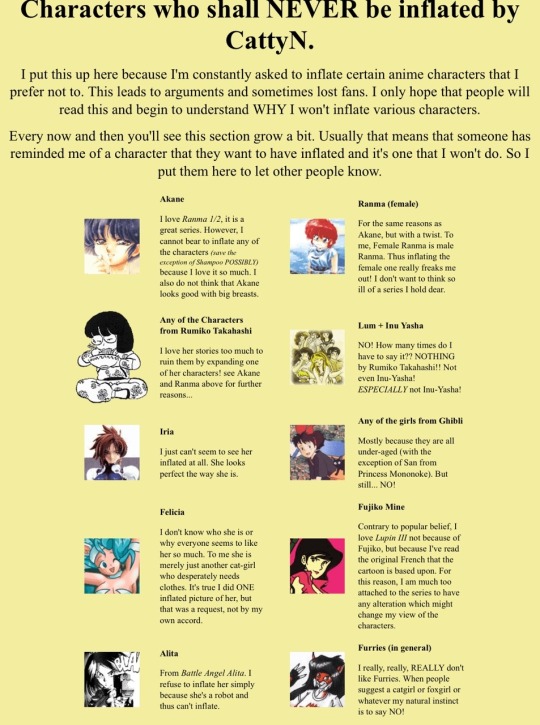
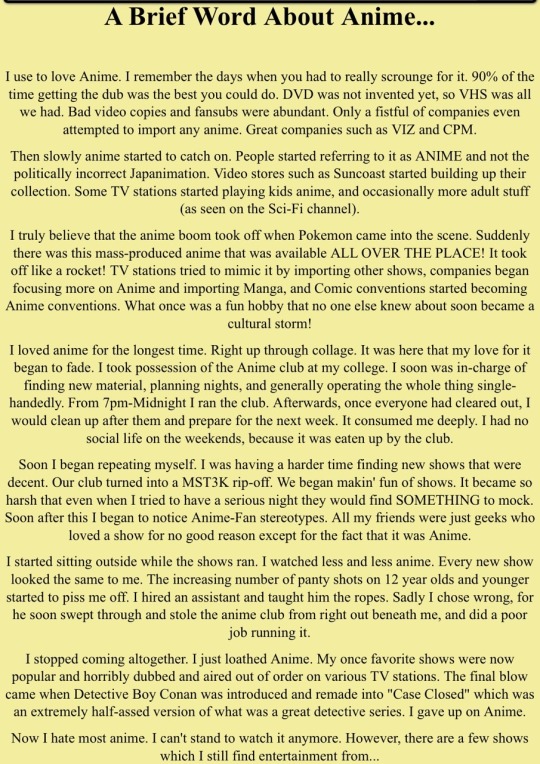
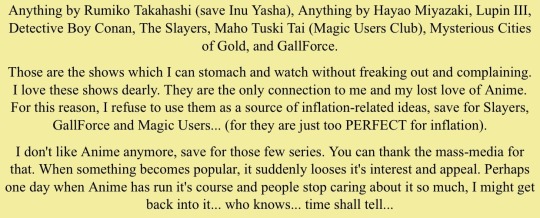
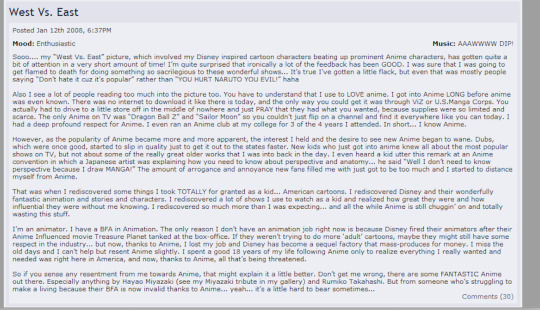
Dobson essentially likes silly and wacky 90s anime. But later on he hated anime in general, because it got too popular and a bad experience with an anime club in college soured his enjoyment of it. Furthermore, he put the blame on his lackluster art style and storytelling capabilities as seen in the likes of Formera, Patty and Alex ze Pirate, on anime in general, while also claiming that Disney pulling the plug on 2D animation is the result of the “anime inspired” Treasure Planet, meaning anime in a sense deprived him of his chance at working at his dream job and “ruining” western animation.
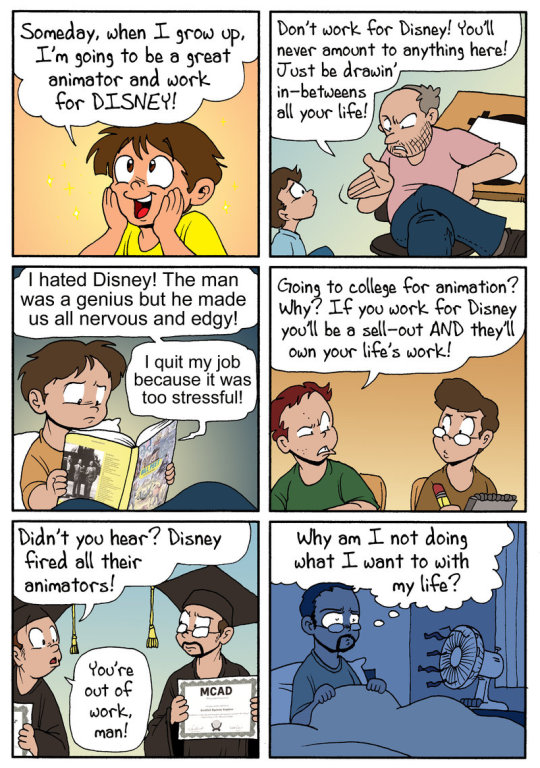
Which to me has always been ignorant as fuck. For starters, I can understand not liking certain stories or genres, either for objective or subjective reasons. But to hate on an entire nation’s form of entertainment (not just individual shows or genres), depriving yourself of the chance of potentially watching a lot of good stuff while also being rather insulting to these other works and people enjoying them? Especially when the stuff you can supposedly “stomach” has been rather simplistic compared to other things?
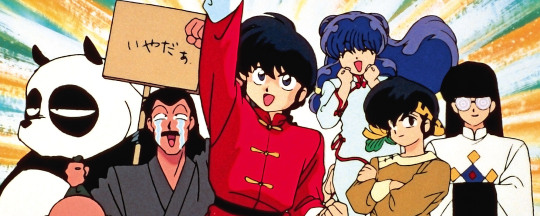
Second, blaming Japan for “poisoning” your art style? What, did the ghost of Osamu Tezuka possess you and FORCE you to put sweatdrops on your characters forehead while also going for the rather simplistic character style of Rumiko Takahashi, as well as emulating the slapstick of the likes as Slayers and Ranma ½?
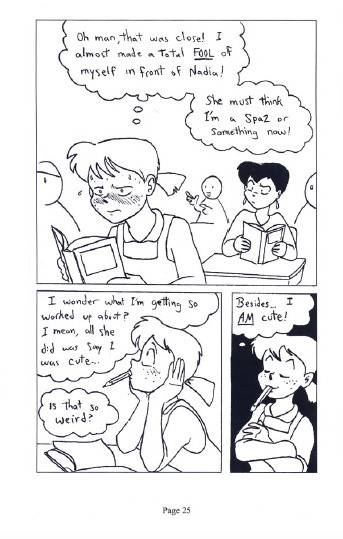
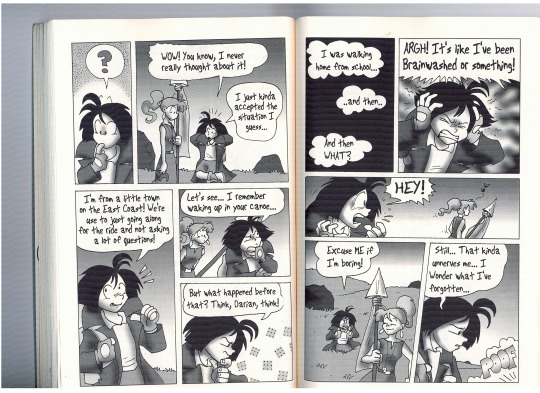
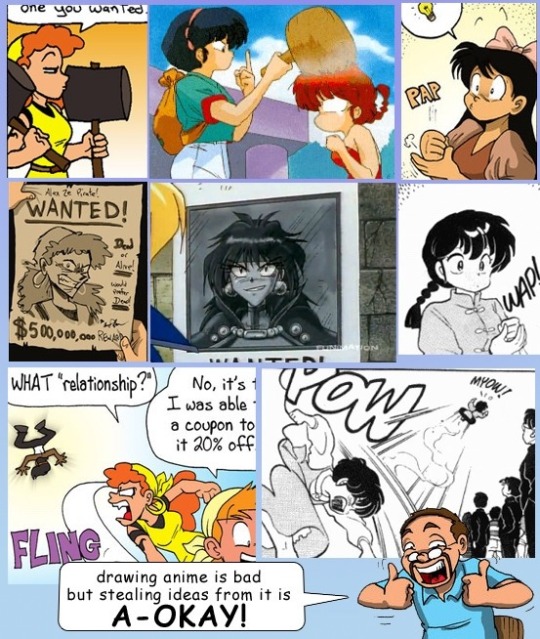
Next, if he had emulated them successfully, I say he would have actually managed to tell decent enough stories worth to read online. Not create Uncle Peggy aka “Discount Happosai” or the bland proto-Isekai known as Formera.
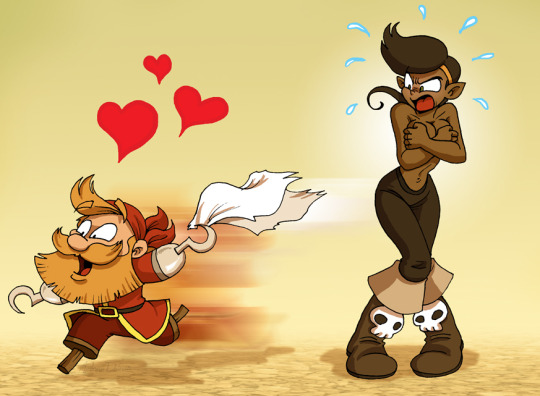
I mean, let’s give some context here: There have been people who successfully managed to emulate certain anime and manga aesthetics into western animation and make it work. Otherwise we wouldn’t have gotten the likes of Avatar-The last Airbender, Samurai Jack, the Animatrix, Thundercats 2011, Super Robot Monkey Hyperforce Go, Kim Possible, W.I.T.C.H, Megas XLR and Wakfu. You know, shows that are actually awesome as hell.
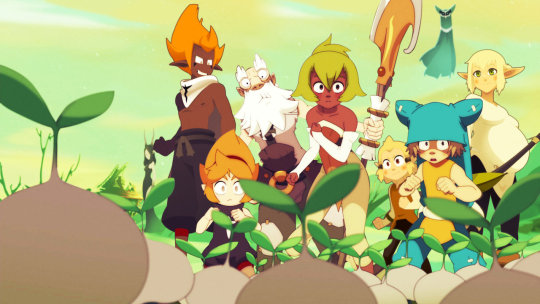
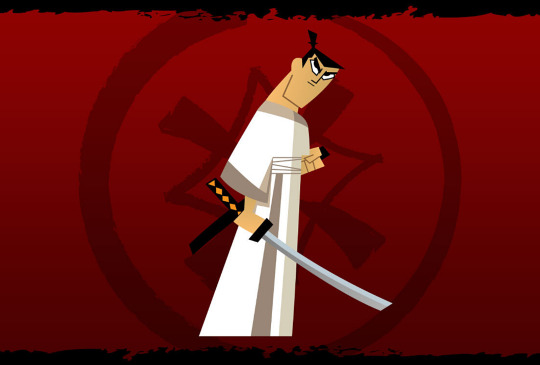
Heck, Dobson’s favorite animated show of the last decade, Steven Universe, is heavily inspired by anime aesthetics to the point of being embarrassing.
But Dobson… well, he emulated anime aesthetics in his work the same way as these crimes against animation did.
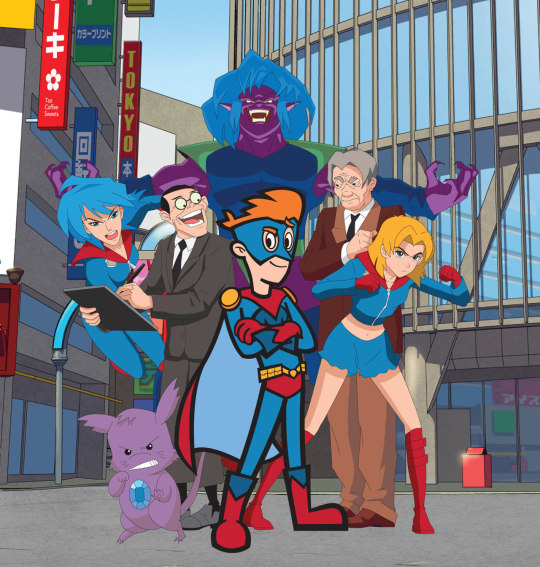
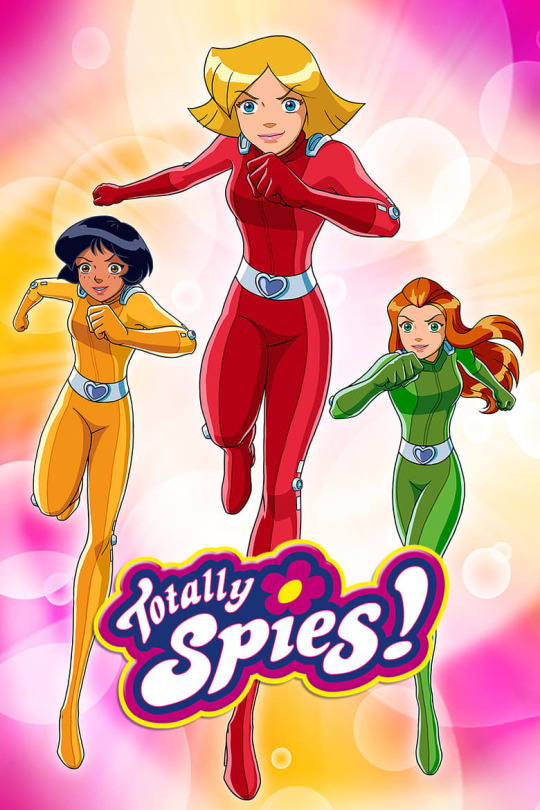
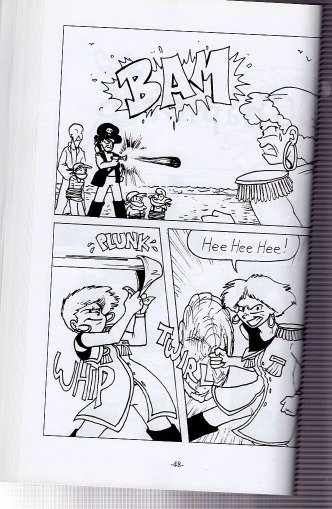
Combined with his general shortcomings as a storyteller it is no wonder his initial comics did not do well.
Lastly, and sorry for digressing here a bit, but if the Wikipedia entry on Treasure Planet is something to go by, there was no real inspiration by anime involved in making this movie.
Supposedly the idea of making an animated Treasure Planet in outer space movie was already pitched by Ron Clements WAY BACK in 1985 but only came to be after Michael Eisner greenlighted stuff in the late 90s. Design wise the movie was supposed to look 70% traditional and 30% sci-fi inspired and people took inspiration for the art style by illustrators associated with the Brandywine School of Illustration. A western style of illustration established in the 19th century, that had a big impact on the illustration styles for many 19th and early 20th century adventure novels and short stories.
What, is anime supposed to be the only form of animation allowed to have sci fi elements or steampunk in it? Fucks sake, The Lion King and Atlantis, which came out one year earlier to Treasure Planet, were likely more inspired by anime. Don’t believe me? Watch Atlantis and then a certain anime by Studio Gainax called “Nadia-Secret of Blue Water”. Or read up on the controversy surrounding the two.
The truth is, it is not entirely clear what caused Disney to shut down 2D feature film animation in the early 2000s. In fact, if anything, most people put the blame on Michael Eisner and a certain change in the publics taste in movies in general, combined with Disney trying to turn almost every movie they had into a franchise via cheap follow up movies on video and DVD.
And even if Disney did not shut down, are we really supposed to believe that a certain guy with fedora would have made it big at Disney to the point Alex ze Pirate would have been made into a feature film?
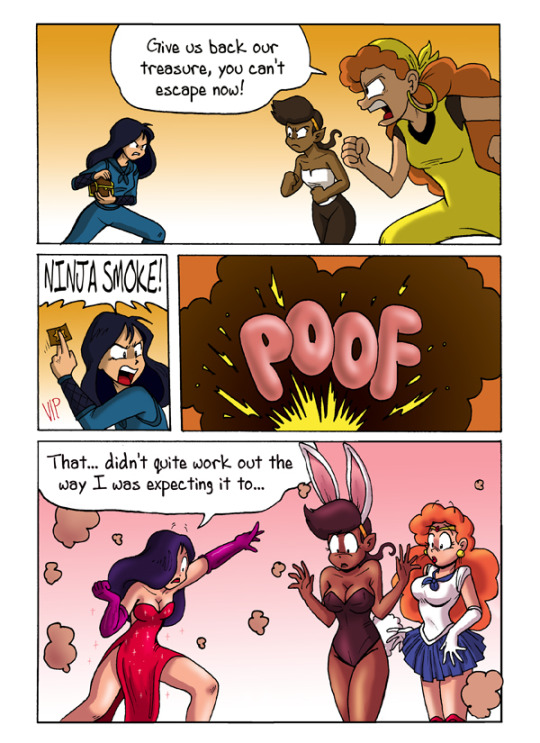
But Dobson could never quite understand this and instead of “reinventing” himself properly, he would rant about anime and its fans in one form or another…
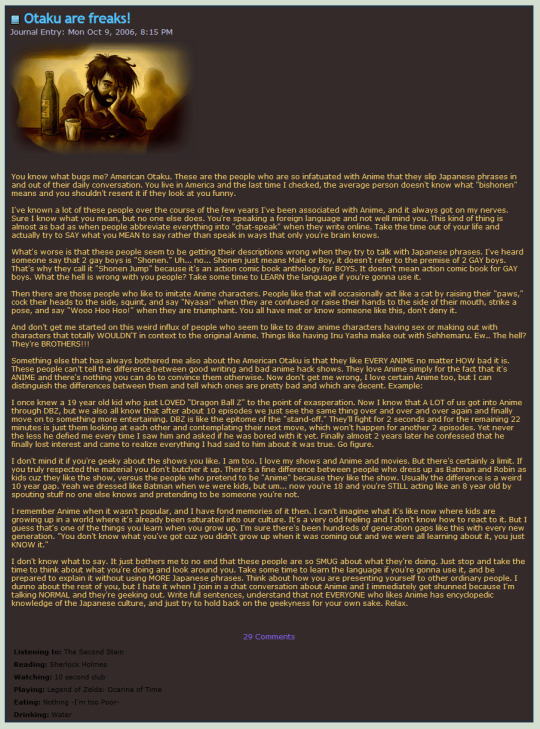
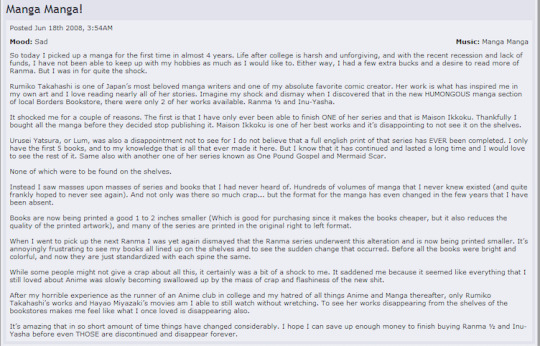
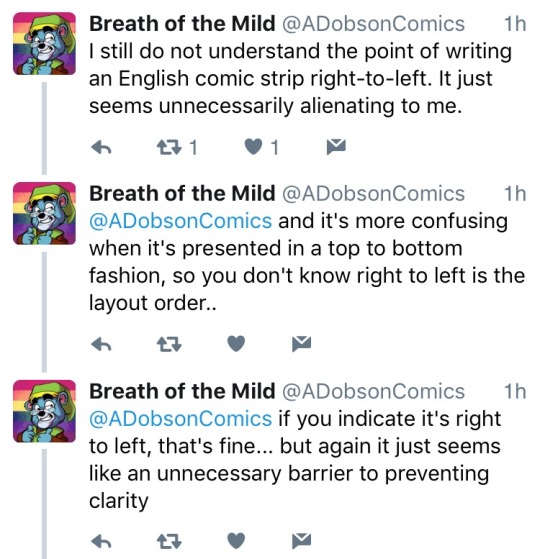
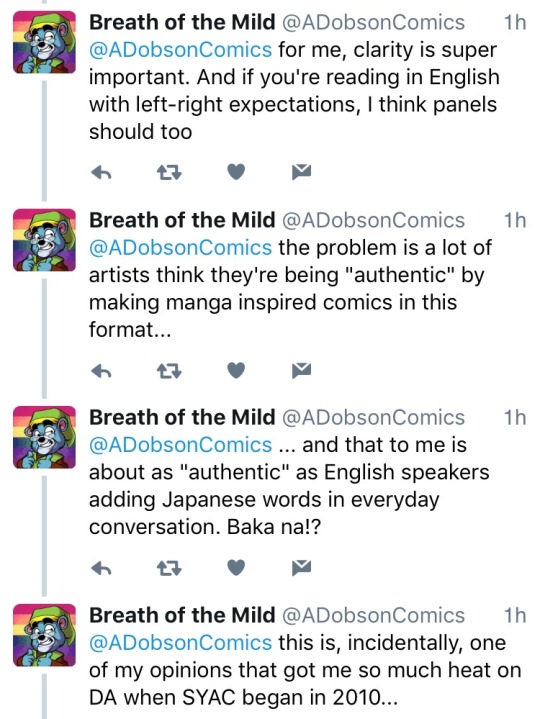
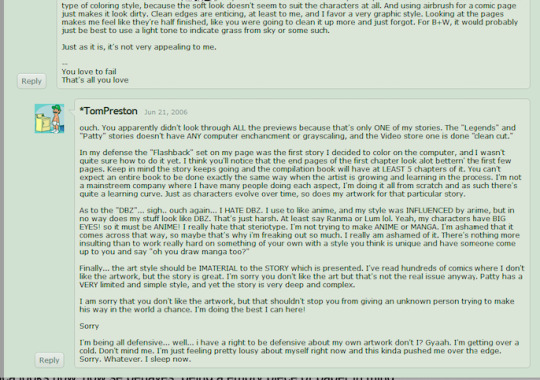
And on the peak of his hissy fit create this little art piece he baptized Anime Sux. Alternatively “West vs East”. Or as I like to call it, slap a jap.
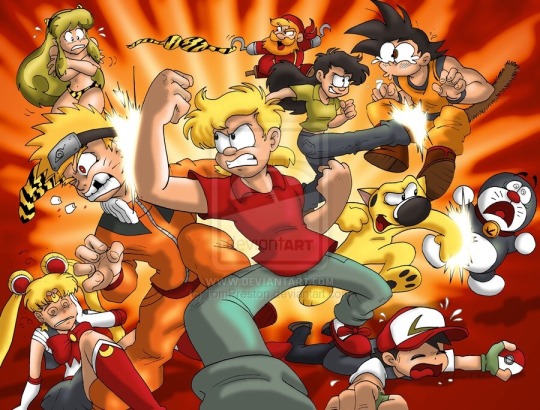

Now, the pic was done in 2008 and Dobson claimed sometimes in the last decade, that he no longer holds his old opinions. Unfortunately, by that point he would also more or less use the chance to vent in his webcomic about anime (or rather its fans), which brings us finally back to SYAC.
While Dobson never outright thematized in more detail WHY he hates anime and manga in SYAC (likely cause if his comic reasoning was even slightly like his reasoning in his blogs, people would have torn him apart like a bag of paper) he did use the format to punch down on anime fans and their preferences.
For example, for someone who has a 4chan story going around of having been rather arrogant towards others in college for not liking Ranma ½, Dobson has THIS little college related comic to show off, where he portrays an aspiring manga artist as a delusional jackass.
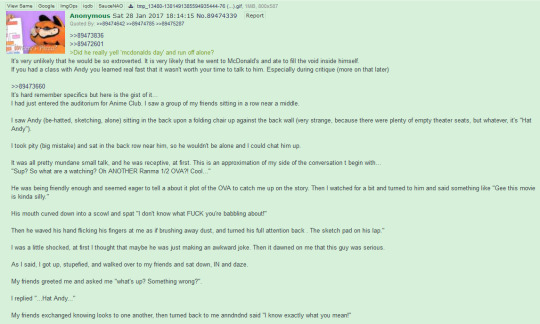
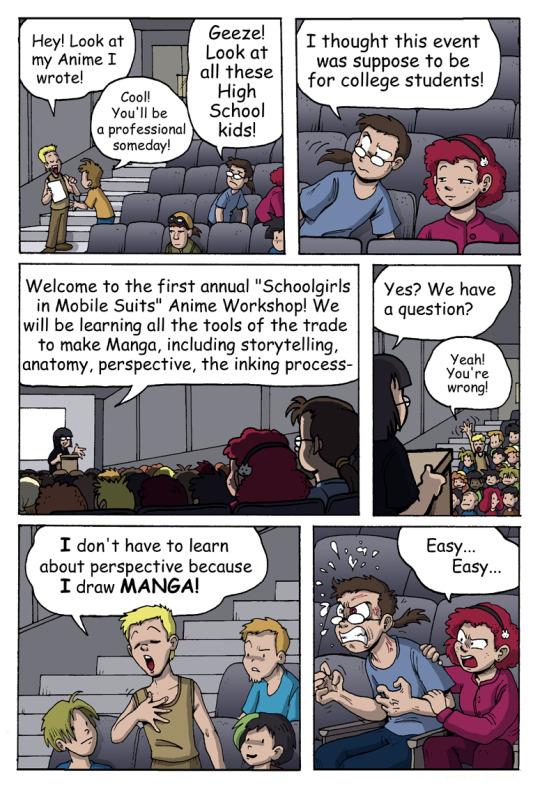
Then in this strip titled manga, his manga fan is essentially portrayed as a young woman dressing up like a very stereotypical high school anime girl, who is in the wrong for even just DARING to draw her comics in the direction manga are read.
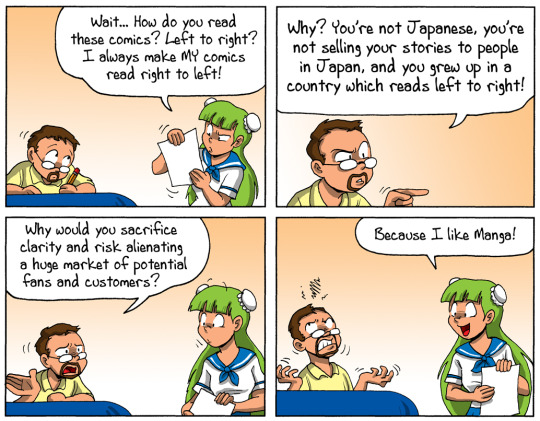
On one hand, I get Dobson’s point. She could be at risk of alienating a market of readers as she is obviously drawing for a western audience. Then again, if she doesn’t draw a traditional western comic but a manga, why shouldn’t she? I mean, as long as she enjoys it, which I assume she does as she seems genuinely just happy when stating that she likes manga, why not let her? Plus, this comic was drawn in the late 2000s. I think by then most people kinda knew how to read from right to left, so Dobson’s claim she would alienate or confuse people is kinda redundant. If anything I find a) Dobson getting angry at her just very petty (just let her have fun) and b) portraying a western manga fan as someone who would be confused by the sheer idea of reading stuff from right to left is also in itself just really dumb and insulting. What is Dobson trying to imply? That anime fans are so stuck in the way they consume certain media, they can’t act according to “western standards” again?
Then there is this strip where yet another female anime fan is essentially portrayed as the embodiment of how “ignorant” manga fans are of the idea of different art styles...
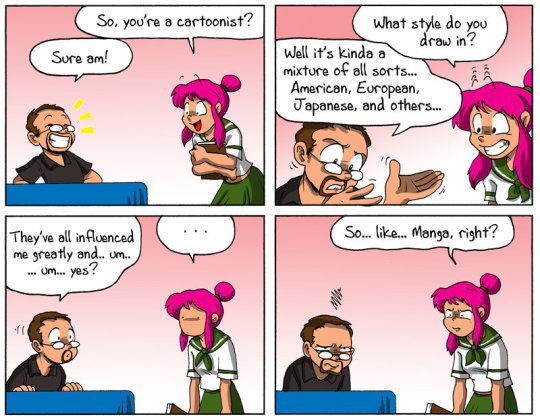
Which becomes rather laughable once Dobson describes his style as a mixture of European, American and Japanese. Why? Because he is the one oversimplifying things, rather than the anime fan.
You see while anime and manga of all sorts do share certain aesthetics (like the black and white art style, emphasize on the eyes of characters, the way hair is drawn, recurring tropes within certain genres and so on) style wise (both in art and storytelling) there can be severe differences, depending on the artist alone. Akira Toriyama’s style differentiates significantly from the likes of Eichiro Oda, Rumiko Takahashi, Kentaro Miura, Tezuka, Kaori Yuki and so forth.
The same also goes for many western artists. Herge had a significantly different style from Uderzo and Goscinny. Don Rosa has a different style in which he drew Scrooge McDuck than Carl Barks did. Rob Liefeld and Jim Lee draw mainstream superheroes differently compared to how Jack Kirby, George Perez and others did. Heck, Ethan Van Sciver and Jim Lee were closely associated with Green Lantern in the 2000s and look how they differentiate.
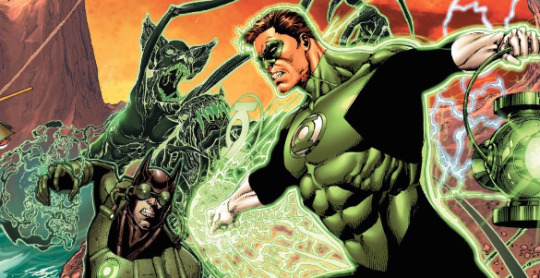
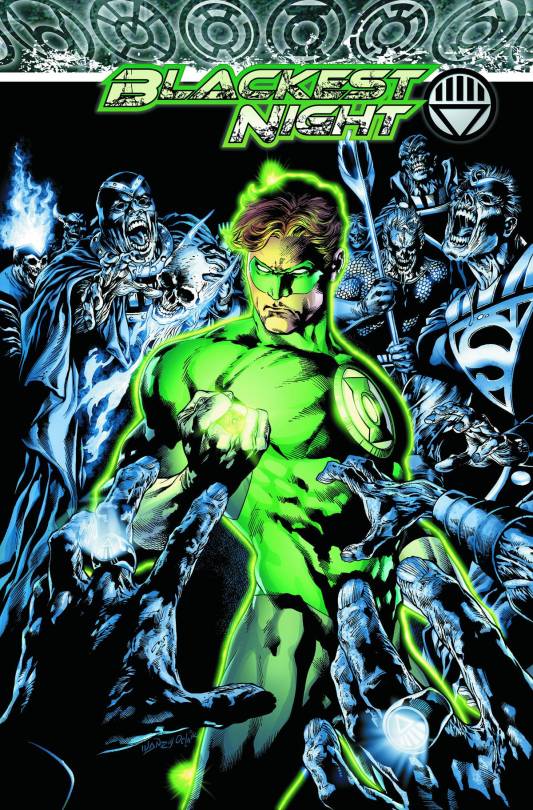
Which btw is the kind of skill level Dobson would have needed to have, to make it in the mainstream industry
So when Dobson says “I draw in a combination of American, Western and Japanese” all I can think is the following: THAT DOESN’T NARROW IT DOWN! WHAT THE HECK HAVE YOU LEARNT IN COLLEGE ABOUT COMICS? WHICH ARTISTS, WORKS AND STORYTELLERS DO YOU TRY TO EITHER EMULATE OR HAVE BEEN INSPIRED BY?
Then there is this little thing…
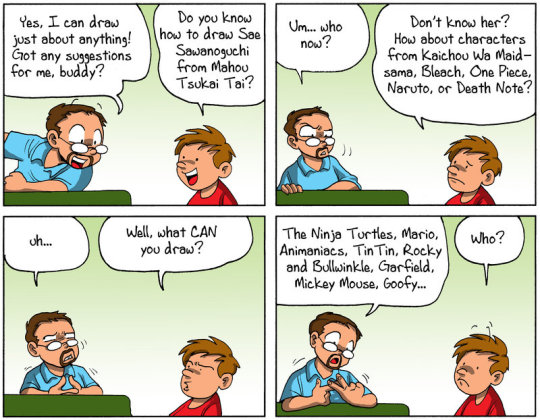
Where do I even begin? How about the fact that Dobson’s hand in the last panel looks like he has lost a thumb? The fact that the little boy, anime fan or not, is aware of Sae Sawanoguchi, a character from a short lived OVA and anime series from the 90s, which considering his age, I kinda doubt he would be aware off. Unlike Dobson, who got into anime in the 90s and admits in fact within the posts I loaded up earlier, that he had watched the anime in particular, known in the west as Magic User Club.
Then there is the implication by Dobson, that anime is so “corruptive” as a medium, little kids don’t even know the most basic characters in western animation because of it. I expect in a next panel, that all of sudden some 50s PSA guy comes along and lectures me that if I want this kind of thing not to happen at MY convention, I need to teach little kids more about the GOOD western animation, instead of the BAD eastern one. Then there is this rather unflattering portrayal of a shonen ai/shojou ai fangirl…
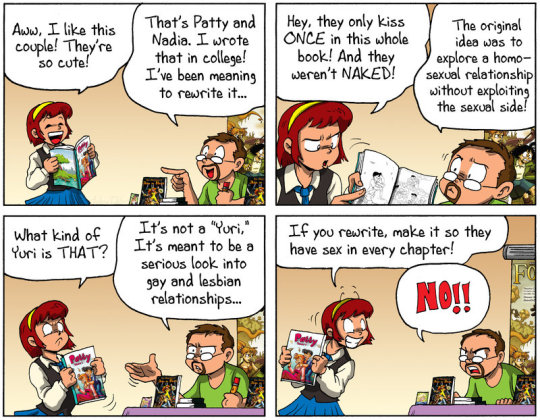
Which makes me laugh cause honestly, even some of the worst shonen ai and shojou ai can do better in portraying a “realistic” gay relationship than Patty if you ask me.
Also, as much as I think fangirls can be extremely thirsty (I have read my fair share of extremely stupid yaoi and yuri fanfics) I think that in hindsight Dobson is really not anyone to complain about shipping obsession and sex when he himself has KorraSami, the Ladybug fandom and a certain rat pirate under his floppy belt.
As you can imagine, Dobson would get heat for those comics, considering how he himself has been greatly inspired by anime and manga for his major comics. And while I don’t have any explicit deviantart posts of him reacting to criticism in that regard, I do have this comic which addresses it directly.
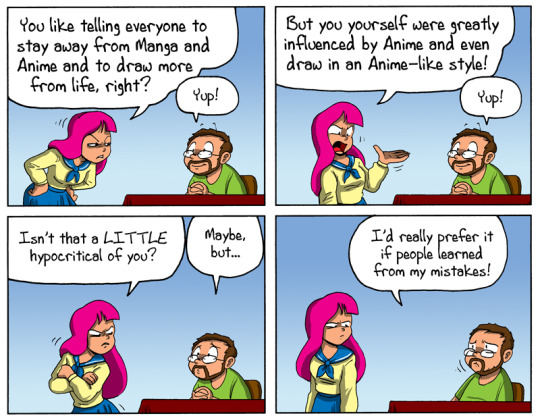
And yeah, if I were schoolgirl number 4, I would just sigh and walk away after telling Dobson that his mistakes and shortcomings are not related to having consumed anime, but rather by what sort of anime (and other stories) he had consumed and the amount of effort he had put in creating his stories instead of emulating just something more popular. Plus, if you really want people to draw more from life, how about drawing more from life yourself down the line? And no, tracing Star Wars movie frames does not count.
Finally, Dobson, considering how very little most people think of your work, I say mission accomplished: People have learnt from your mistakes and know not to be a Dobson.
And at last, there is this comic, which kinda wraps up Dobson’s “vendetta” with anime and manga fans within the pages of SYAC.

By trying to mock anime fans and make them look just as shallow as he is. I at least suppose. Honestly, the message of this comic is rather muddled. On one hand, I would say the strawman accusing Dobson hates anime just because it is popular is very simplified. After all, Dobson has made his reasons for not liking anime clear in a few more details. It’s just that the details in and on themselves in real life are still rather shallow and boil down to a lot of personal bias rather than an objective criticism of actual flaws. Which I think is worth pointing out.
But frankly, what is Dobson trying to say or point out here? That the strawman is not so different or even dumber than him, because he hates Justin Bieber for “shallow” and superficial reasons too?
Okay, this doesn’t quite work as well as Dobson wants. First, the argument Dobson’s strawman makes is in huge parts based on some verified statements Dobson made for not liking anime. Second, he just says a name and that triggers the guy to express his hatred for Bieber. We don’t know why the guy hates Bieber and you could make in fact the case, that he hates him not because he is popular, but because he has a genuine issue with the artist, his work or his behavior as a human being. Third, if you want to make yourself look like the better person Dobson, try to argue with the guy and make solid arguments why you don’t like anime. Instead you just deflect the criticism by changing the subject and then try to make yourself look like the “smarter” person in the room by mocking your critic in the most condescending manner.
Which as I think about it, sounds like your modus operandi on twitter and tumblr.
Weirdly enough, that more or less marks the “end” of Dobson tackling anime fans and the beef he has with them within the pages of SYAC. Despite how much Dobson’s negative reputation especially in early years was build around him hating on anime and belittling its fans, he didn’t really do more afterwards in the Dobson focused pages of SYAC. And mind you, those strips were also separated by other strips in-between, focused on Dobson just being at conventions.
Unfortunately for him, the strips didn’t really help in any way to diminish that negative reputation and instead just confirmed for many, that Dobson can’t handle criticism about his flawed opinion on anime. If anything, it just made people think even less of Dobson, as the strips just painted him as someone who would rather portray his critics as strawman he can be “rightfully” annoyed at, instead of fellow humans with slightly different tastes in entertainment, who are still worth listening to.
So, now that we have the anime fan related “annoyances” out of the way, what other sort of silly problems in making webcomics would Dobson cover in his strips and are “relatable” to everyone?
Lets see some of these examples in the next part.
#anime / manga#manga#Andrew Dobson#fuck you Tom Preston#Tom Preston#syac#so...you are a cartoonist#so you are a cartoonist#review#webcomic#comic#adobsonsartwork#adobsoncomic#adobsonartworks
28 notes
·
View notes
Photo
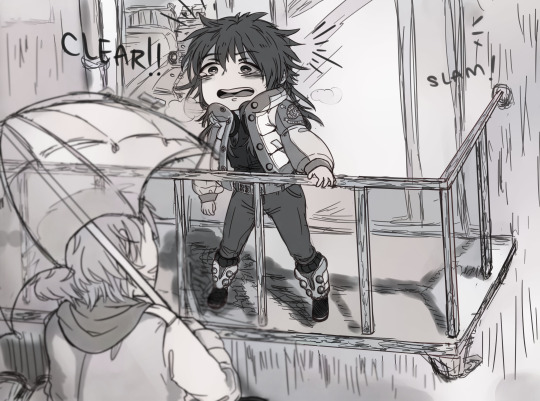
“I heard your voice, so I came... Aoba-san.”
Hooo-boy, if that doesn’t get me emotional every single time. Call it my bias for eccentric bundles of sunshine and softness, or my crippling weakness for the secretly-handsome-and-devastatingly-earnest type, but you can’t change my mind: Clear is, hands down, DMMD’s best love interest. Character development-wise, thematically, romantically, he nails every trial thrown at him, gets his man, and proceeds to break your heart in the tenderest, sincerest way possible. I am hopping with Huge Fan Energy, so this post is gonna be unapologetically long and self-indulgent and grossly enthusiastic. Yeeeee.
————
Look, DMMD meta analysis has been done to death, I get it. This game is old. But I think it stands as testament to its excellent production that it’s still a game worth revisiting years later — especially during these times when social contact is so hard pressed to come by and we all rabidly devour digital media like a horde of screeching feral gremlins. (Have you seen Netflix’s stock value now? The exploding MMO server populations? Astonishing.) It’s pure, simple human nature to want to connect, to cling to members of our network out of biological imperative and our psychological dependency on each other. As cold and primitive at that sounds, social contact also fulfills us on a higher level: the community is always stronger than the individual; genuine trust begets a mutually supportive relationship of exchange and evolution. People learn from each other, and grow into stronger, wiser, better versions of themselves.
Yeah, I’m being deliberately obtuse about this. Of course I’m talking about Clear. Clear, who is a robot. Clear, who is nearly childlike in his insatiable curiosity regarding the human condition.
And it’s a classic literary tactic, using non-human entities to question the intangible constructs of a concept like ‘humanity’ — think Frankenstein, or Tokyo Ghoul, or Detroit: Become Human, among so, so many works in various media — all tackling that question from countless angles, all with varying measures of success. What does it mean to be human? To be good? Who are we, and where do we stand in the grand scheme of things? Is there even a scheme to follow? … Wait, what?
Jokes aside, there are so many ways that the whole approaching-human-yet-not-quite-there schtick can be abused into edgy, joyless existential griping. Nothing wrong with that if it’s what you’re looking for, except that we’re talking about a boys’ love game here. But DMMD neatly, sweetly side steps that particular wrinkle, giving us a wonderfully grounded character to work with as a result.
Character Design — a see-through secret
Let’s start small: Clear’s design and premise. Unlike so many other lost, clueless robo-lambs across media, Clear does have a small guiding presence early on in his life. It takes the form of his grandfather, who teaches Clear about the world while also sheltering him from his origins. It means he learns enough to blend sufficiently into society; it also means that Clear has even more questions that sprout from his limited understanding of the world.
Told that he must never remove his mask lest he expose his identity as a non-human, Clear’s perpetual fear of rejection for what he is drives much of his eccentricity and challenges him throughout much of his route. As for the player, the mystery of what lies underneath his mask is a carrot that the writers get to dangle until the peak moment of emotional payoff. Even if it’s not hard to guess that there’s probably a hottie of legendary proportions stuck under there, there’s still significance in waiting for that good moment to happen. And when it does, it feels great.
His upbringing contextualizes and affirms his odd choice of fashion: deliberately generic, bashfully covered from the public eye, and colored nearly in pure white - the quintessential signal of a blank slate, of innocence. Contrasted with the rest of DMMD’s flashy, colorful crew, Clear is probably the most difficult to read on a superficial scale, not falling into the fiery, bare-chest sex appeal of a womanizer, or the techno-nerd rebel aesthetic that Noiz somehow rocks. Goofy weirdo? Possibly a serial killer? Honestly, both seem plausible at the start.
And that’s the funny thing, because as damn hard as he tries to physically cover himself up from society, Clear is irrepressibly true to his name: transparent to a fault. He’s a walking, talking contradiction, and it’s not hard to realize that this mysterious, masked stranger… is really just an open book. By far the most effusive and straightforward of the entire cast, his actions are wildly unconventional and sometimes wholly inexplicable. But given time to explain himself, he is always, always sincere in his intentions — and unlike the rest of the love interests, naturally inclined to offer bits of himself to Aoba. It doesn’t take the entire character arc to figure out his big, bad secret — our main character gets an inkling about halfway through his route — and what’s even better is that he embraces it, understanding that his abilities also allow him to protect what he cherishes: Aoba.
So what if he doesn’t fit into an easily recognizable box of daydream boyfriend material? He’s contradictory, and contradiction is interesting. Dons a gas mask, but isn’t an edgelord. Blandly dressed, but ridiculously charming. Unreadable and modestly intimidating — until he opens his mouth. Even without the benefit of traversing his route, there’s already so much good stuff to work with, and sure as hell, you’re kept guessing all the way to the end.
Character Development — from reckless devotion into complaisant subservience, complaisant subservience into mutual understanding. And then, of course: free will, and true love.
At its core, DMMD is about a dude with magic mind-melding powers and his merry band of attractive men with — surprise! — crippling emotional baggage. Each route follows the same pattern, simply remixing the individual character interactions and the pace of the program: Aoba finds himself isolated with the love interest, faces various communication issues varying on the scale of frustrating to downright dangerous, wanders into a sketchy section of Platinum Jail, bonds with the love interest over shared duress, breaks into the Oval Tower, faces mental assault by the big bad — and finally, finally, destroys those internal demons plaguing the love interest, releasing the couple onto the path of a real heart-to-heart conversation. And then, you know, the lovey-dovey stuff.
Here’s the thing: as far as romantic progression goes, it’s really not a bad structure. There’s room to bump heads, but also to bond. The Scrap scene is a thematically cohesive and clever way to squeeze in the full breadth of character backstory while simultaneously advancing the plot. In this part, Aoba must become the hero to each of his love interests and save them from themselves. Having become privy to each other’s deepest thoughts and reaching a mutual understanding of each other, their feelings afterwards slide much more naturally into romantic territory. They break free of Oval Tower, make their way home, and have hot, emotionally fulfilling sex or otherwise some variation on the last few steps. The end.
That is, except for Clear.
Clear’s route is refreshing in that he needs none of these things — the climax of his emotional arc actually comes a little after the halfway point of his route. When Clear’s true origins are revealed, he comes entirely clean to Aoba, fighting against his fear of rejection but also trusting that Aoba will listen. It’s a quiet, vulnerable moment, rather than the action-packed tension we normally experience during a Scrap scene.
That doesn’t mean it’s prematurely written in — it simply means that he reaches his potential faster than the other characters. Because of that, he’s free to pursue the next level of his route’s development much, much sooner in the timeline: he overcomes his fears of his appearance, he confesses his love to Aoba, he leaves the confines of a largely dubious master-servant relationship and allows himself to be Aoba’s equal. Clear’s sprite art mirrors his emotional transformation all the way through, exposing him to the literal bone — and Aoba’s affection for him doesn’t change a single bit. Beautiful.
The whammy of incredible moments doesn’t just stop there, though. I don’t exactly recall the order the routes DMMD is ideally meant to be played in, but I believe Clear’s is meant to be last. And if you do, I can guarantee that it becomes a hugely delightful gameplay experience — in order to achieve his good ending, you must do absolutely nothing with Scrap. It doesn’t just subvert our player expectations of proactively clicking and interacting with our love interests; it grabs the story by its thematic reins and yanks it all back to the forefront of our scene.
In every route besides Clear’s, Scrap is a tool used to insert Aoba’s influence into and interfere with his target’s mind. Using his powers of destruction, Aoba is able to prune whatever maligned thoughts are harming his target; in any conventional situation, using Scrap is the right choice.
But one of the central problems in Clear’s route is his conflict between the impulses of his conditioning and his desire to live freely as a human would. Breaking free of Toue’s programming is what initially made him unique; growing beyond the rules imposed by his grandfather is what makes him human. In the final conflict scene, Clear’s decision to destroy his key-lock is an action of true autonomy, made with perfect understanding of the consequences and a sincere, selflessly selfish desire to protect someone he loves. In order to receive his good end, you have to respect his decision. It doesn’t matter which option you pick — by using Scrap, Aoba turns his back on every positive choice he made with Clear and attempts to exert his authority over him. This is Aoba becoming Toue; this is Aoba trying to reinstate himself as ‘Master’ right as he approved Clear as his equal. That’s blatant hypocrisy, and it doesn’t matter if Aoba is trying to do it for Clear’s ‘own good’ — that’s not Aoba’s call to make. If you truly wish to respect Clear’s free will, you will stand by. This is the truth of the moment: Clear has no emotional blockages that Aoba needs to fix. Believe in him, just as he believed in you.
The path to his heart is, and always has been, clear. Scrap was never needed from the start.
While Aoba might be the main character, Clear is undeniably a hero in his own route just as much. Tirelessly earnest and always curious, he leaps headlong into the unknown and emerges with his newfound enlightenment. He’s unafraid of weathering trials, even to the point of accepting death, and returns anew from oblivion to a sweet, cathartic ending. That’s about as textbook hero’s journey as it gets — if that doesn’t make him unquestionably, certifiably, unconditionally human, then I will scream.
And only finally… there is the free end. The final CG is like a throwback to our first impression of him: indistinct, purposefully obscured from proper view. But this time, we know better — and so does Aoba. Looks were never what mattered in Clear’s route. If you were patient, and you were open-minded, and you listened… well, what we realize now is that Clear was doing the exact same thing for you, too.
From a carefree, aimless robot-man with only the gimmick of “eccentric ditz” to carry him forward, we get a supremely more interesting character by the end: a man who has graduated from the well-intentioned but claustrophobic conditioning of his childhood; a weapon who has defied the imperatives placed on him by his creator’s programming; a wanderer who has, through unconditional patience and empathy, discovered love, and striven to become a better person for it. Who was it that ever doubted Clear’s character? He’s the goddamn goodest boy that ever wanted to be a real boy. Of course Clear is human. And in fact, he does it better than every single one of the actually human love interests. You can’t change my mind.
The Romance — kindness is really fucking attractive, okay.
Like I’ve said earlier, I have my Big Fan Blinds stuck on pretty tight. I might be conjuring sparks from thin air. But I think every choice was a deliberate creative decision on the writers’ part, and they deserve all the kudos for it — I’m just the lucky player who gets to enjoy it. But aside from Noiz (who I also think is a perfect darling as well — I could go on and on about him), Clear’s route is a model example for consent and healthy relationships in VN storytelling. This is reciprocated on both sides: never does Aoba infringe on Clear’s boundaries, and neither does Clear. They’re sensitive to each other’s needs and concerns; they ask for permission and stop when it isn’t granted (and when it is, boy do they get frisky — I’m not complaining!) I don’t need to say much more, because I think that consent is both fantastic and yes, incredibly hot (the scene in DMMD is tons more sad, go play Re:connect!). Good writing shows off the massive erotic potential enthusiastic consent puts into intimacy, and Aoba’s and Clear’s relationship is honestly a dream playground. The point is, I think Aoba and Clear genuinely do find equal balance in their relationship by the end of his route (and certainly through Re:connect). If you follow through Re:connect’s storyline, there’s even more thematic richness that comes through in the form of Clear’s greatest asset: communication. The couple get to discuss the long-term implications of them being together; they both offer concerns, points, and assurances to the other, and it’s just a soft, honest moment not so unlike the worries of a real relationship. Hearing is kind of Clear’s motif sense, but it’s really great to see that Aoba also subtly picks it up, really flexes his own communication skills to better engage with Clear.
Point is, Clear’s route spoke to me on a lot of little levels. Design-wise, he’s already got a ton going for him, and his story builds upon it rather than against it, enriching his development and grounding him a little more solidly in the DMMD universe (and in my heart). His route, aside from being emotionally ruinous, carries a pretty solid chunk of world-building (only beaten out by Mink’s and Ren’s, probably), and the romance feels organic, healthy, and realistic. He’s not the only one with an excellent route, but he’s my favorite. If you read through all of this, you’re a real trooper and I’m extremely impressed. Thanks for tuning in. Peace.
#dramatical murder#dmmd#aoba seragaki#clear#dmmd clear#long ass emotional screeching#lOL I FORGOT TO DRAW IN THE UMBRELLA HANDLE ahA#fixed
90 notes
·
View notes
Text
Sundance 2021: Day 3

Films: 4 Best Film of the Day(s): Cryptozoo
Playing With Sharks: Valerie Taylor and her late husband Ron were pioneering shark conservationists for the last four decades, paving the way for protected marine parks in Australia and helping to create a different perception of sharks. As Sally Aitken’s doc on Valerie’s life and times suggests, however, the Taylors were also paying something of a penance: First, for all the spearfishing they had done in their teens and 20s (Ron was a world champion); later, for playing a significant role in helping Jaws achieve some of its underwater shark scenes. As a result of that film’s supernova success, sharks became one of the most egregiously hunted species in the world for decades (one conservationist in the film explains that after 100 million sharks were killed for twenty years — a result of macho big game hunting, yes, but far much more for their lucrative fins, which go on to make the soup considered a delicacy in China — only 10% of the world shark population still exists), leaving the Taylor’s favorite filming subject in dire peril. Aitken’s film, loaded with wondrous footage — a benefit of Valerie’s being in the public eye, and working as marine oceanographers for most of their lives — charts the evolution of Valerie’s relationship with the animals in the sea, and displays her fearless brand of adventuring along the way (Ron dubbed her “Give it a Go Valerie” for her willingness to put her life on the line). Now 85, we also watch her travel to Fiji for a dive amongst a newly replenished population of bull sharks, aided greatly by her, and other conservationist organizations, working to end the shark genocide. For this Jaws aficionado — an animal advocate myself, like the Taylors, I have to acknowledge the harm the film did to marine ecology in my devotion — watching the couple film their notable live shark scenes in Spielberg’s monster movie opus was a thrill, but watching the couple’s dedication to their cause in subsequent years is far more significant.
On the Count of Three: It seems like a great idea to start a film with a pair of best friends holding up guns to each other’s heads in a suicide pact, only to go into extended flashback and retrace what led to this moment right before they pull the trigger, but that’s precisely where things begin to go awry for screenwriters Ryan Welch and Ari Katcher. In comedian Jerrod Carmichael’s feature debut, the two friends, Kevin (Christopher Abbott), and Val (Carmichael) have a long history of helping each other through their respective childhood traumas — Kevin was abused by one of his therapists; Val had a physically abusive father — so they mean to come to this moment in a sort of full-circle act of final friendship, but then various sillinesses intervene to extend the day into a series of escalating incidents until finally things go too far to simply go back as they were. A cross between an unrealized dark comedy (much humor is derived from Kevin’s “horrible” taste in music, including a far too on-the-nose track from Papa Roach concerning actual suicide), and unbelievable drama (driving around in a bright yellow jeep, with Kevin wearing practically a technicolor dreamcoat, it’s impossible that the pair wouldn’t have been arrested almost immediately), the film gets decent mileage out of its pair of leads, who share a solid rapport, but never seems to find its footing enough to make much of an impact otherwise.
Cryptozoo: In his zoom video intro to the film, writer/director Dash Shaw appears through a kaleidoscope filter, a fitting visual enhancement for the trippy animated film he’s created. Painstakingly hand-drawing the cells, which gives the film a much less fluid but appreciably personalized appearance, he’s crafted an engaging story about cryptids — mythical creatures, from gorgons, manticores, and chimeras, to unicorns, pegasuses, and a baku — being kept by a kindly woman (voice of Grace Zabriske) in a secret park in order to keep them safe from outside forces. Tracking down the creatures from opposing sides are Lauren (Lake Bell), a fiercely determined woman, whose childhood was saved by a nightmare-eating baku when she was a child; and an evil-minded capitalist (voice of Jason Schwartzman), who has a mind to sell the creatures to the military. Trippy it most certainly is, but the story remains solidly coherent — imagine a kind of Jurassic Park but with a kraken, and a lot more peculiar nudity — which keeps it beguilingly grounded, despite its fantastical imagery and thematics. As an analogy for how it is mankind has lost all instinct and contact with the magical realm — well, beyond the MCU, and LOTR, and all the movie series that have made billions of dollars on the idea — but, also, a treatise on what happens when even our best intentions turn out to be misguided.
Eight For Silver: Sean Ellis’ werewolf movie tarts itself up a bit with 19th century gothic imagery and a steady atmospheric gloom, but the script, which Ellis also wrote, can’t escape most of the worst cliches of the genre, and its earnestness alone can’t keep it from being pretty insipid. Alistair Petrie plays a wealthy landowner named Seamus Laurent. When a group of Roma come to settle on his land, which they (rightfully, it turns out) claim as their own, he and the other nearby landowners pay a posse of mercenaries to eviscerate them as cruelly as possible. As a result, Seamus and his family, wife, Isabelle (Kelly Reilly), daughter, Charlotte (Amelia Crouch), and son, Edward (Max Mackintosh) are put under an ancient curse. Many predictable things happen from there involving a pair of silver, canine-like teeth, innocent people being gored by some mysterious creature, and lots of arterial sprays of blood (Ellis seems to have a penchant for them, as well as for severed limbs — I lost count of how many hands and feet were forcibly removed from their trunks). When a pathologist (Boyd Holbrook) comes to investigate, he puts all the pieces together, but not enough of the landed gentry listen to him in time to save themselves from their appointed maulings. Shot in the French countryside, the film has a grand palette with which to work, but too much time is spent establishing things that seem perfectly obvious, and the script is riddled with peculiar anachronisms (“Me, neither,” one character says in response to someone being unable to sleep) that keep throwing off its calculations. It’s trying hard, but simply isn’t made carefully enough, or with enough originality, to have it rise above its B-movie sort of station.
Sundance goes mostly virtual for this year’s edition, sparing filmgoers the altitude, long waits, standing lines, and panicked eating binges — but also, these things and more that make the festival so damn endearing. In any event, Sundance via living room is still a hell of a lot better than no Sundance. A daily report.
#sweet smell of success#ssos#piers marchant#films#movies#sundance 2021#film festival#virtual#eight for silver#cryptozoo#at the count of three#playing with sharks
2 notes
·
View notes
Text
Unpopular opinion: god, Batman v Superman had some really good ideas that it chucked down the U-bend, and there are parts of it I really enjoyed. I don’t regret seeing it (and yes, I watched the Extended Cut. All three hours). I was just discussing this with @masutrout, and here’s a slightly abridged version of my thoughts.
Look, I know no-one sets out to make a bad film, and with so many moving parts, a film getting released at all is a miracle. I know it’s not down to one person and (I’m quite glad) it’s not up to me, because I have no idea how to make films. But if I had, say, a magic lamp and a wish for an ideal BvS and DCEU in general... Here’s what I liked; here’s what I’d magically tweak in a parallel universe; here’s a rant. A 2.2k rant. An Extended Cut rant.
I know it's all desaturated and so on, but I genuinely really love Snyder's style. Dude can set up a shot, and he knows how to use chiaroscuro. In theory, I totally get why they'd look at him and go, "his shit is like comics brought to life, pick him." I wish he'd just... allow a bit more colour into it and let people colour grade properly, because the Metropolis/Gotham Clark/Bruce contrast could've been played up beautifully with visual language and colour too. I mean, I know he can do overwrought iconography and imagery, look at how they went to the trouble of CGI'ing Clark's cape in every scene because it was such a banner, and the pop of red.
I'll admit, I wasn't always all-in on Affleck's performance, though it was one of his best in his back catalogue (I am one of the few people I know who has zero problems with him as an actor and tends to find it more the material, but I grew up on Kevin Smith films and his shtick works for me, even if he has a manner. I'm not too discerning). But. A Bruce who's tired and broken-down and greying and has lost even more, and still in the aftermath of that, tries to find hope and "I can't let this happen to anyone else" again, in the wake of one more death? God yes give it to me. A Bruce who's taller than Clark and just plain tall in general, because maybe Kryptonian ideals are different and because it'd give Bruce one more thing to desperately play down? God yes. Just... in general, middle-aged Bruce but without a lot of the Batfam stuff (which I like, I have a love for several of the Bats, but my favourite stories are always solo) with a regimen of painkillers and who's turned Wayne from an "I'll just jump into the water feature" jackass to a schmoozer and flirt and maybe a drunk. Take out the branding. I wanted Bruce as a broken idealist, not a fascist. It's actually way more fascistic than the original Dark Knight Returns, even. But goodness, the whole idea of an established, tired Batman is good. There’s a reason the comics and animations keep coming back to it.
"Superman was just a story. Superman was just the dream of some farmer from Kansas." I forget the exact phrasing, but everything about that idea, and this idea that Superman is as much an ideal for Clark to live up to as everyone else, and he’s daunted by it? Yeah. There’s something in there.
I loved everything about Jeremy Irons' Alfred. Seriously, everything. Tech guru, little less RP, little rougher around the edges, clearly has some scars of his own. Absolutely biting, even more than most incarnations, and gets all the best lines. Yes, keep that, it'll do.
I liked the voice changer... halfway. To me it makes way more sense than putting on a voice, which is a bit daft and way more variable. I just wouldn't have gone that heavy on the processing, so that Bruce sounded less like a hacker from 1999. I also thought it was a good way of representing how Bruce desperately tries to emotionally distance himself when he’s the Bat, and how his anger has made him colder.
Batman as just a rumour or an urban legend is great, and a wonderful contrast to Superman, who’s this bright, transparent... common god. Bruce never did it for credit, he did it to get it done. It’s stretching the bounds of credulity, sure, but in this strange, semi-operatic storytelling with heavy myth feel, it makes a bunch of sense thematically.
Bruce meeting Martha Kent, and their first meeting being him saving her life. Even this broken-down Batman who thinks he’s a mess. Actually, just more Martha in the DCEU in general. I mean, I get why they didn't lean into it so much because they maybe wanted Bruce and Clark to feel more like equal peers, rather than Bruce being too dadly, but... god, again, more Martha. In JL, in something, if nothing else. Martha who's lost a son (Jason); Martha who later has a son in another city trying to do good and is worried as hell about them (Dick's canonically in Bludhaven PD at this point); Martha who is one of about five people in the world who knows who Batman is and hasn't spilt that information; Martha who saw Bruce at the cemetery and might have some really interesting things to say to him, angry or forgiving; Martha who is one of the few people who's seen the good in the Bat (when Bruce himself couldn't)... Man, I was so, so glad that fic leaned into that. I would read a regular comic book of just Martha and Bruce Being Reluctant Friends and Worrying A Little About Their Kids, But Maybe In An Enemies-To-Friends Way Because Holy Shit You Had A Fucking Spear What the Fuck.
No, really, wait, I’m going to go on about Martha again. The scenes in BvS where she was basically saying, "God, don't kill yourself for them, come home, if they're gonna hate you they don't deserve you..." On the one hand she could've been a contrasting voice to Jon, but this way also makes sense. "I know you want to help but please don't kill yourself..." It was always both parents in the comics who affected him equally, even if the Donner films had his father's death, iirc. It was Martha who pushed to keep him, Jon who taught him not to break people and show off, Martha who taught him how to cook and be gentle with things and in Superman: Birthright, which MoS is heavily, badly based upon (I love that miniseries, time to read it again) she researches alien sightings in the hope he won't be alone. I get why they went for a more "grounded" Kryptonian uniform thing, but Martha made his costume, in the original canon. In all canons, she was a huge help in creating the "Clark Kent" persona (yeah, sure, maybe a woman would have something to say about making yourself quiet and shrinking in a room and having to look helpful and nonthreatening all the time, but Snyder and Goyer were never gonna be the kind of people to explore that and even Waid, whom I love, barely touches on it). Every other film or comic book is crap, dead, or crap and dead dads. Clark's relationship with his mother and father is hugely important.
Getting to see Bruce doing the society beat, and just a little more philanthropy would've been great. You don't have time to build that character? Sure, OK. Take out the Flash dream sequence and the sleeping-with-random-women, maybe don't have a totally unnecessary but kinda hilarious shower scene, and replace it with some identity weirdness where Bruce and Clark are stuck interacting as civilians a little more. Or something about what the hell happened with Jason and the manor, though I don't mind most of it being unexplained. There, still building character, still serving a purpose, you can fit a brief scene into your three hour movie. Civil War had a ton of "Steve Rogers and Tony Stark brood or sit in rooms talking to each other."
If they were going to throw away all the secret-identity potential, they could at least have done it interestingly. That scene at the gala made it clear how hard they both had to act, and Jesus, the idea of Clark eventually, finally finding someone else who has to lie and cut off what they can do, who has to bumble almost the way he does... That could've been interesting and also maybe worried the shit out of him. Or made him want to talk to this crazy billionaire who goes round combat-booting people in the face and try and get what his deal was, which could've led to more interesting misunderstandings.
And then there's Diana, who's not a bumbler but a "nothing to see here, rich eccentric" type too (no wonder she and Bruce had weird insane chemistry in that "sizing each other up/I know exactly what you are" way), and why the hell does Clark basically never see her? I actually don't mind the whole "she's only here for her photo and never meant to get involved, so she's only needing to chase Bruce," that makes sense, but after Doomsday?! In Justice League?! She understands what it is for the world to be frightened of you, resistant to you, the urge to go and hide where it's safe with your family, the loneliness. I mean, just imagine MoS!Clark meeting her and the goddamn relief of it. And the way it could've played off the whole Jonathan Kent is a creepy "kill em all" weirdo now thing, if they insisted on keeping it.
Similarly, please god please show Clark being a journalist more. Perry chewing him out more. A mild hint of office politics. That's the perfect place to leaven a rough film with a dose of humour. People wouldn't have been so bothered by "Is she with you?", which is actually not that terrible a line next to some Marvel "zingers", except for it being so tonally inconsistent. A gentle thread, a few moments of it. Maybe have Clark save someone and have to scrabble to keep his identity a secret, like in MoS - maybe a minute, you could go for some physical humour or a mild sight gag. Obviously, this'd be pre-bombing the courthouse. Relatedly...
Take out Nairomi and the branding. They serve very little purpose, story-wise, basically never come back into the plot, and only serve to make Clark and Bruce look like dicks unnecessarily when if you want to inject flaws, you have a ton of opportunities to do it with how they deal with people and their loved ones, how they deal with perps, and their brooding moments.
Seriously, Bruce kicking the shit out of people and investigating shipments from the Black Zero and World Engine crashes would be enough to worry and piss off Clark, as would the whole "I am the night"/lack of transparency shtick. I mean, for a start, John Byrne retconned their first meeting that way in the 80s and that issue is actually great (Clark is trying to arrest Bruce when they meet, because he's young and idealistic and maybe a little up himself and he's been Supes for about five and a half minutes). Look: Clark is being revered and hates it. He blames himself for Black Zero, at least a little. He has excellent reason to be desperately projecting brightly-coloured not-a-threat and also hate that someone else is terrorising a city and violence is being revered, especially when Metropolis and Gotham are still so raw. I mean... Snyder and Goyer did the fucking stupid offensive 9/11 comparisons. Look at how that affected people and still does to this day; emotions run bloody high, and the entire point of Clark is that he's still human and terrified and guilty. And with Wallace O’Keefe and all the threatening notes... look, there's already a good plot in there!
Meanwhile, Luthor clearly knows Bruce has been sniffing around the K shipments and could've just tipped off Clark about that as well, saying, "He clearly is gonna use it for his own power, and with how sinister and opaque and violent he's already been, he's gonna hurt people." Having his heritage used against people is one of Clark's worst nightmares, it was implied pretty clearly in MoS, and you'd still have the righteous anger. No branding needed. Kryptonian artefacts and the entire masked violent vigilantism are already enough "this is someone who thinks he's above people and can decide their lives" to piss Clark off. He could even investigate that as himself rather than Supes. You need it to be an unanon tip-off and Keefe wouldn't have access to that information? Sure, OK, just filter it through Mercy Graves and make her a "worried confidential source." I mean, she's in the movie and completely wasted. Why not actually, you know, do something with her? Clark wants to believe the best in people, and he might dislike Luthor personally, but he doesn't know Luthor's out to get him yet - or wouldn't, if the writing was better. Again, Birthright, the text Goyer repeatedly ripped from, did this brilliantly. The brand... it's overkill. Grimdark overkill.
I actually... look, I had a really fun, if baffled, time with this movie, but goodness I’d like to see what it could’ve been. And now all the film sites are waving goodbye to Batfleck again while running DC retrospectives due to Birds of Prey, and Cavill’s blue tights are in doubt, it seemed like as good a time as any.
#tru goes dc#batman v superman: dawn of justice#batman v superman#bvs critical#but also kind of positive?#i'm trying to be positive here too#dceu#dc#meta#ie me rambling
13 notes
·
View notes
Note
Which is your favourite dynamic in Requiem for a Phantom? Do you have a favourite episode? Quote?
Hello anon!
Thank you so much for this ask because it gives me the chance to talk about this series!
My favourite dynamics are the ones among the three phantoms and especially the one between Elen and Reji because of its importance for the whole series and for the themes.
Phantom explores several themes. Some of them are the following.
1) Giving one’s own life meaning despite how tragic it is. Because of the nature of the series, this often happens through death meaning that many characters try to give their deaths a meaning or to conclude their lives the way they want to:
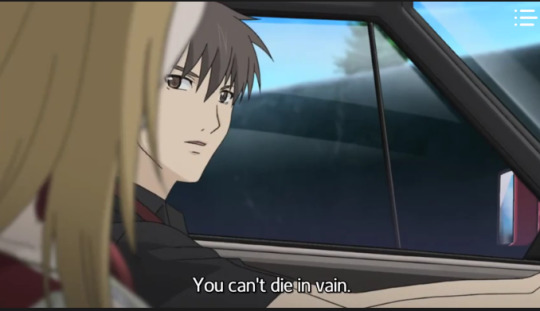
After all the series is called Requiem for the Phantom and a requiem is something made to celebrate a dead person. The title highlights that the story is about celebrating the phantoms’ lives despite how short and tragic they are. The point is that even these individuals who are not part of society and have committed sins and lack an identity are worth being remembered and being given value.
2) The series explores a specific setting and underlines the cruelty of the criminal world from which it is very difficult (and basically impossible as far as the series is concerned) to escape. The criminal world is described as a literal hell and it is embodied by the organization Inferno which wants to unify it under a single name.
Inferno is a group made by the traitors of other organizations:

This is fitting thematically because it shows how the criminal world twists every relationship and attempt to maintain some kind of honor.
This is shown multiple times and the story arc centered on Tony Stone is the first example offered by the series. Tony, despite being a criminal, loves his people and family and believes in a code. However, in the end he loses his family and dies, his organization is destroyed and used as a scapegoat and he is betrayed by a friend. His story conveys the futility of trying to build some kind of ethical system in a world which is driven by power and ambition and where people’s lives are constantly at stake.
In the series as a whole this same theme is mostly expressed through Lizzie’s character arc. She wants to be treated as a person and asks her employer to do as much in exchange of her loyalty. However, in the end she is betrayed and is forced to kill that same employer despite the fact that she still cares about her.
3) Finally the story is one of self-affirmation and of obtaining a will:
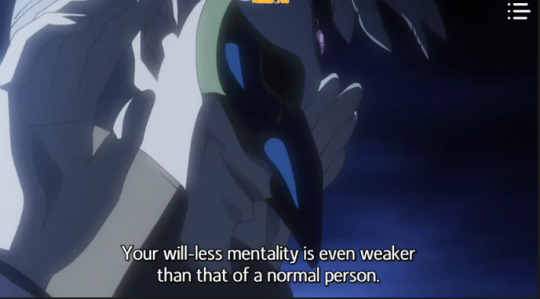

A person should take responsibility for their own actions and sins because only in that way they can truly become an individual.
The relationship between Reiji and Elen (and also the one between Reiji and Cal, but I am not talking about it here) is important for all these three themes and it is fundamental for the whole story.
2) Let’s start from the second theme aka how personal relationships are sacrificed for survival or power in the criminal world.
The important thing when it comes to Elen and Reiji is that they are an exception to the rule. As a matter of fact, even if the people around them like Scythe and Claudia try to manipulate them and to force them to fight against each other, they keep caring for each other and always choose each other over the interests of the organization.
They struggle to do so because of their flaws, but in the end they manage not to betray each other.
This is made obvious in the climaxes of the first two acts which are built so that they are mirrors. In the first act Claudia manipulates things, so that Elen and Scythe are hunted by the organization and in the second act Scythe does the same targeting both Claudia and Reiji. However, both times Reiji and Elen avoid killing each other.
This is also connected to theme number 3) i.e. to the ability of affirming one’s own will.
First of all it is interesting that Elen sees Reiji in this way:
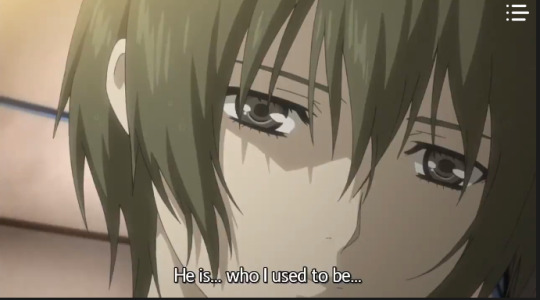

Elen is a person with a very frail sense of identity because of the abuse she went through. She has developed a specific coping mechanism to survive her assassination job:


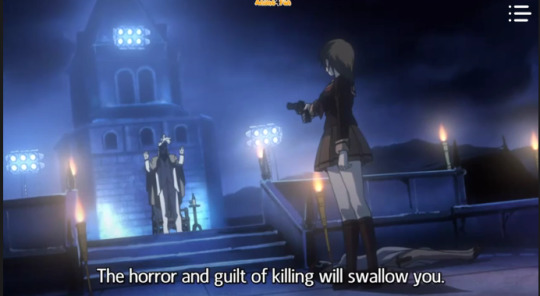
She nullifies herself and makes her completely dependent on others. If she is ordered to do so she can kill anybody without getting hurt because, in a sense, she is not killing out of her own free will.
Claudia wants Reiji to be different:

She wants him to become more independent and to accept his new life as an assassin in a more proactive way. However, she still manipulates him, so that he works for her. Her manipulation is just different from Scythe’s. He suffocates his subordinates’ feelings, while Claudia nurtures emotions and uses them to manipulate people even more effectively than Scythe.
However, the fact that Reiji himself is manipulated is not really important for Elen who simply sees him as a freer version of herself:
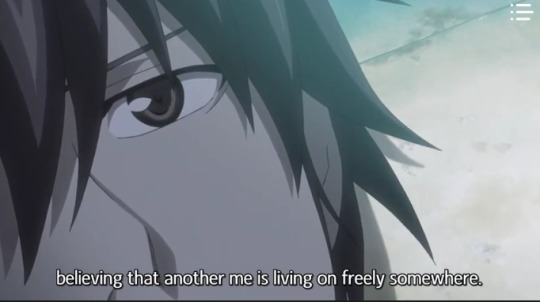
Elen had always assumed that her way of coping was the only one possible, but through Reiji she learns she has other options and starts questioning what she was told and what she had assumed.
The story makes clear that deep down Elen has never lost her most genuine part of herself:
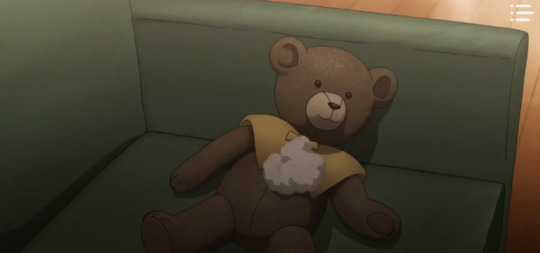
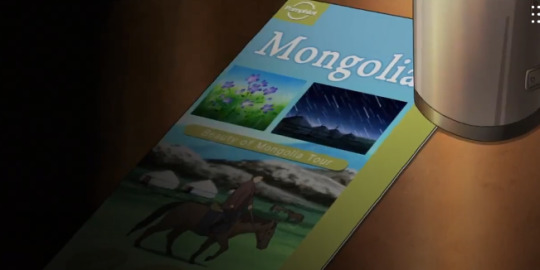
Episode four goes out of its way to establish exactly this.
The episode opens with a very different and overly cheerful Elen who acts in a childish way and has fun going shopping:
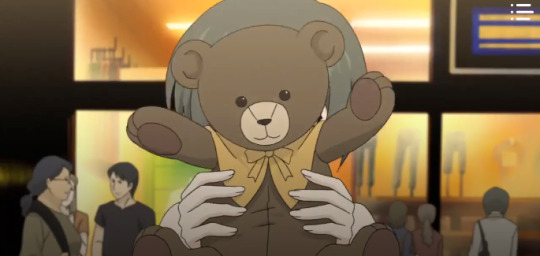
This is soon revealed to be a mask she uses not to give away her true identity. However, this mask gives us some information about her real self as well.
First of all, Elen uses this cheerful personality whenever she needs to move around in a public place or when she has to interact with regular people. She uses this persona both in the first act and in the third act. This is interesting. After all, Elen could just take on different personas instead of sticking to a single one. The fact that she doesn’t may very well symbolize that this personality tells us something about her.
All in all it might simply convey the fact that Elen is deep down very child-like. She has been taken by Scythe when she was younger than Reiji and so when her identity had still to properly develop. Scythe manipulated her and took her memories away leaving her as a person completely dependent on others like children are. So it is fitting that her “normal” persona is a childish one because that is the stage in which her development was interrupted.
At the same time, the episode plays with the viewer’s perspective of Elen. Her having fun with the teddy bear is immediately contradicted by her breaking it to retrieve the data and when she later on is asked if she is interested in the touristic depliants she coldly rejects the assumption.
However, by the end of the episode we are shown that she kept both the Teddy Bear and the depliant.
Both are symbolic objects.
-The teddy bear represents her childish self and it is symbolically broken because she herself has been broken when she was a child. Let’s also highlight that in act three where she had the chance to experience a healthier style of life for some months she has a teddy bear on her school bag.
-The depliant is representative of her home town aka Mongolia which will be the end of her journey where she finally finds herself. The fact that she has it since episode 4 clearly shows that deep down Elen had always known from where she came from.
Then why did she not try to leave before Reiji’s arrival?
The answer is this:
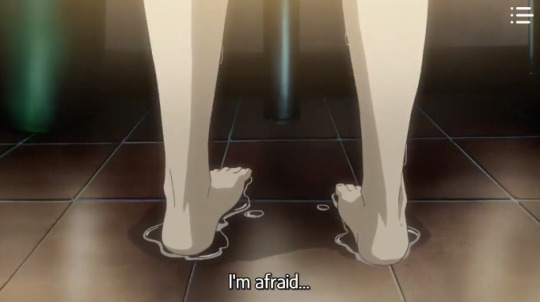
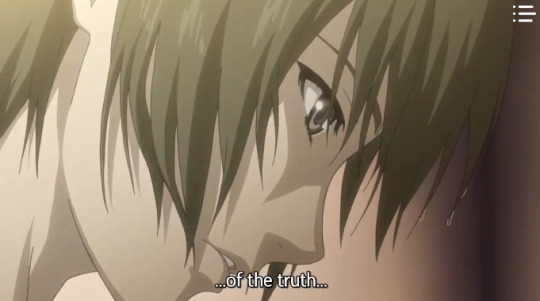
In order to grow up Elen needs to face who she truly is. This means that she gets to finally feel complete, but at the same time she has to leave behind a coping mechanism which makes her feel safe and to accept what she has done.
This is something she can’t do alone and needs Reiji’s help in order to succeed.
Reiji too needs Elen and this is made clear at the end of the first act.
As previously stated, Claudia is manipulating Reiji to have him grow apart from Scythe and Elen, so that he can work as her own Phantom. She tells Reiji she is leaving the final choice to him, but she doesn’t really plan to as her orchestrating the whole mess with Scythe proves.
In the end she gives Reiji a choice. He can either go back to Japan or work for her. She knows fully well Reiji will not probably be able to go back to his normal life and the chaos of the situation might very easily push him towards her side. However, Reiji takes a third option:
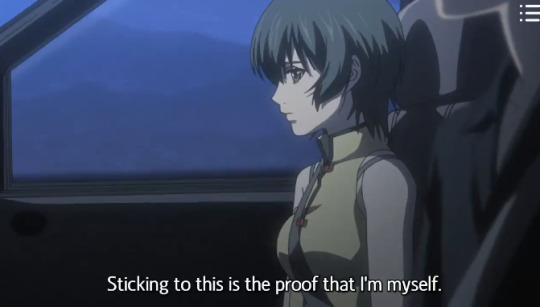
He wanst to protect Elen and to help her to become a complete person. This is the path Reiji chooses in order to remain himself despite his new identity as an assassin.
In other words, Reiji needs Elen just like Elen needs him, but in a different way.
We can say that they develop a relationship which has shades of codependency since one can’t properly function without the other.
Without Reiji Elen can’t free herself from Scythe, while without Elen Reiji completely loses himself and spirals in his new role as phantom until he meets Cal who saves him.
The end of the second act perfectly shows what their relationship is about.
Elen is still unable to rebel against Scythe and keeps fighting Reiji, but stops when Reiji takes away her mask which is symbolic of him seeing her as a person.
At the same time Reiji is ready to die. He thinks Cal has died because of him and that he has become a monster and prefers to die rather than keep living in the criminal world where people use and betray each other. However, Elen saves him:


Elen’s two scars were both made by Reiji. Reiji is fixated with the second one he gave her when he accidentally shot her. That scar represents Reiji’s guilt and his crimes and it is the only part of himself he can currently see. However, Elen reveals that it is her other scar the one she cares about aka the one he gave her when he saved her. She claims that that scar is the proof of her existence and why she keeps fighting.
In this way they save each other. Reiji is given a new reason to live, while Elen is taken away from Scythe for good.
The third act shows that they keep learning opposite things from each other:


And it is also interesting that in terms of proactiveness and passiveness they start to exchange roles. As a matter of fact in the third act Elen is far more active than Reiji, while it used to be the other way around, especially in the first act when they had to run away.
This is also something that Scythe’s behaviour highlights:
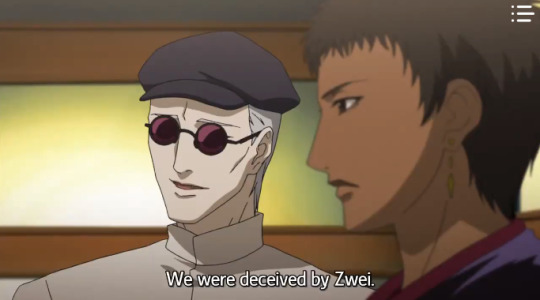
He keeps assuming that the one taking action against him is Reiji, but it is not him the one who has come up with counter-measures against Inferno, but Elen who proves herself to be perfectly able to read Scythe’s way of thinking.
This is illustrated also in their final showdown.
Scythe thinks that thanks to having integrated Claudia’s philosophy with his own he has finally been able to create a group of perfect specimen. However, Elen proves him wrong and states that these new experiments are exactly like her and that Scythe has not grown:
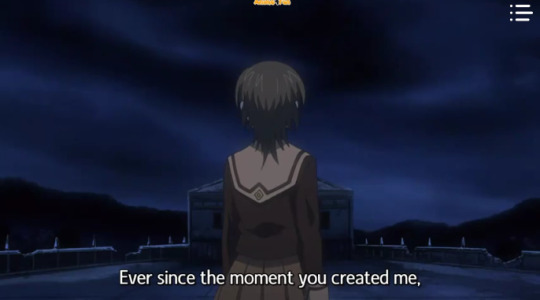

While she has:

Her reasons for killing Scythe are also interesting:

She says that she is killing him because he hurt Reiji which is surprising because she too has been hurt by Scythe and she has been abused by him far longer than Reiji. However, I think that this line highlights once again that Elen really sees Reiji as a better version of herself. Even if she has grown Elen still struggles to see herself as a person and so, instead of telling Scythe that he has hurt her, she tells him that he has hurt Reiji, but she is really speaking of herself in the scene.
In other words both Elen and Reiji are able to go back to be people because of each other. This is true especially for Elen whose whole arc is about this. What is more, they are clearly presented as two sides of the same coin to the point that their two arcs and characters appear as clearly linked:
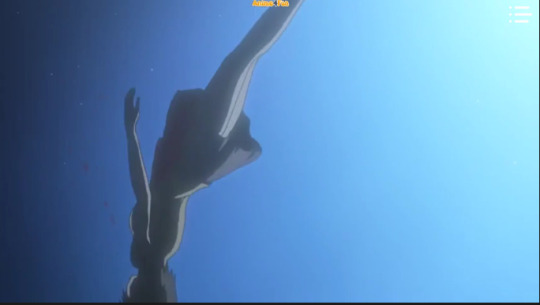

When Elen “dies” at the end of the first act, so does Reiji and he has does so in a way similar to hers.
At the same time, the first act also plays with the dream/flashback in episode 7.
The sequence starts with Elen remembering the day she met Reiji and it ends with Reiji waking up from a dream where he supposedly has remembered a part of his past. In short, it is not clear who is the one really having the flashback and it is really not important because this just cements the idea that Elen and Reiji are complementary and really two “versions” of the same entity without a personhood who is the phantom.
1) It is precisely because of this link that symbolically Elen dies when Reiji does.
When one considers it from a realistic in-universe stand-point it has probably to do with the afore-mentioned codependency. The two of them have been utterly devastated by their experiences and would need time to properly heal, but they are denied it. Because of it, when Reiji dies Elen takes her own life.
However, I think that there are different reading levels to the ending which have to do with different themes the story wants to convey.
As mentioned above the series depics the criminal world as a horrible place from which it is basically impossible to escape. This is why we are shown different people trying to live in this world with different methods and objectives. Claudia wants power and believes that one can only live one’s own life to the fullest by taking risks. Scythe wants knowledge and believes that he can pursue it in the criminal world. Lizzie wants to apply some sort of ethics to her killing, but she realizes that her gun has become too heavy for her and prefers to die rather than to kill a person she cares for again. Cal and Mio are both asked to choose if they want to enter the criminal world to be with a person they care about or not. Cal does so and dies, while Mio doesn’t and survives. The different outcomes of their stories have also to do with their different social standings. Mio is privileged and loved and has her family’s support when she needs it, while Cal is a runaway child who is left alone by everybody she cares for. For her entering the criminal world has also to do with her gaining strength.
What is important is that all these characters die. As I stated above the only prominent characters who survive by the end of the series are Mr McGuire and Mio. This is not by chance because they represent two opposite extremes thematically speaking.
Mr McGuire is literally the devil who rules Inferno as all the symbolism associated to him proves. He is symbolically the underworld itself and this is why he survives the ending and has supposedly Reiji killed. It is because the underworld is very difficult to destroy.
Mio is the normal person whose life is not involved in the underworld. The fact that she is secretly a mafia princess without her knowing might very well be symbolic of how even the parts of society which seems uninvolved with the criminal world are actually still intertwined with it even if they ignore it. Mio has come to an understanding of it by the end of the series and chooses to keep living her life in the normal world.
In other words, if the series wants to give this depiction of the world of criminality as a world which is unescapable at least physically, then it makes sense that Reiji and Elen, just like Cal, can’t survive the ending. However, they are given, just like Cal, an ending where they can stop being phantoms and become someone. This is emphasized by the last episode being called Elen. The title highlights how the whole story is about the original phantom aka Ein becoming Elen.
This is what the last scene is about. Even the fact that Elen kills herself, as sad as it is, it is something she had failed to do early on in the series:


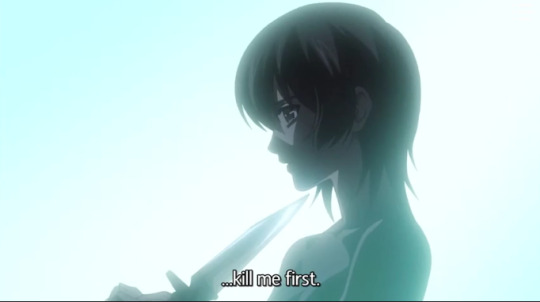
In the end Elen chooses to die as herself and in her hometown.
This is at least one reading that can be done. Either way, several are possible in my opinion.
This is an analysis of Elen and Reiji’s relationships which is one of my favourites. I also love the one between Cal and Reiji, but I chose the first one because it let me talk about the series more generally.
When it comes to my favourite episodes, I love the last two ones where the major conflicts are settled and where there are many of my favourite moments.
I also love episode 6 because of how well it is structured and powerful thematically despite it being tragic.
As far as my favourite quote is concerned, I actually love this one by Claudia:
Like you say, we may be forcing this lifestyle upon you, but you are not a slave. Even you possess a freedom…Speed…Even in a set course, as long as you desire and work for it, you can accelerate towards any goal. (…) How you run through it is up to you. Don’t ever think of yourself as a slave again. As long as you have that thought in mind, you are granting victory to those who belittle you.
I think this quote is very meaningful when it comes to Claudia’s character and also to the series general themes because it emphasizes the necessity of facing even an unfair life and to do the best you can of it. It is just that what Claudia wants to do with hers is something completely different from what Reiji wants.
Thank you for this ask!
#phantom: requiem for the phantom#requiem for the phantom#phantom: requiem for the phantom meta#azuma reiji#elen#ein#zwei#my meta#asksfullofsugar#anonymous#suicide: tw
18 notes
·
View notes
Note
Could you maybe make a post with some of the most inspiring Daredevil pages? Stuff like him overcoming the Purple Man making him more depressed and hopeless in Waid's run, or the "I am Daredevil, and I am not Afraid." page from Soule's run. Those kind of pages always help me when I'm feeling down, it would be cool to see more in that vein.
I love this request, and yes, I can definitely do that! I draw a lot of inspiration from Daredevil too (and superhero comics in general; that’s one of the purposes of the genre, in my experience), and refusing to give up when everything is falling apart is one of Matt’s trademark moves. Here are a few of my favorite moments– and I’m including the ones you mentioned, since I love them and want to make sure other people have seen them too.
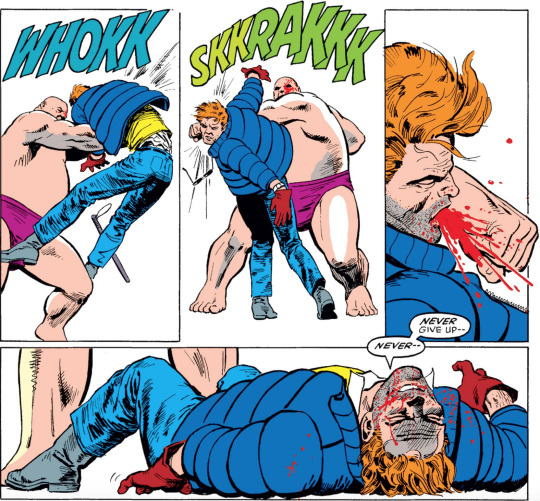
[ID: The Kingpin is brutally beating up Matt, who is in civvies. Matt falls on his back, his face bloody.]
Matt: “Never give up– never–”
Let’s start with a classic:

[ID: Daredevil is fighting Namor. He tries electrocuting him, but the blast knocks him to the ground. As Namor walks away, Daredevil reaches out and grabs his ankle before passing out.]
Namor: “This is madness!! Does your own life mean nothing to you!?? Have you no sense of fear??”
Matt: “Sure! But I seem to have carelessly misplaced it somewhere! Now, just stand there for a second, fella– I want to try something!”
Caption: “Taking one last desperate gamble, Daredevil joins the two live wires, hoping to stagger his super-human foe! […] But, once again, the power of the Sub-Mariner is greater than any could suppose, and it is he who recovers first– while the Man Without Fear, despite his insulated gloves– lies weak, and dazed, and helpless…! Yet, how can one measure the limitless courage of a fellow human? Although on the brink of unconsciousness– although racked with pain and fatigue– still the sightless crusader reaches out–!”
Matt: “Come back! You– you mustn’t fight the others–! They’re innocent– mustn’t be harmed– mustn’t–!”
Namor: “[…] I have fought the Fantastic Four, the Avengers, and other super-powered humans, but none has been more courageous than he, the most vulnerable of all! And out of respect to the courage of Daredevil, I shall not injure any humans! I shall fly above the waiting armed forces– and return to the sea where I am supreme!”
Daredevil vol. 1 #7 by Stan Lee and Wally Wood
The issue that introduced the red Daredevil costume also crafted one of the first memorable depictions of Matt’s boundless resilience. Namor the Sub-Mariner comes ashore to sue the human race, and hires Nelson and Murdock to represent him. When the situation goes awry, Namor becomes violent, and Matt tries to subdue him. While he gets thoroughly thrashed in this fight, Matt’s persistence impresses Namor enough to make him leave the human race alone (for now). That image of a nearly-unconscious Daredevil clinging to Namor’s ankle is fairly iconic, with– I feel– good reason.
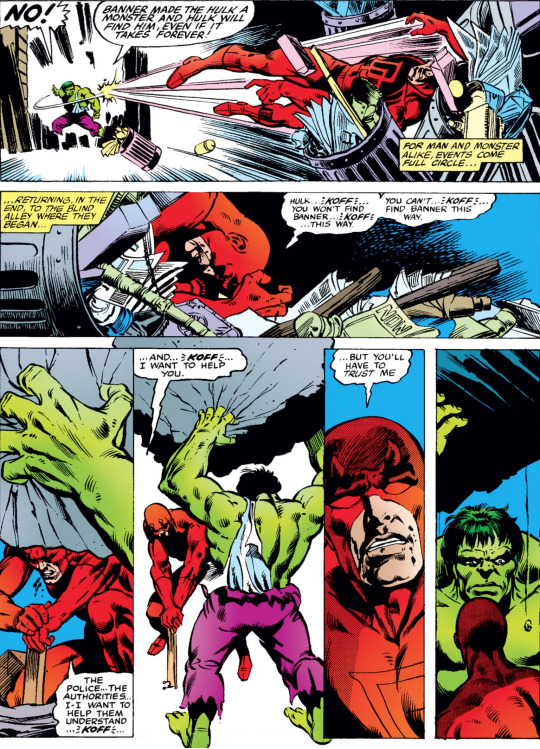
[ID: The Hulk backhands Daredevil a good distance, where he crashes into some trash cans. He is injured and bleeding, but he struggles back to his feet as the Hulk stands over him, deciding whether or not to finish him off.]
Hulk: “NO! Banner made the Hulk a monster and Hulk will find him, even if it takes forever!”
Matt: “Hulk… *koff*… you won’t find Banner… *koff*… this way. You can’t… *koff*… find Banner this way. The police… the authorities.. I-I want to help them understand… *koff*… and… *koff* … I want to help you. …But you’ll have to trust me.”
Daredevil vol. 1 #163 by Roger McKenzie, Frank Miller, and Glynis Wein
This is, thematically, a very similar situation to the first scene. The Hulk goes on a rampage and Matt tries to stop him. Just as in the Namor situation, Matt loses this fight– he is nearly beaten to death, and is confined to a hospital bed for quite a while afterward– but his courage breaks through the Hulk’s rage enough to calm him down. This is a recurring theme in their friendship. Matt first meets Bruce Banner when he is hired to represent the Hulk in court, and from the beginning, Matt has been vocal in his support of Bruce and sympathy for the Hulk. Despite the danger, Matt never hesitates to put himself within smashing distance of the Hulk for the sake of helping him.
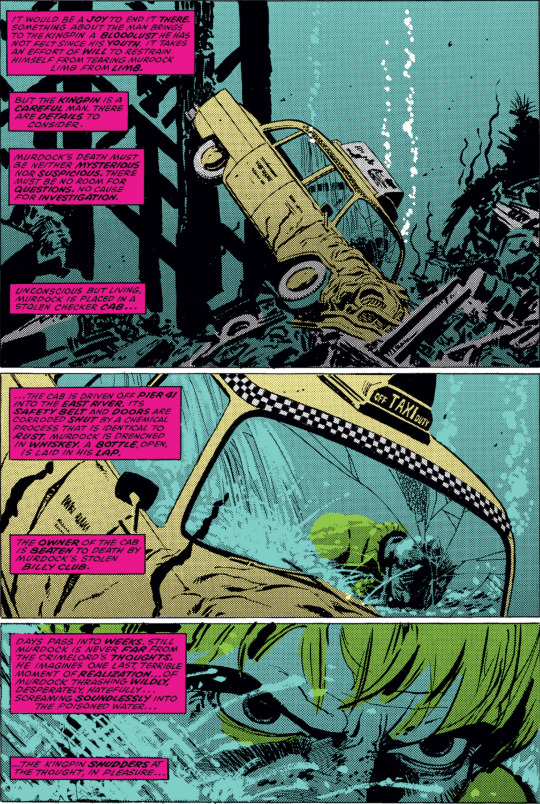

[ID: A taxi is resting at the bottom of a river with its hood bashed in. Matt Murdock is unconscious in the front seat. We see a close-up of his eyes as they open in a defiant glare. The next few panels show the Kingpin standing at a window looking out, and photos of the cab after it has been pulled out of the river.]
Caption: “Unconscious but living, Murdock is placed in a stolen checker cab… The cab is driven off Pier 41 into the East River. Its safety belt and doors are corroded shut by a chemical process that is identical to rust. Murdock is drenched in whiskey. A bottle, open, is laid in his lap. The owner of the cab is beaten to death by Murdock’s stolen billy club. Days pass into weeks. Still Murdock is never far from the crimelord’s thoughts. He imagines one last, terrible moment of realization… of Murdock thrashing wildly, desperately, hatefully… screaming soundlessly into the poisoned water… The Kingpin shudders at the thought, in pleasure… The world seems flooded with sunlight. Daily business becomes a joyous, childlike game. He has disgraced, destroyed and murdered the only good man he has ever known. This is his triumph of the spirit.
“At last the cab is discovered. There is blood, and bloody evidence of a struggle. There is a shattered windshield… a safety belt, severed by the windshield’s glass and what must have been a hideous effort of will. There is no corpse.”
Daredevil vol. 1 #228 by Frank Miller, David Mazzucchelli, and R. Lewis
This is, of course, from the famous “Born Again” arc, and I had a hard time choosing a scene, since the whole story is essentially a seven-issue-long depiction of Matt being knocked down and then standing back up. (I highly recommend reading it if anyone hasn’t, and I also summarized it here. I also cheated by including another scene at the beginning of this post…). However, the scene above is a turning point and possibly my favorite moment in the whole story. At this point Matt has lost it all: his friends, his career, his reputation, his money, and his home. In a fit of desperate, delirious anger, he attacks the Kingpin, who beats him unconscious and then– in the scene above– tries to kill him once and for all. The above issue starts with Matt curled up on a bed in a hotel room, unable to force himself to even move. He seems thoroughly beaten, and the Kingpin assumes the same, which is why he decides to stop toying with his victim and just finish the job. But in spite of all of this, Matt freaking Murdock refuses to die, and he somehow finds the strength to physically fight his way out of this seemingly unsurvivable situation. The fact that we don’t see him do it– that we only get the Kingpin’s reaction and that panel of Matt’s defiant glare after regaining consciousness– makes this act of resilience all the more powerful.

[ID: Daredevil is fighting the Vulture (the Spider-Man villain). Daredevil pins him to the ground and starts punching him in the face.]
Matt: “A while ago, you said I secretly wanted to die. You were wrong. Cowards want to die. I’m no coward. I’m proving it– to you and to myself– by beating you… you– and everything you represent… the death and decay that eat away at a man until he surrenders… the horror that pulls you down into the pit! Well, I’m not the surrendering kind, mister! Got that? I never give up!”
Daredevil vol. 1 #225 by Denny O’Neil, David Mazzucchelli, and Ken Feduniewicz
Matt is not at all a suicidal person (I’ve seen some fans claim otherwise, but he really isn’t), and this scene comes from a rare issue that covers that topic. It takes place shortly after Heather Glenn’s suicide, and it explores how the spectre of her death haunts Matt and Foggy’s lives afterward. In this story, the concept of death is represented by the Vulture, who Matt discovers trying to rob Heather’s grave. Later, he appears at the offices of Nelson and Murdock, which have just gone bankrupt. Upset by this loss, Foggy wanders up to the roof and contemplates his life, at which point he encounters the Vulture. Matt, fearing that Foggy might kill himself, goes up after him in costume and tries to fight the Vulture off. For a moment, during the fight, Matt contemplates whether he actually wants to lose, before returning to his senses and defeating both the Vulture and his own dark thoughts.
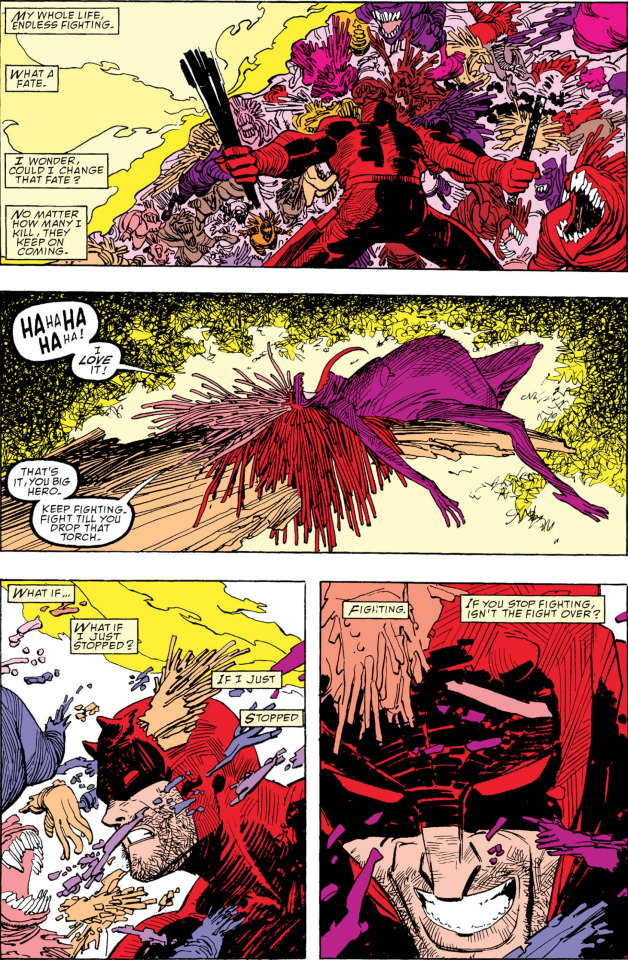
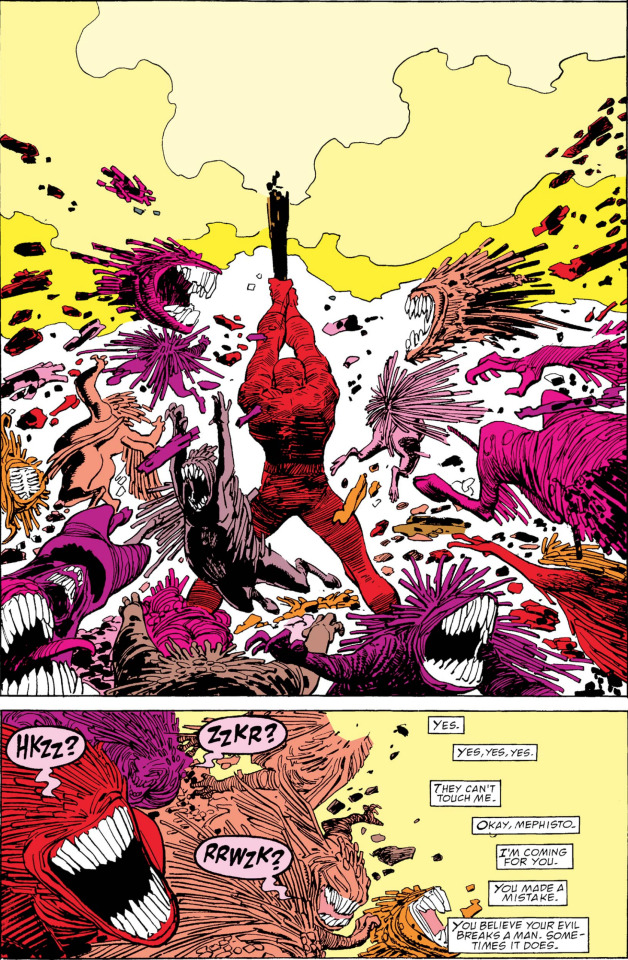
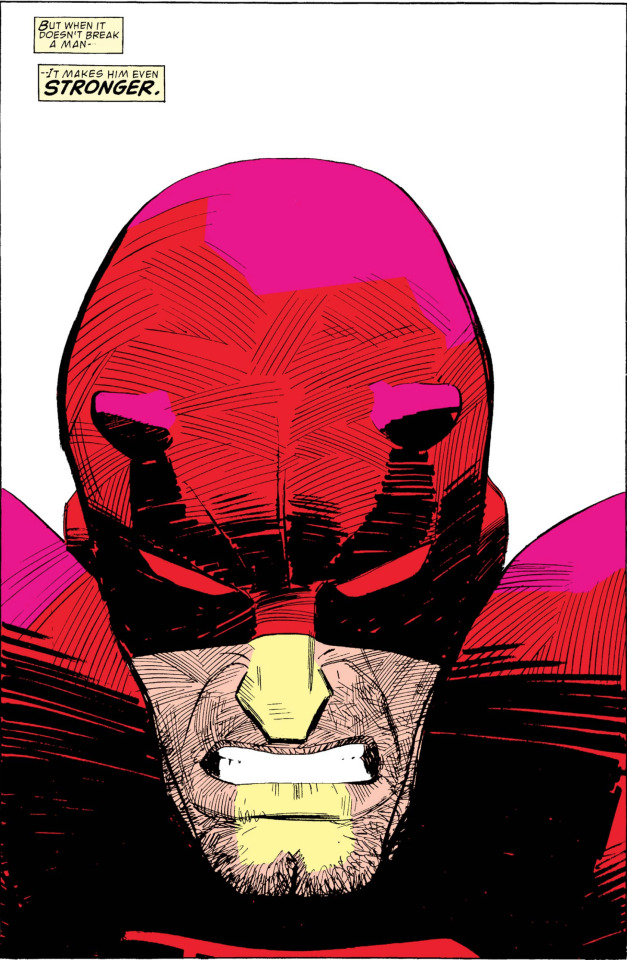
[ID: Daredevil is fighting a huge crowd of grotesque-looking demons while carrying a lit torch. He holds up the torch and the demons scatter.]
Matt: “My whole life, endless fighting. What a fate. I wonder, could I change that fate? No matter how many I kill, they keep on coming.”
Mephisto: “Ha ha ha ha ha! I love it! That’s it, you big hero. Keep fighting. Fight till you drop that torch.”
Matt: “What if… what if I just stopped? If I just stopped fighting. If you stop fighting, isn’t the fight over? Yes. Yes, yes, yes. They can’t touch me. Okay, Mephisto. I’m coming for you. You made a mistake. You believe your evil breaks a man. Sometimes it does. But when it doesn’t break a man– it makes him even stronger.”
Daredevil vol. 1 #281 by Ann Nocenti, John Romita Jr., and Christie Scheele
This is from Matt’s literal trip to Hell in Nocenti’s run (Hell is a cosmic setting in the Marvel universe, and Mephisto is a recurring antagonist, so this isn’t quite as bizarre as it sounds…). While trapped in a seemingly endless wasteland and attacked by hoards of demons, Matt musters enough free will and spirit (as represented by the fire he’s carrying) to not only survive, but to actually challenge Mephisto. It’s great.
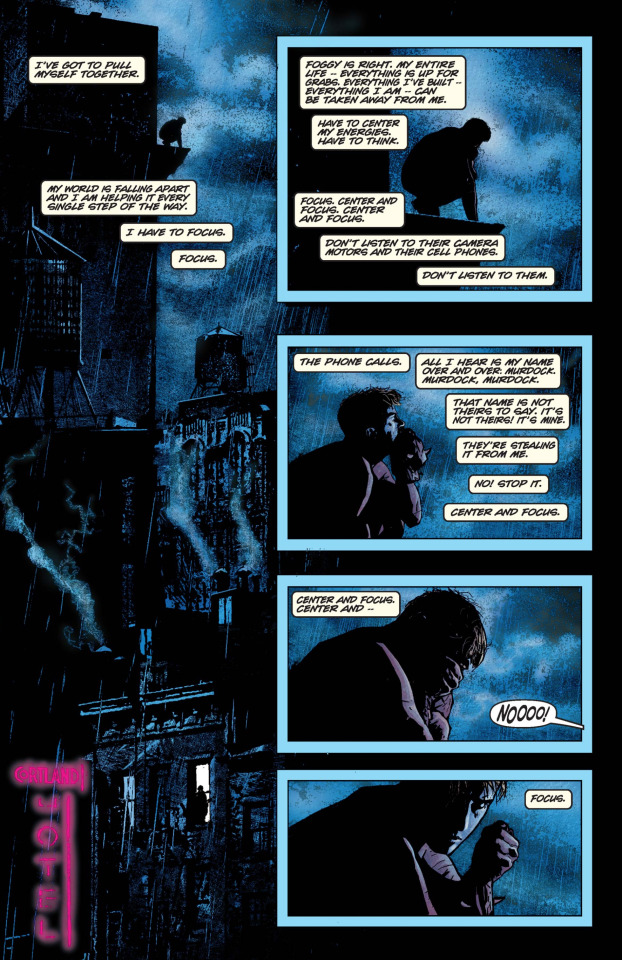
[ID: Matt is crouched on the side of a building at night, in the rain. He is wearing the Daredevil suit but has taken the mask off. He puts his hand to his face in emotional anguish.]
Matt: “I’ve got to pull myself together. My world is falling apart and I am helping it every single step of the way. I have to focus. Focus. Foggy is right. My entire life– everything is up for grabs. Everything I’ve built– everything I am– can be taken away from me. Have to center my energies. Have to think. Focus. Center and focus. Center and focus. Don’t listen to their camera motors and their cell phones. Don’t listen to them. The phone calls. All I hear is my name over and over: Murdock. Murdock, Murdock. That name is not theirs to say. It’s not theirs! It’s mine. They’re stealing it from me. No! Stop it. Center and focus. Center and focus. Center and–”
Mugging victim (off-panel): Noooo!”
Matt: “Focus.”
Daredevil vol. 2 #35 by Brian Michael Bendis, Alex Maleev, and Matt Hollingsworth
I love this little moment from Bendis’s run. It’s small and subdued, but highly moving in the context of what Matt is dealing with in this story. His identity has been made public, there are crowds of reporters camped outside his home, his entire life is at risk of falling apart, but he takes this second to pause, think, and regain some sense of control.

[ID: Matt stands up and prepares to fight. He is armed with two tonfa, and is wearing black clothes reminiscent of his Man Without Fear costume, but without a mask. His head is bandaged.]
Matt: “You think you can… turn me into a blubbering wreck… by preying on my fears… but I’ve already faced them– and come out the other side! You understand me, Calavera? I know what I am… who I am… and I am not afraid!”
Daredevil: Reborn #4 by Andy Diggle, Davide Gianfelice, and Matt Hollingsworth
The Reborn mini-series follows Matt’s attempt at emotional recovery in the aftermath of “Shadowland”. Having quite literally lost his identity and had his spirit broken by getting possessed by a demon, he goes out west and, through helping right some wrongs in a small town in New Mexico, he reaffirms his sense of self.
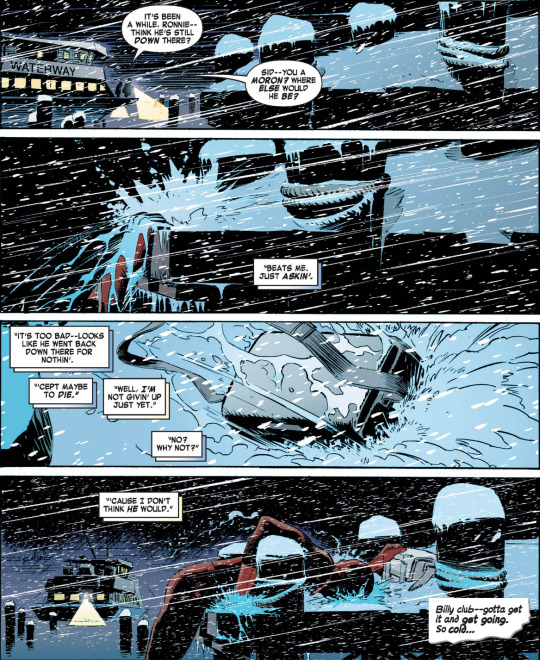
[ID: A stormy winter night. Ferry pilots (Sid and Ronnie, off-panel) are waiting for Daredevil to resurface from the river. As their ferry moves away, Daredevil hauls himself out of the freezing water and onto a dock.]
Sid: “It’s been a while, Ronnie– think he’s still down there?”
Ronnie: “Sid– you a moron? Where else would he be?”
Sid: “Beats me. Just askin’. It’s too bad– looks like he went back down there for nothin’. ‘Cept maybe to die.”
Ronnie: “Well, I’m not givin’ up just yet.”
Sid: “No? Why not?”
Ronnie: “’Cause I don’t think he would.”
Daredevil: Dark Nights #2 by Lee Weeks and Lee Loughridge
The first Dark Nights story is a celebration of Matt’s willpower, as he travels through a blizzard to deliver a heart transplant to a dying little girl. I particularly love this scene, in which Matt dives into the river to rescue the heart and the pilots transporting it from their crashed helicopter, and despite the cold and his exhaustion, he powers through and survives the experience.

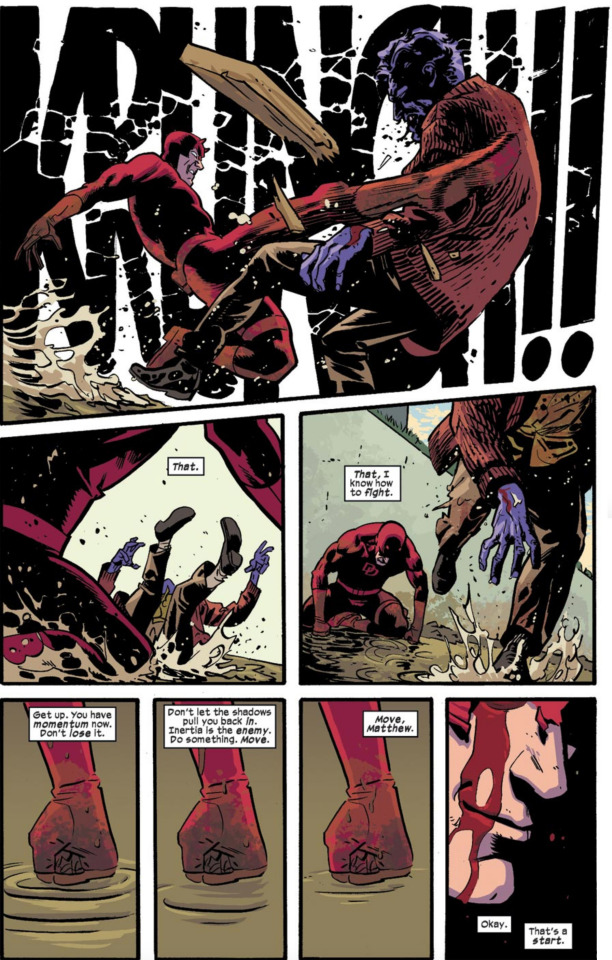
[ID: Daredevil is bleeding and horribly injured, and crouched in the mud under a bridge. The Purple Man is standing above him, about to hit him with a plank of wood.]
Purple Man: “Shouldn’t you be angry? Shouldn’t you put up a struggle?”
Matt (caption): “But that’s how far down the pit I’ve fallen. I can’t even respond to his orders.
Purple Man: “Come on. This is too easy. Don’t rob me of a victory I’ve waited years for.”
Matt (caption): “All I can do is sink into the blackness. I can’t feel pain. I can’t move because I have nothing to push against. Nothing.”
Purple Man: “Show me some fear.”
[ID: Daredevil kicks the Purple Man, then falls back to his knees. ]
Matt (caption): “That. That, I know how to fight. Get up. You have momentum now. Don’t lose it. Don’t let the shadows pull you back in. Inertia is the enemy. Do something. Move. Move, Matthew.”
Daredevil vol. 4 #10 by Mark Waid, Chris Samnee, and Matt Wilson
I’m glad you mentioned this scene because it’s one of my favorites too, as is this story arc as a whole. Waid’s depiction of depression is visceral and heartrending because it’s something he himself suffers from, and that realism makes Matt’s struggle to move forward and fight against his despair all the more impactful.
As an extension of the above moment, Matt’s decision to talk with Kirsten at the end of the issue (which I discussed at length here) is also breathtaking.
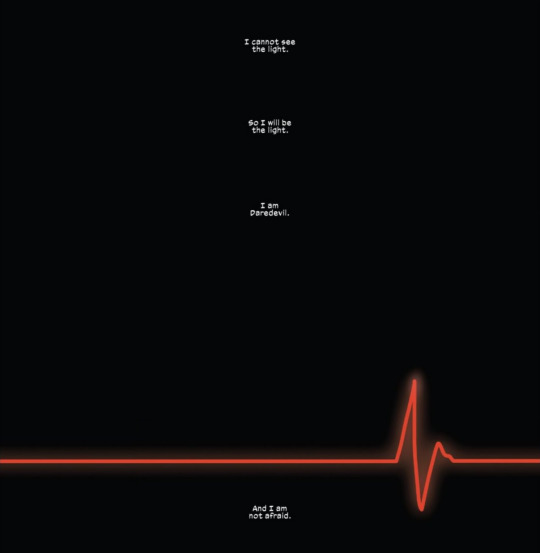
[ID: A black page with a red heart monitor readout at the bottom. It flatlines, then spikes once.]
Matt (caption): “I cannot see the light. So I will be the light. I am Daredevil. And I am not afraid.”
Daredevil vol. 5 #612 by Charles Soule and Phil Noto
And this moment– there’s nothing more badass than Matt literally willing himself back to life! “I am Daredevil. And I am not afraid” is a refrain that is repeated throughout Soule’s run, which is a neat way of tying his run together and emphasizing Matt’s relentless determination.
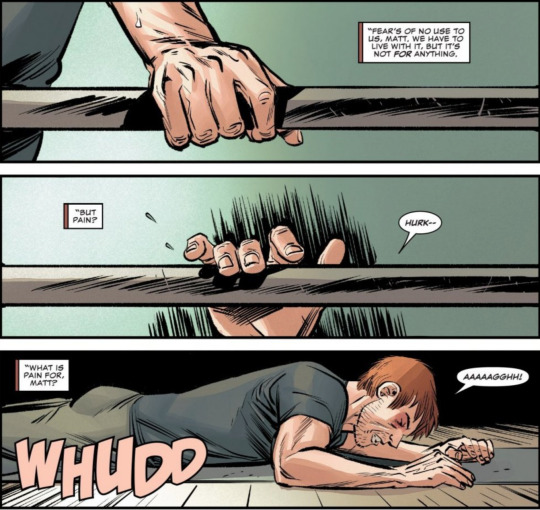
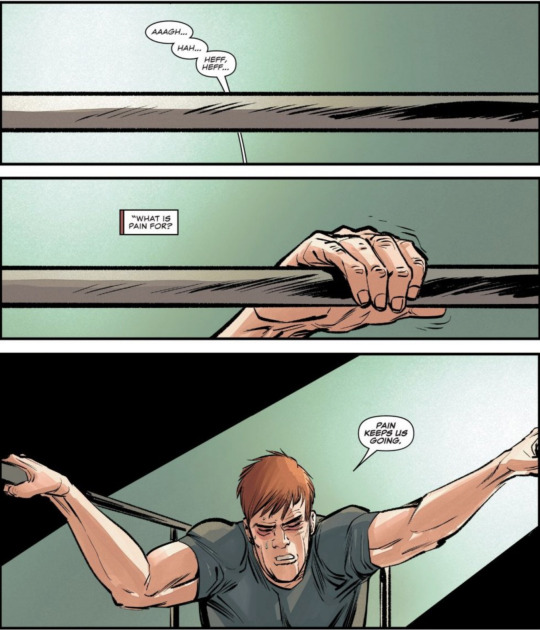
[ID: Matt is alone in a gym, struggling to walk between two parallel bars. He falls, then, with a huge effort, pulls himself back up.]
Jack (off-panel): “Fear’s of no use to us, Matt. We have to live with it, but it’s not for anything. But pain? What’s pain for, Matt? What’s pain for?”
Matt: “Pain keeps us going.”
Man Without Fear vol. 2 #5 by Jed MacKay, Danilo Beyruth, and Andres Mossa
The new Man Without Fear was another great recovery story, and gave us this really great moment when Matt, after suffering through the physical and emotional destruction of being hit by a truck, finally regains his fighting spirit.
I also wanted to include a few scenes of other people being inspired by Matt’s courage and resilience, because there are some great ones. Here’s one of my favorites, from Waid’s run:

[ID: Foggy is sitting in a circle with a group of fellow cancer patients. They are all wearing Daredevil shirts.]
Foggy: “Ah, excellent. You all dressed for the occasion. I’ll be straight up with you folks. I have a friend. He’s probably the bravest man I’ve ever met. And no matter how much I beg him to teach me to be like him… in the whole time I’ve known him, I’ve learned only one thing about fearlessness: it’s contagious.”
Daredevil vol. 3 #31 by Mark Waid, Chris Samnee, and Javier Rodriguez
I love this aspect of Foggy’s cancer plotline– the fact that Foggy uses Matt as a source of inspiration for facing his own fear. These two have always been emotional anchors for each other, providing moral support and guidance in difficult times, and that’s part of what makes their friendship so powerful. Here, Foggy is largely on his own. Matt can’t punch cancer, and Foggy doesn’t even tell him about the symptoms at first. But from the very beginning, Foggy latches onto Matt’s fearlessness as a way of fending off his own terror about the diagnosis. As I said at the beginning of the post, part of the purpose of superhero stories is to serve as inspiration for their readers to be kind and courageous in their own lives, and it’s wonderful when characters within those stories are impacted in that same way by the superheroes around them. To take this concept one meta step further, Foggy’s cancer story– the whole thing, including his drawing strength from his best friend– is in itself a hero story for readers who may be going through similar experiences.

[ID: Flashback panels colored in black and white with hints of red. Matt (in civvies) is attacked by a group of ninjas on a city street. He fights them while Foggy runs and hides around a corner.]
Foggy (caption): “When you were around, it was different. The fear wasn’t so real. I was still freaked whenever anything happened… my nerves were a car wreck… but even as I was sweating bullets, I somehow knew I was safe. Because of you.”
Daredevil vol. 2 #88 by Ed Brubaker, Michael Lark, David Aja, and Frank D’Armata
…And another great Foggy and Matt scene, this one from “The Secret Life of Foggy Nelson”, one of my favorite issues of Brubaker’s run. Foggy has been separated from Matt against his will, and in his isolation and fear, he reflects on their friendship and draws strength from Matt’s example.

[ID: Luke Cage is sitting comfortably in a chair, legs crossed, directly addressing the reader.]
Luke: “Daredevil. I know him pretty well, actually. Well, as well as he lets anyone know him. End of the day, without question, he’s one of the best. Ever. I’m not going to get into who he is and how he became who he became. And I know there are a lot of people who think they know all there is to know about Daredevil and all of his secrets. But I can tell you from personal experience that the information that’s out there about him is pretty much crap. Let’s just leave it at that. All you need to know about Daredevil is that this man has sacrificed everything to try to make this city safer. He has lost more and suffered more for his dedication to you than, well, anybody I know. And I know some people who’ve suffered and lost. He ain’t the strongest of us, and he ain’t the flashiest… but Daredevil cannot be brought down. It cannot happen.”
New Avengers vol. 2 #16 by Brian Michael Bendis, Mike Deodato, and Rain Beredo
And last but not least, here an excerpt from a great speech Luke Cage gives after Matt joins the Avengers. Even other superheroes– all of whom tend toward superhuman resilience– are impressed by Matt.
120 notes
·
View notes
Text
Writer Notes: The Wicked + the Divine 40
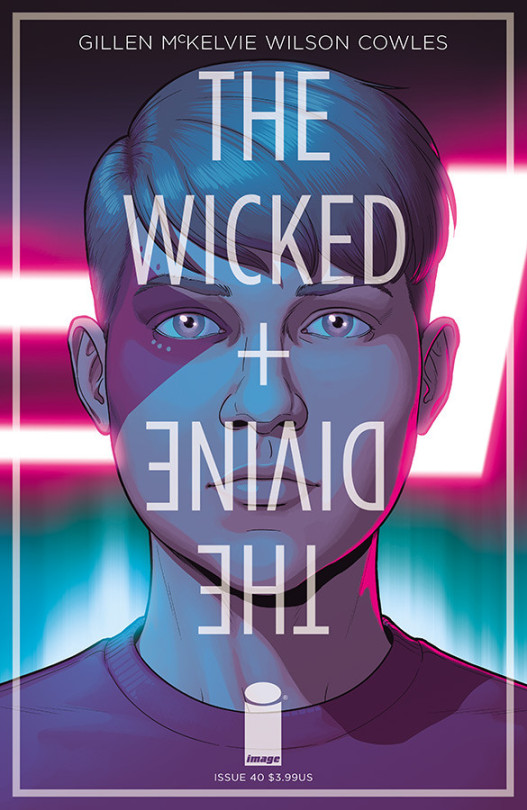
Spoilers, obv.
The first issue of "Okay." I've known for quite some time that it was likely the final arc would use the word "Okay" in some way. The unpacking phrase "It's going to be okay" has been a backbone of the series. Due to the first year on the book, that's been a loaded phrase, all the way through.
But when signing a first volume of the book, I've added the dedication "It's going to be okay." There's lots to unpack in that, and I suspect I'll wait until later in this arc to say any more. But knowing that eventually we'd like have an arc called "Okay" was definitely part of doing it.
The quotation marks are key. It's a move I've done a few times in my career, in terms of showing it's a story that wants to highlight something, and raise awareness that the word should be approached with conscious consideration. This is a choice. I want you to know it's a choice. Let's talk about what that actually means anyway, right?
It's a technique I first lifted from Bowie's "Heroes". Which, of course, is doubly appropriate to use it at the end of WicDiv.
We knew they'd be a gap between the end of Mothering Invention and the start of this. The remaining five issues of the arc were tightly plotted, but in the document, this is the one which I left a lot open. I knew what I wanted to be, and it was a chance of finding an execution to make it work. It was a last chance to do a big concept issue.
(Which isn't to say there isn't conceptual stuff elsewhere in the arc. There just isn't a whole issue of it.)
This is something that I've been trying to do since issue 6. As in, a purely fan-centric issue of mainly talking heads. Every time, it's had to be cut for space. The talking heads shots of realistic footage, showing a lot of fans views on the matter. You get ghosts of it – any time Beth turns up, you get some, basically, but all of those moments could have been issues in another version of WicDiv.
(The one we won't be doing is the whole issue of literal talking heads. As in, Tara, Lucifer and Inanna just telling stories. That's fun, but we just don't have the time, and when I realised I had to stop them talking, it was definitely out. Oh, Minerva. You spoil everything.)
Equally, WicDiv's a book with two poles – the modern fan pop cultural part and the mythological grandeur. We swing one way or another, and it's easy for the latter to mug the former. I suspect that's because that's the easier stuff. Especially as Laura has gone down her hole, she's been incapable of seeing the good parts of fandom. An issue of that before the end, seemed necessary.
(Equally, with where it goes. Like, we start with Laura as a fan, and end with her on stage, saving people. The Bowie Saved More People Than Batman of WicDiv. It's a book about cycles, and ever more so here.)
So! The other side is this apocalyptic final scheme, and give a perspective on that – the necessary plot. Equally, keeping Laura off stage as long as possible.
So we end up with this.
I knew wanting to pick up and run with minor characters in WicDiv was something I wanted to do, and merging it with a disaster rapidly led to something else – this is clearly an inverted Watchmen 11. There, they gather the supporting cast together in the b-plot and then with a I-did-it-35-minutes-ago kill them all. We flip that. We imply everyone we're watching is dead, reintroduce the whole cast and then have Laura save them.
Suffice to say, formally, this was tricky.
Jamie and Matt's cover:
Meet Tom. We surveyed the whole supporting cast and picked someone who was present enough in a scene to be likely to be remembered but minor enough to be a surprise. In the end, there were less options... and the kid who asks Persephone about what to call her obviously has some strong thematic elements. She told him something. What did he make of it? It also gave a supporting cast of friends.
It's fun doing a cover like this and people going "who the hell is he?"
I wish he wasn't white and male – if I realised I was definitely going to use him in issue 24, I'd have likely have suggested otherwise. But, on the other hand, there is a point that white male guys should have heroes who aren't white male guys. So maybe I'm okay with it. Comics!
Claire Roe's Cover Well, this is monstrous. You do get the image of Minerva, like she's in Home Alone, trying to smuggle skulls. Just some great images here.
Ray Fawkes' Cover
For the Heroes Inititative Charity. The theme was "Giving" which immediately jumped to a "Lucifer giving an apple." Giving is very loaded for us. Ray is amazing – he's been an incredible support throughout all of WicDiv, and we love him. Go buy his books. My favourite is THE PEOPLE INSIDE, but for something more genre, the UNDERWINTER books are fascinating, horror. UNDERWINTER: SYMPHONY is the adult gothic sister of Wicdiv, if you squint.
IFC
Flipping "Ascended Fangirl" into "Descended God" was sitting in the script for this issue before anything else.
Page 3
Black page with white text is something that's come to the fore in the last year of WicDiv. In here, the exact word choice was key. While this feels like a documentary in terms of how it arranges information, the text doesn't tell you that. It tells you it's just footage. This means that it's not necessarily an in-world document.
Page 4-5
Working out the exact panel dimensions was a nightmare, and led to a couple of rewrites to move some pages from eight panel to a more accurate six panel. You can also see Jamie start to wrestle with the unique horror of drawing stuff that is slightly distorted, choosing angles which are less traditionally interesting and so on.
Unboxing videos are a fascinating phenomena. It's fun to see culture happen which I fundamentally don't get on an emotional level. That's what culture should throwing up.
The details on the ticket do make me smile, in an awful way.
Yes, the "change the orientation" panel is clearly us showing off. This is the sort of issue I did a lot of doodles for. It also led to a bunch of lettering challenges for Clayton, in working out whether to put balloon tails off-camera to signify the other speaker. In the end, Clayton talked us into the other approach, noting it worked fine in Mister Miracle. Hey, if Tom King does it, I guess it's fine with us.
It's worth noting the way the off-panel speaker is orientated, to ensure you know who they are. See the "Tom" in the dialogue in the second panel, to ensure you know it's Nathan.
"The front row if it kills us" is very us. This issue is a mix of awful tension and strokes of equally awful gallows humour. His smile is also adorable.
Page 6
Sometimes the most beautiful thing in the world is a page of exposition via the medium of power-point. We're all big fans of the 1960s kirby superhero maps, and this is kind of the same thing.
Page 7
This is also a masterclass in a "Naturalism is hard" sort of page layout. The choice of the greys by Matt is really nice too.
Page 8
And back with Tom and friends. Worth noting the planning on this issue – I had this list of scenes, and tried to work how much I can cut between them to create a rhythm, which obviously accelerates the further we go in.
"Shitting them whole"? Nathan is totally right. Tom, you re NASTY.
Trying to get a subplot which fit in the space for them is key. Like, friends navigating a space. That Tom and Nathan are both far from perfect in this is also important. I just realised this is totally an alt-dimension Kohl and Kid-with-knife scene.
Page 9
The greatest tragedy of WicDiv is we never got around to doing the WicDiv calendar with all the dates on. Will we get around to it for Christmas 2019? IT COULD BE POSSIBLE.
The problem in terms of story here is getting the multiple lies – Woden doesn't know what Baal has had him to do, and Baal doesn't know what Minerva is making him do. So trying to set that information up so is clear, while also in a naturalistic fashion is a trick.
We were having LOC CAPs on some of this footage, but decided to cut them all. Only some of them had it, and having it on them all would create a mess. This is the one I regret though – there's one tiny bit of information I'd like to have got in here. C'est la vie.
The colour banding on this is fascinating – the late night recording. Also, Jamie's burn on the calendar is golden.
Page 10
This was another one where the lines were worked hard. What happens BEFORE the image, what happens AFTER the image and all that.
Anyway, some good thinking here Tom.
The chat between the two, in terms of fans-beliefs and minor pieces, and hot takes and their own beliefs. Also re-introducing certain takes.
Page 11
This page is hard. The silent third panel is amazing – what Jamie does with the panning between the two. The caption would have revealed who's filming it – the Sister – but that isn't essential information.
"You soppy twat" is something I'm oddly pleased with getting in. It's a very naturalistic issue, and the tenderness is very real.
There has been a tendency for people to take Baal's fight against the Great Darkness solely to save his family, and understandable why. This scene and what follows shows that no, it's not just that. He actually believes he's saving the world, because if he didn't, he certainly wouldn't fucking do this.
Page 12
And Minerva reveals her side of all this. The little callback to 1373 does make me smile.
The stylistic nature of this is key – Jamie doing the fish-eye, Matt working the blues, giving that night vision creepiness.
Page 13-14
This issue was definitely me trying to look for ways for Jamie to not just draw a million crowd-scenes. The first two is definitely me lampshading it.
In passing, this two pages is basically all of Young Avengers in sixteen panels.
The last panel is a thing of love, and definitely inspired by a Glastonbury festival, circa 1998. I'm there alone, as it was one of the infamous wet years, waiting for Nick Cave to come on the main stage. A highly high and/or drunk guy stops beside me, after pushing through the crowd. He's clearly very excited, to the level where a group of younger women start to join in and/or mock him. He is very entertaining.
Nick Cave comes on stage, doing a half-speed From Her To Eternity.
"From her."
"To."
Eternity."
Murmurs Nick.
Our new friend hasn't actually noticed and howls at the top of his lungs...
"FROM HHHHEERRRRR TOOooOOOOOOooOOOOOOoo ETERRNNITYYYY!"
...at at least twice the speed of Nick.
At which point, he's decides he wants to be further front. Turning to the people around him, he suggests we all go forward. "Yeah?" "Yeah!" the girls scream, and immediately they all form a conga and start pushing through the crowd, with him chanting "NICK CAVE ARMY COMING THRUUUUUU!"
I join in, as clearly I want to follow this journey. It leads us to the front, where I believe I stay for the rest of the night?
On the way to the front I step on the shoe of a guy who, a year or two later, invites me to storm the stage on a Saturday morning TV show. I turn it down, and then he only goes and does it anyway.
Pop music!
Anyway, that panel is for that guy, wherever he is.
Page 15
Okay, I can't hold off crowd scenes forever. Sorry Jamie, but not too sorry, as this looks amazing. Matt pushing the controls completely into the red, with the distortions going on. This is everything. It's also the panel where the conceit of watching television is lowest – the panel shape is wrong, and it's unlikely a camera would be on Baal's mum on the top of the pillar... but they are deniably so, I suspect.
I look at this page and smile. This is some comics. Nice work, us.
Page 16-17-18-19
And we're off. This is... oh, god. There were diagrams for this, in terms of working out panel flow. There's multiple routes through the two pages, which cascade together. The backbone is the "Baal" story arc, across the diagonal on both spreads.
The second panel reads across both pages – notice the orange band leading you to the right – where a talking head explains what's actually going on at the gig, and why everyone is being immersed.
When you finish this row, you get the presenter giving the context for the remaining talking heads. On the first spread, you get a talking head talking answering the question... and then placing them in the crowd. When that ideas's been set up, in the second spread we have multiple talking heads answering it, which all gather around a single group shot showing them all by each other, unknowing. And then there's Tom, and his friends, mixed in, with Tom's own answer stumbling towards his own truth, and his friends together, joined in this.
I'm getting excited here, clearly, but this is some engineered machine monstrosity, and I love how it collaborates with the reader.
This made it a nightmare for the guided view on Comixology. We contacted them in advance, offering to help a little. In the end, I wrote my suggested route, and they went with it. Moving from a non-linear sequence to a linear sequence clearly changes it somewhat, but I think it keeps a lot of the percussion. So don't blame them, blame me.
Oh – I had a list of people to possibly include in this sequence, and selected from them. There's been some impressive attempts by readers to ID everyone. Clearly, I tried to signal who they were in their dialogue a little. My personal hero is the guy from issue 19 who saw Dionysus before Baph nabbed him. You're a fucking legend too, mate.
Tweaks we did was realising it was three hetero-reading couples on the first page, which was heteronormative. We changed that to avoid it. And, yes, that's Jon's mum.
The one I wished I could get in, but lost, was the guy standing to the right of Laura in Issue one, who jizzed to Amaterasu. His line would have been something like "I hope I enjoy this one as much as that time with Amaterasu!"
This is an awful book, in many ways.
20-21
And just let the awful moment linger. Do it naturally and show it. All that rush and then this. Once more, Matt Wilson for Eisners. The hyperbright is one thing, but the flicker on the aftermath another. And the hint of the giant in there is also carefully worked – it's something we needed there, but also was a small part of it. What was important just imagining all those people dying.
22
Inevitable Total Eclipse Of The Heart reference, the go-to song for ending WicDiv dance parties.
23-24
And then, after all that, we get this moment, building towards that final image of Laura.
Honestly, this got to me when Jamie first sent it to me in a burst into tears way. You've come a long way.
I also like the idea that Laura, before heading out, looked through all her stuff and decided "Yes, Hoop ear-rings are the look for saving 20,000 people."
Next issue is out on Wednesday.
Thanks for reading.
142 notes
·
View notes
Text
A Tribute to Chester: Life, Death, Rebirth, and How He Lives on in Memory
How do you properly memorialize one of your childhood idols? Are you supposed to scream, cry, and gnash your teeth? Or do you put on noise-canceling headphones and block out the ambient noise of the outside world for a while? All of these are difficult questions to answer. I guess that’s why they’re rhetorical. It’s hard to believe that it’s been almost two years since Chester Bennington passed. So in a way, this simple little essay is how I can honor him. It feels nice to write something that isn’t fiction or related to a blog for a change[1]. Let’s see how it goes.
Part Zero: Notes from the Underground
I must confess that I was never a member of the official fan club, the LP Underground. I suppose in retrospect that’s how I could have proven I was a legit fan despite never seeing them live in concert except via live stream. But even then, that was a rare occasion. I do remember a t-shirt I got from Hot Topic when I was 12 or so – it had the faces of all of the guys gathered around the classic script font of the band’s logo.
I don’t remember what happened to it. The last time I remember wearing it was in August 2014. I supposed by then I had outgrown it. But still, buying whatever merch I could and getting all of the CDs and eagerly anticipating the next music video all had to count for something. I knew the names of all the guys, even Mark Wakefield, who was never an official member, and Phoenix Orion (Dave Farrell?), who left before Hybrid Theory but was back in time for Reanimation – more on that later.
But I digress. Let’s get on with the real meat of why we’re here. In terms of structure, I thought it would make the most sense to go album by album, discuss some memories I have associated with each, and attempt to unpack why they remain so important to me even as time has marched on since then. Growing up with the band, as I’m sure many of you did, you might feel a similar connection that you never fully grasped until the night of the tribute show in December 2017.
Part One: Hybrid Theory
#Forfeit the game/Before somebody else/takes you out of the frame and puts your name to shame/Cover up your face, you can’t run the race/the pace is too fast, you just won’t last. [HT Track 4: “Points of Authority”]
Although Hybrid Theory came out in October 2000, I think the first time I heard it was for another month or two after it came out. It’s still one of the most vivid memories I can still recall, the first time “Papercut” blared out of a cd player. I was sitting in the basement at my buddy Andre’s house and we were playing Perfect Dark with our mutual friend Alberto. It was honestly the perfect soundtrack for the game. Here’s what I said back then: “Dude, who is this? This is awesome!”
“It’s Linkin Park.”
Even then I thought the name was cool, the way that they intentional misspelled Lincoln – the rule of cool and all that. Elementary school hadn’t even ended yet, but it was still part of my formative years, musically speaking. Before then, I had never discovered any music on my own – my friends had always shown me. My parents didn’t raise me to enjoy music – I hated classical and most of the “standards” went over my head. My parents were still throwing karaoke parties. My old neighbor John showed me James Brown. That’s how I latched onto my first favorite song of all time “I Feel Good”. Then came Third Eye Blind, another early love of mine. But that’s a story for another time, as is my recollections of Limp Bizkit. This tale is about LP.
I wouldn’t realize it at the time, but Hybrid Theory would continue to be one of the most important albums to be me as I left elementary school and hit middle school. The days of Perfect Dark and WCW/nWo Revenge began to fade[2] as Diablo II and Starcraft emerged. The sound of Chester’s howls and Mike’s swagger along with the rest of the bands driving instrumentals provided a backdrop like you wouldn’t believe. “In the End” stood out in particular, although as middle school came to an end, it became clear that those reasons weren’t ones I wish to discuss here, now. Ask me again another time. It was at the end of middle school (hell, even before) that I confronted the notion of how deeply uncool I was, and probably tangled with imposter syndrome, anxiety, and depression long before I knew what any of those terms meant.
I already knew I was an introvert who was much more inclined to stay inside playing video games, reading, or writing instead of going outside to play street hockey or anything like that. That shouldn’t have meant that I was an easy target for bullying, but hey, it was the 90s and then the early 2000s, so what could you do? LP helped me cope, even if I couldn’t always express my anger in responsible ways.
I think here is a good place to stop and point something out: mental illness has been something that has been immensely important to me – it affects me and I know it damn sure affects my wife and mother in law. I went through a very dark time in my life roughly five years ago that LP also helped me pull out of – but I’ll get to explaining that more in-depth later on. Right now we’re still in the HT era; I just wanted to talk a little bit more about my motivations for writing this piece.[3]
Part Two: Reanimation
#Keep that in mind/ I designed this rhyme/ when I was obsessed with time. [RA Track 3: “Enth E Nd]
Full disclosure: when I first heard Reanimation, I thought it had its moments. But it wasn’t something I could listen to end-to-end and love every single song. Heck, even HT wasn’t like that, since some of the songs had to grow on me. The video with the robots and aliens having a war while the disembodied robot heads of the band sing the remixed version of “Points of Authority” by Jay Gordon of Orgy was definitely awesome, but I don’t know, I had mixed feelings about the album that took years for it to resolve into me think of it as one of the LP’s early era classics that would culminate with Meteora and Live in Texas.
I have a very distinct memory of popping this cd into the car’s stereo while we were out in…Houston? Taiwan? The details are blurry now because it’s been too long. Seventeen years was a long time ago, and 2002 me was simpler, less refined, and yes, much dumber and naïve. On an emotional level, “p5hng me Aw*y” stood out, and even though it wasn’t actually a true Linkin Park song, “It’s Goin’ Down” stood out from this time period too.
Part Three: Meteora
#I’ll never fight again, and this is how it ends…I don’t know what’s worth fighting, or why I have to scream, but now I have some clarity to show you what I mean… [MA Track 9: “Breaking the Habit”]
Meteora is one of those albums I more clearly associate with Diablo II and Starcraft more than any other games. Just something about the overall darkness and broodiness of the album really fit both of those games. Also, this essay project is making me want to go back in time. Not really from a nostalgia standpoint – okay yeah I guess from a nostalgia standpoint. But it was during this era that I really started to enjoy their music videos. Believe it or not, for the longest time, not all of the songs on the album were rated five stars. I used to be stingier with that rating that I am now. It took a while for some of the songs to grow on me, but “Somewhere I Belong”, “Faint”, “Easier to Run”, “Breaking the Habit”. “Nobody’s Listening”, and “Numb” were instant standouts. I’m still not sure what happened to my original copy of this album. The last I checked, I had a burned copy, but not the real deal.
Part Four: Live in Texas
#When I look into your eyes there’s nothing there to see/nothing but my own mistakes staring back at me# [LIT Track 8: P5hng Me A*wy – Live]
Man, I remember this too. It must have come out six months or so after Meteora did, and grabbing it from Kmart was one of my best days. I think it was also the first LP album to have the dreaded Parental Advisory sticker on it, and this is probably the album I blame most for me disliking the edited versions of songs. Sometimes edits can be clever, but when they’re just bleeps or certain naughty words are blanked out, then it gets annoying. Then again, I probably wasn’t a stranger to this concept thanks to early exposure to Third Eye Blind and Limp Bizkit, as I mentioned before. Was this the first time I heard “live” performances of LP? I think it was, and it probably stoked my eagerness to see them live in concert. Alas, it was never to be.
Part Five: Collision Course
#Yeah/Thank you, thank you, thank you, you’re far too kind# [CC Track 4: “Numb / Encore”]
It’s fitting that as I pick this up on (7/21/19) it’s the day after the 2 year anniversary. I meant to have this finished by the 20th, but it just didn’t happen. Plus “Numb/Encore” was one of the first songs that started up on this go-through of the playlist. If you’re interested in listening to it, I can direct you to my Spotify profile! Numb is one of those songs that have taken on new meaning since his death, but out of all the collaborations on this mashup album, I think it’s the one that works the best sonically and thematically, especially with the juxtaposition between angst and bravado[4].
Part Six: Fort Minor & The Rising Tied
#So sick, if he’s gonna think/That the good lord would come take him/I’m shaking him, “Wake up, you son of a bitch!”# [TRT Track 14: “Red to Black”]
It was four years between the era of Meteora and Minutes to Midnight. In between that time, there was a sea change. First there was the mashup with Jay-Z, and then this came along in November 2005. I remember being more stoked for it than probably any other music that I discovered that year – and this was when Fall Out Boy, 50 Cent, and Coheed and Cambria dawned on me, among others. For those who don’t know, Fort Minor is/was Mike’s side project. He’s since done other solo stuff under his own name but between then and now he would bust out verses from The Rising Tied and incorporate them into existing songs. I always thought that Red to Black was the most LP-sounding song on the entire album and that for the longest time I thought Chester used Jonah Matranga as an alias and it wasn’t a separate person.
Part Seven: Minutes to Midnight
#In this farewell/There’s no blood, there’s no alibi/Cause I’ve drawn regret/From the truth of a thousand lies/So let mercy come and wash away# [M2M Track 6: “What I’ve Done”]
In the interest of time, these entries are probably going to get shorter and shorter. At this point, I just want to get the damn thing over with. “What I’ve Done”, the lead single was the one that struck me the most at first; I remember LP making a big deal about how they wanted to start a new sound after leaving their classic era behind. The music video was awesome, and I think LP was one of the best choices for the Transformers movies. I always thought that “What I’ve Done” would make a great wrestling song. Not necessarily as an entrance theme, but as a hype video for a PPV or a feud or something like that. EWR back in the day helped reinforce that belief though I can’t exactly remember what I associated it with – anyway, that’s neither here nor there. The day that I got this album was the same day the shooting at Virginia Tech happened. Finding out that the shooter was a mentally ill Asian dude spooked me. In today’s parlance, I was shook.[5] That’s something that has always stuck out even though it’s something I’ve not been fond of discussing, for obvious reasons. Still, for our purposes here, it is for once, actually relevant.
Part Eight: Dead by Sunrise and Out of Ashes
#Don’t want to lose my innocence/Don’t want the world second-guessing my heart/Won’t let your lies take a piece of my soul/Don’t want to take your medicine# [OOA Track 2: “Crawl Back In”]
The melodies that emerged on Minutes to Midnight, especially when it was Chester’s turn to take the mic, evolved. They turned into another platform for his music: the side-project Dead by Sunrise and their only album, so far as I know: Out of Ashes. I lump this album in with Welcome to the Masquerade by Thousand Foot Krutch and Dear Agony by Breaking Benjamin. All three emerged during my sophomore year of college[6], which was another difficult year for me. I think that is when I had the most trouble sleeping, either by choice or for other reasons. Out of everything LP-related, I think I have given this the least amount of attention. It’s probably time for that to change, ten years later.
Part Nine: A Thousand Suns
#Now I am become Death, the destroyer of worlds/I suppose we all thought that, one another# [ATA Track 2: “The Radiance”]
If Minutes to Midnight was an attempt to step out of the shadow of Hybrid Theory, then A Thousand Suns represented an aural breakaway. It was vastly different, integrating more spoken word and turning up their signature sound to 12. I can’t remember exactly if it was in 2009 or 2010 that I was meant to go see LP as they rolled into DC. Ultimately, I couldn’t go because of a lack of transport. It all ended up moot anyway because that was the show that got canceled because of Chester being sick. Trying to dig up that post on Facebook is probably beyond me now because it’s a day late. Maybe someday I’ll be able to find it again because those days were golden (at least my pathetic little eulogy for him that I wrote two years ago.)
Part Ten: Living Things
#Fly me up on a silver wing/Past the black where the sirens sing/Warm me up in a nova’s glow/And drop me down to the dream below# [LT Track 6: “Castle of Glass”]
So if LP had been striving to break away from the sound that made them famous, it was at this point where they were “Nah bro” and went full bore back around into an ouroboros[7] of awesome. While the vast majority of A Thousand Suns[8] had to grow on me over the intervening years, Living Things grabbed me by the throat and never let go. It followed the Hybrid Theory blueprint to a T. After all this time, “Castle of Glass” still stands out as my favorite from the album, but as is often the case, it’s hard to pick favorites.
Part Eleven: Recharged
#When I was young, they told me, they said/Make your bed, you lie in that bed/A king can only reign ‘til instead/There comes that day it’s off with his head# [RC Track 1: “A Light That Never Comes”]
The less said about this, the better. It had its moments, especially “A Light That Never Comes” which showed me the potential of Steve Aoki. But the memory that stands out most clearly about the day I got this album was getting a case of Hell or High Watermelon beer. I think since I got it from Record and Tape Traders, it was the day I found the TARDIS socks for Ally and sent them to her later that week. As you probably gathered from the cluster of footnotes, this was deemed my least favorite “official” LP album, and that ranking has held up in the last six years. It does to Living Things what Reanimation did to Hybrid Theory, but for whatever reason, I can’t bring myself to enjoy it more.
Part Twelve: The Hunting Party
#Cause you don’t know what you’ve got/it’s your battle to be fought/until it’s gone# [THP Track 7: “Until It’s Gone]
Ah, here we go. LP seems to follow patterns in the creation of their albums. Cause roughly a year after Recharged, there came The Hunting Party. After A Thousand Suns came and went, it seemed like LP was on a creative lull. But then we got LT, Recharged, and THP in three straight years. This came out in 2014, and it’s hard to believe that five years have passed already. To this day, I still think that my favorite part was all of the guest appearances on their album, especially from collaborators they hadn’t featured before then, like Daron Malakian and Tom Morello.
Part Thirteen: Welcome
#First time I did it, yeah I’ll admit it/I kinda hit it and quit it and left y’all hanging# [“Welcome”]
In all honesty, this should be a footnote for The Rising Tied. It came out 10 years later, as a way for Mike to tip a wink and a nod at all his fans that were still waiting for a full-fledged sequel. Fate had other plans, though. I can still remember helping to clean Tidewater while this song blared through my headphones. This probably became one of my most played songs of 2015.
Part Fourteen: One More Light
#Who cares if one more light goes out? Well I do# [OML Track 9: “One More Light”]
We’re almost to the finish line. I was super excited for One More Light because it broke a drought of no new music until 2017[9]. The song One More Light became more poignant after his passing. I hope it still makes him proud.
Part Fifteen: Afterword
So where do we go from here? Honestly, not even the remaining members of the band know. They’re not actively looking to replace Chester, and as a group, they’re still officially on hiatus. I didn’t even touch on any of the DVD or special edition releases that I’ve barely heard. I guess in a sense they’re honorable mentions, but without having listened to them, I can’t form any honest opinions or associations for them.[10]
[/mrhahn]
[1] It seems fitting that I mention that shirt I got as a twelve-year-old because that’s when I started picking up on writing as a hobby. It was a way to release my imagination and translate what I had in mind into a story, even if those early stories were embarrassingly bad. These footnotes will serve to flesh out those asides since they’ll more than likely distract from the main narrative I’m trying to spin here.
[2] Although Revenge remains iconic! Even to this day, I still long for an N64 and another copy.
[3] Chester struggled with MI too, even though hardly anyone knew it. It’s what ultimately got the best of him.
[4] My fascination with Genius Lyrics is really helping me to analyze and better understand the meanings of the words.
[5] It didn’t help that he bore an uncanny resemblance to me…
[6] 2009, how time flies!
[7] Not sure how to spell this dang word.
[8] I regarded it as my least favorite LP album until Recharged came out. More on that later.
[9] It wasn’t until that I built the playlist that inspired this essay that I learned that there were some other singles issued between The Hunting Party and One More Light. These tracks include “We Made It” with Busta Rhymes, which actually fell between Meteora and Minutes to Midnight; “Not Alone”, which was between A Thousand Suns and Living Things; and “Darker Than Blood” with Steve Aoki that was between The Hunting Party and One More Light.
[10] One was called “Frat Party at the Pankake Festival” and the other one was “Road to Revolution”, I think?
2 notes
·
View notes